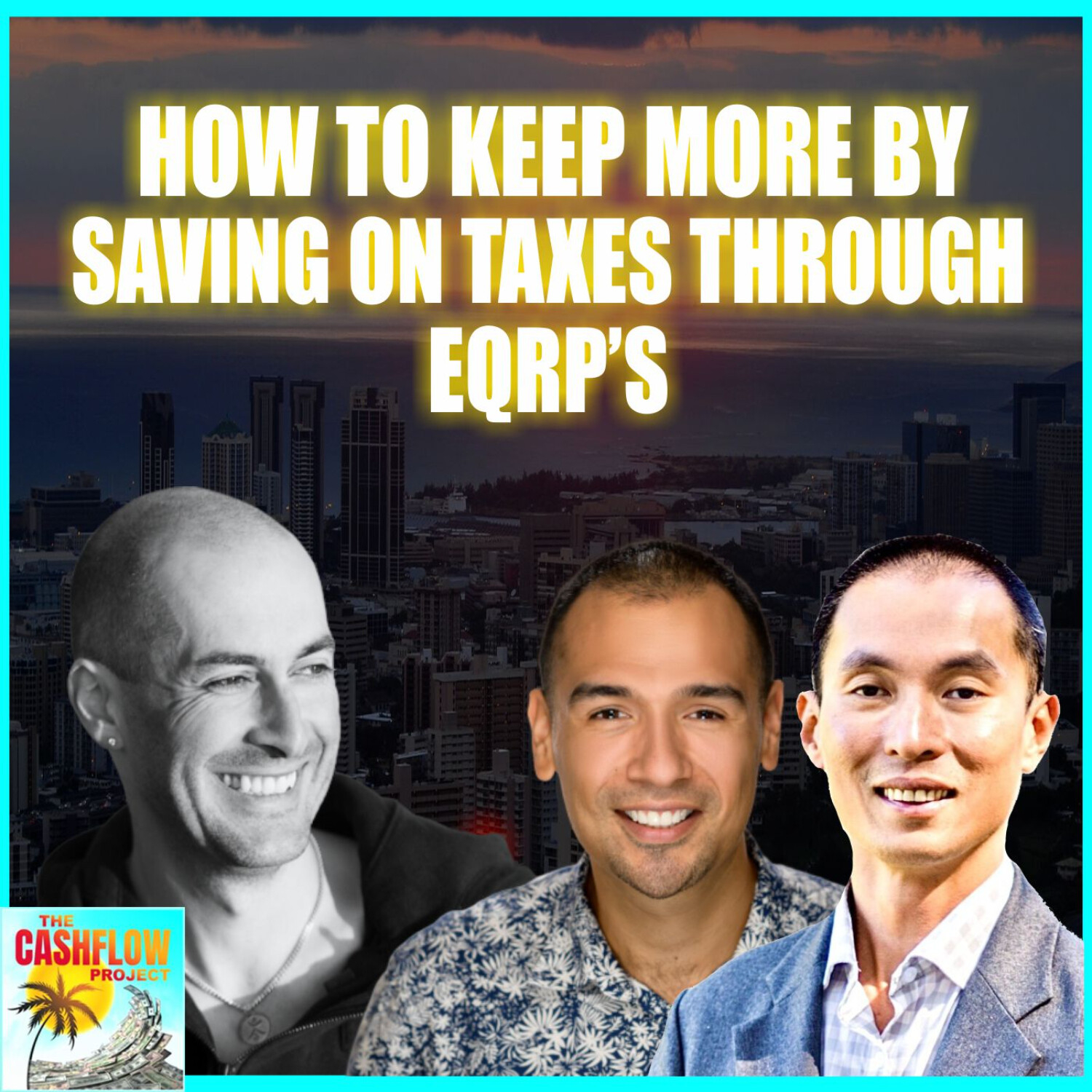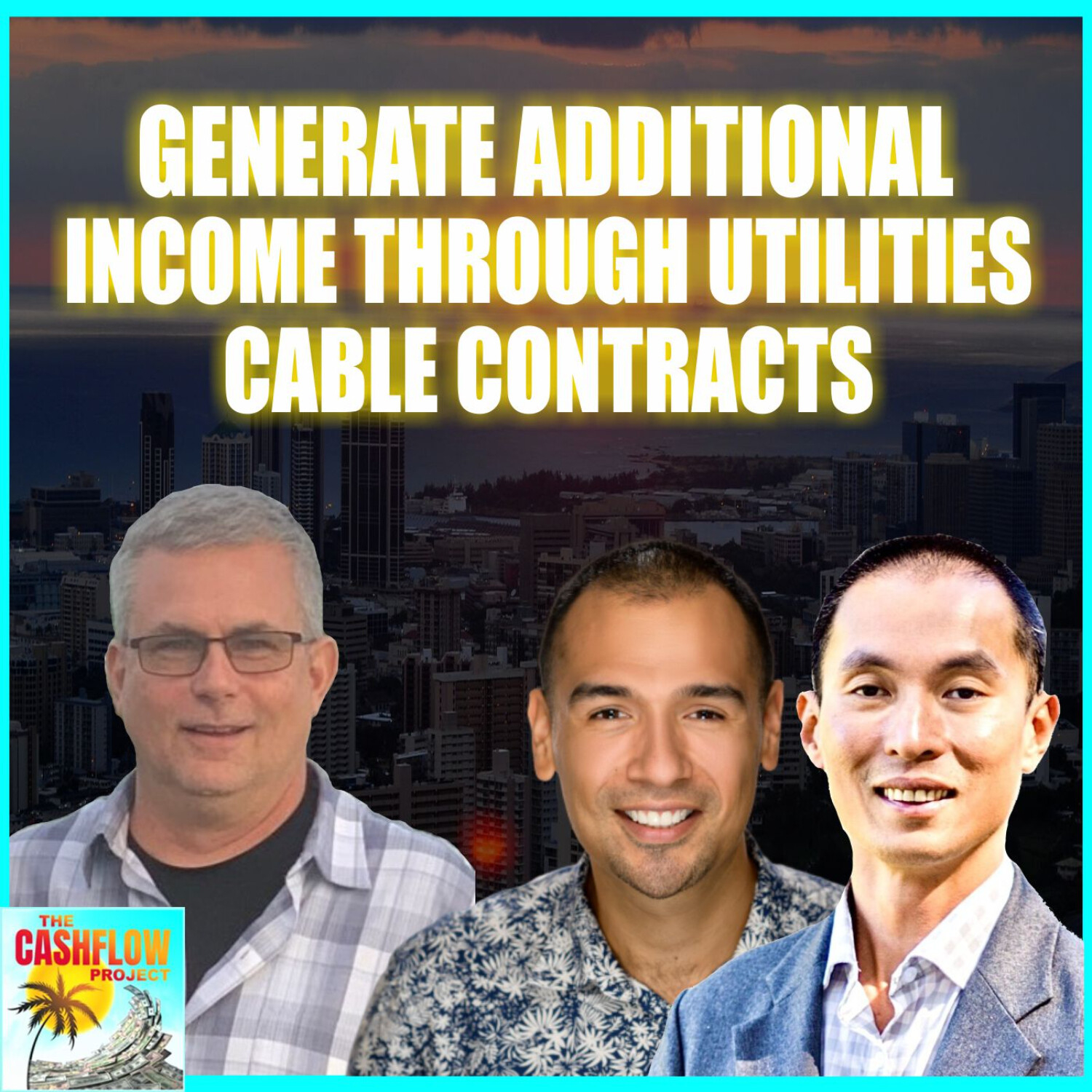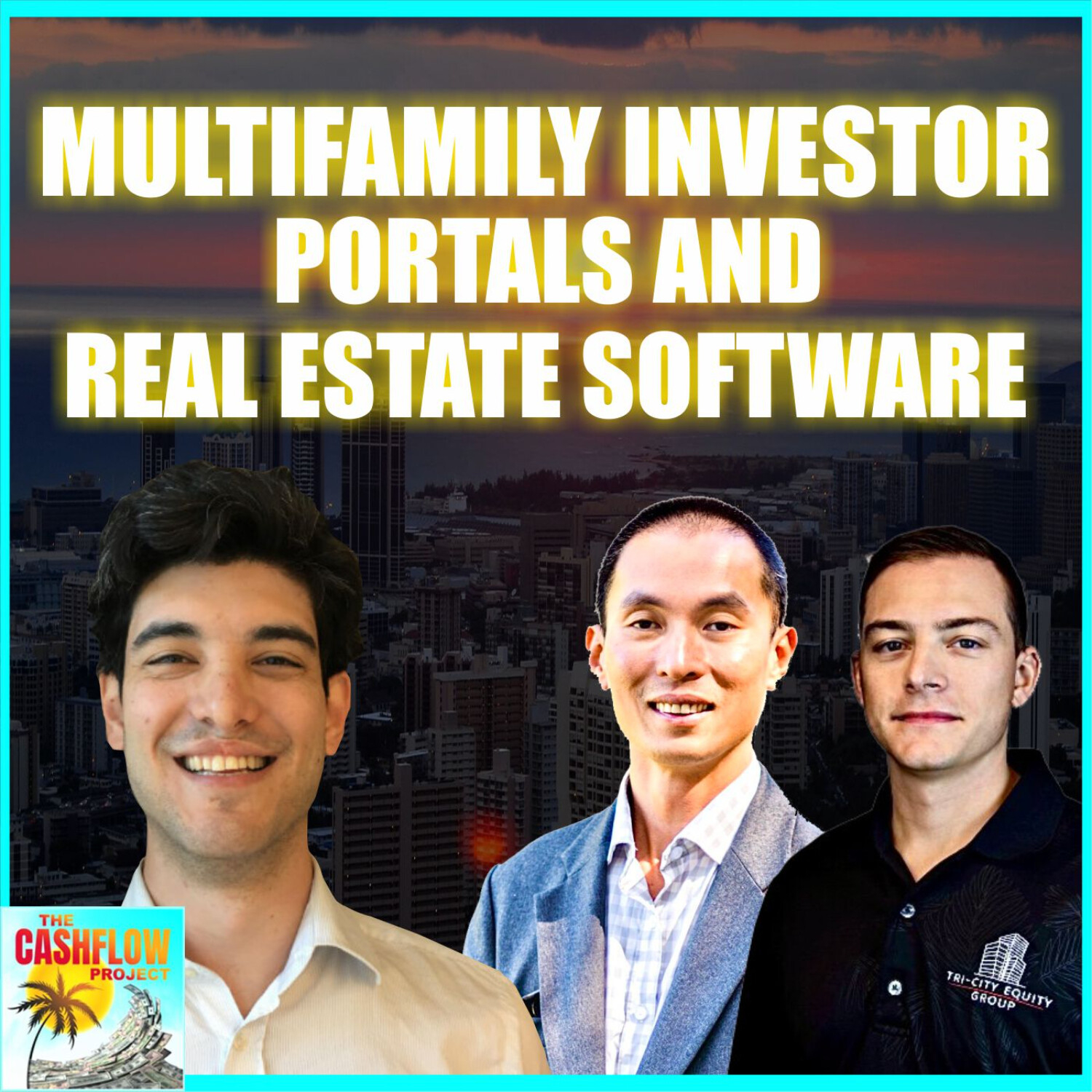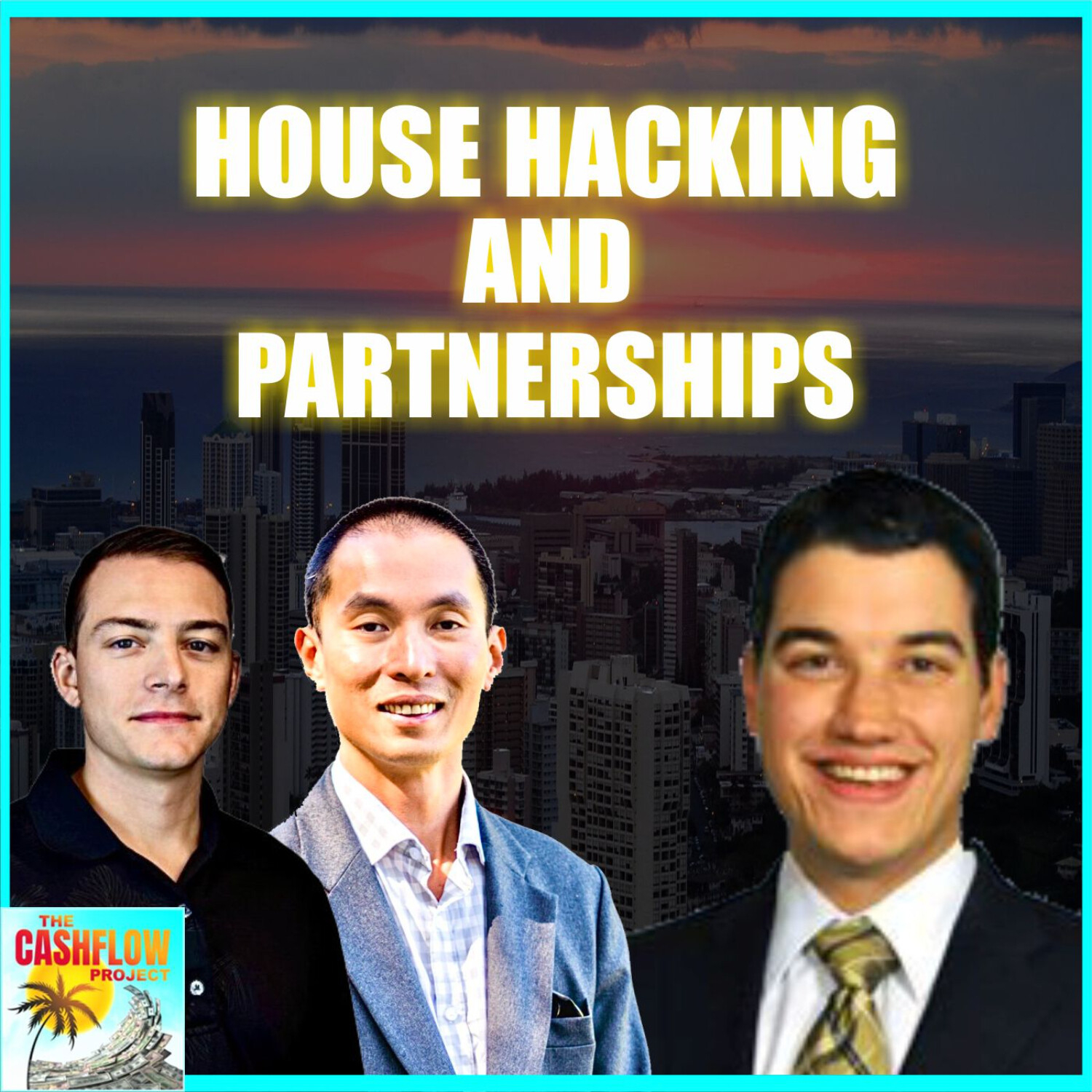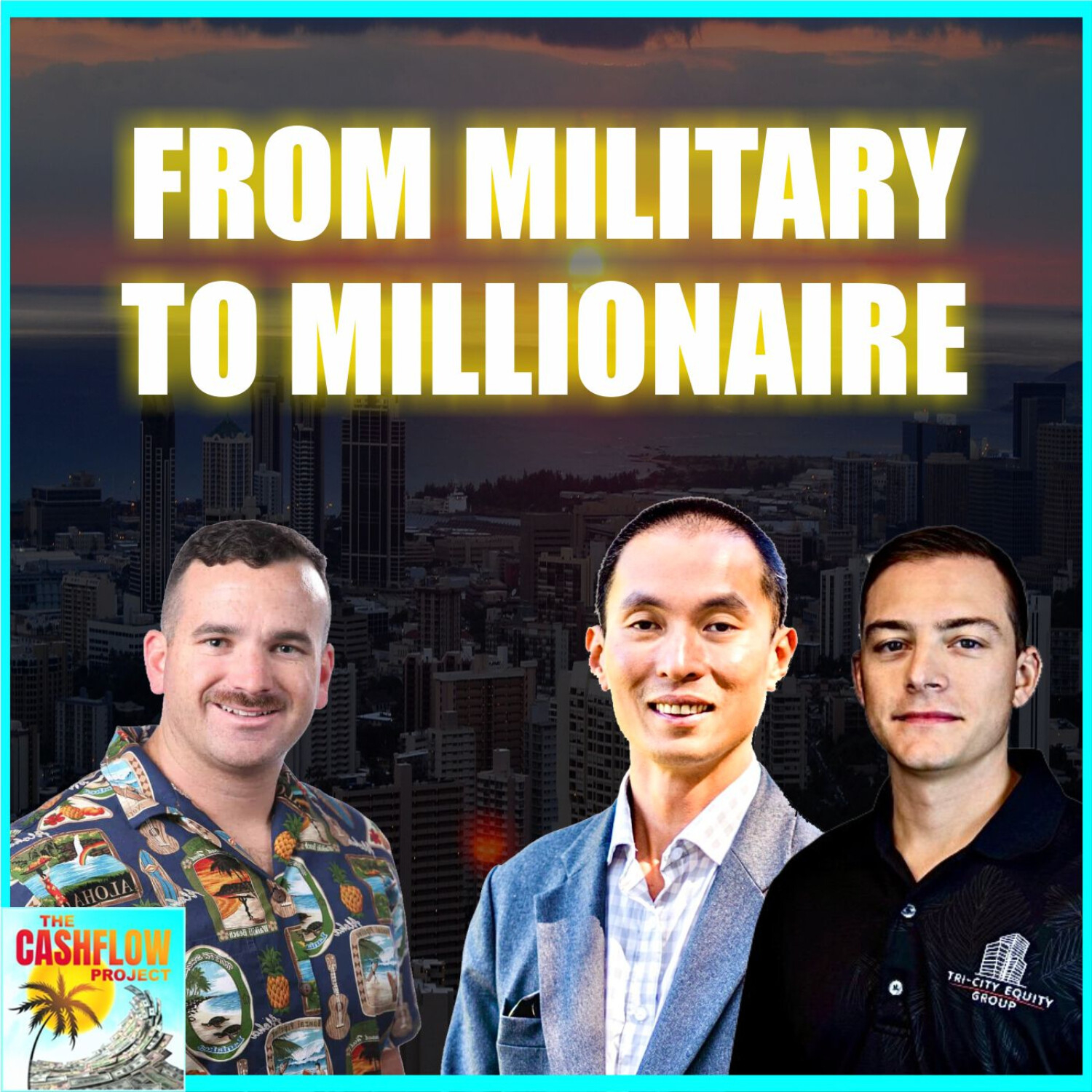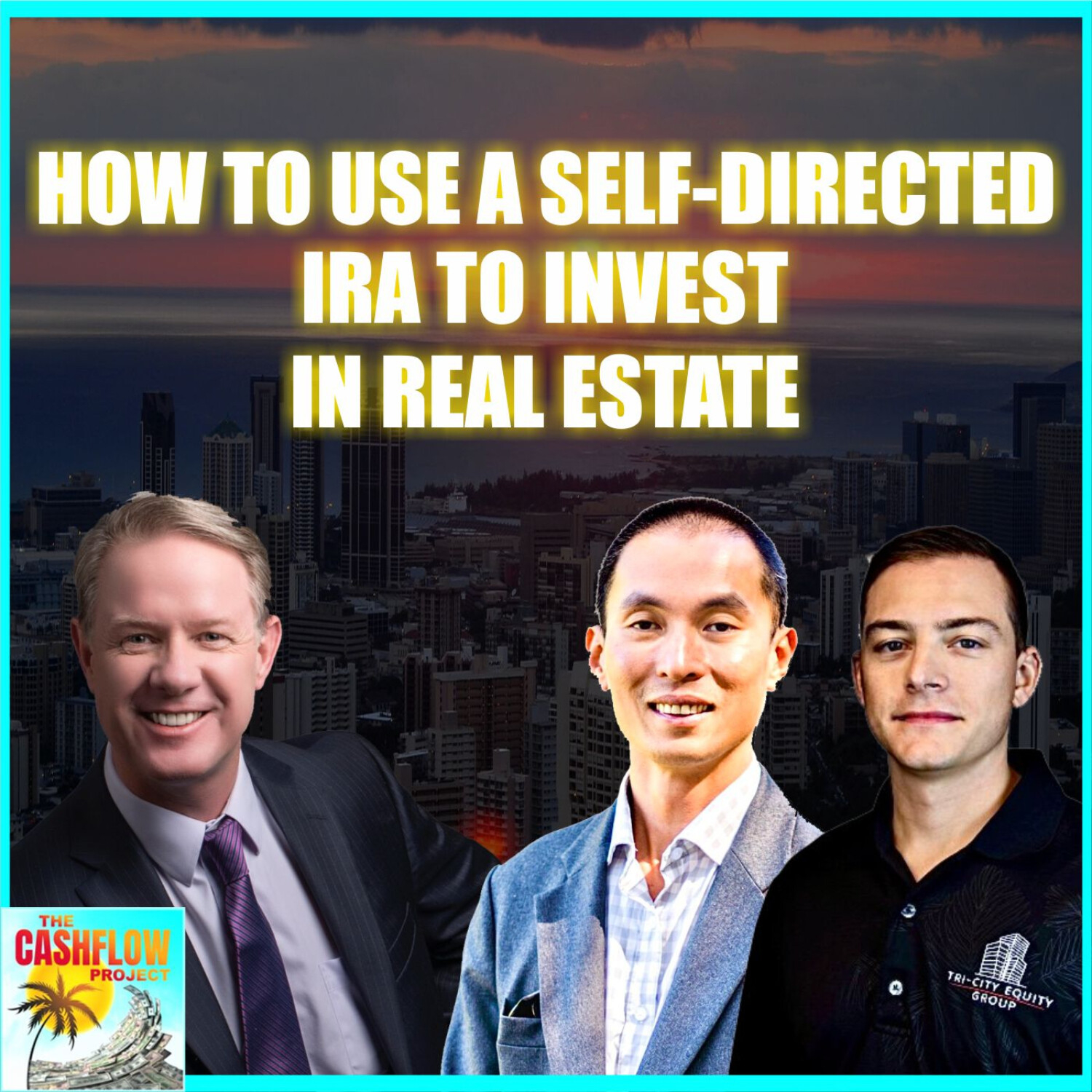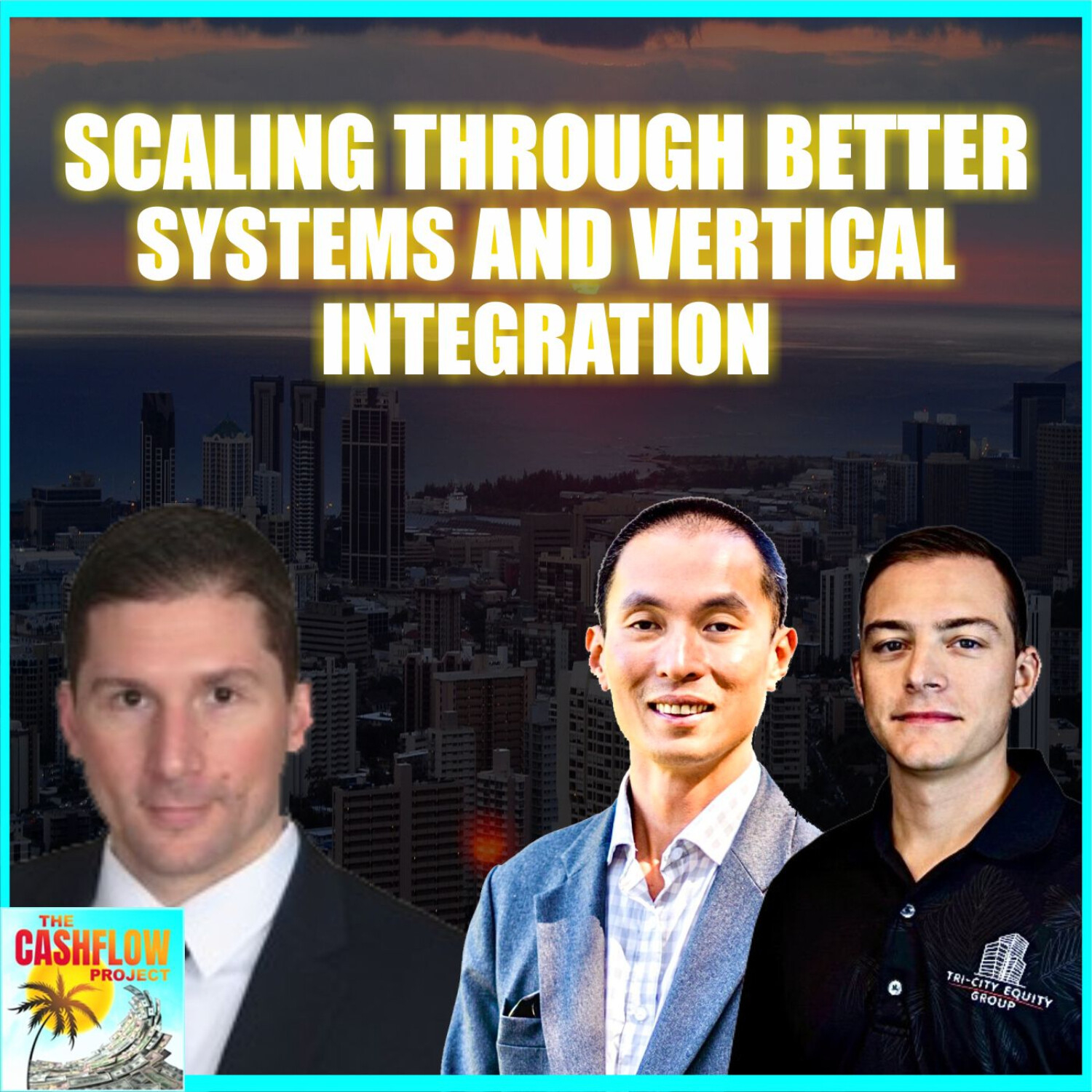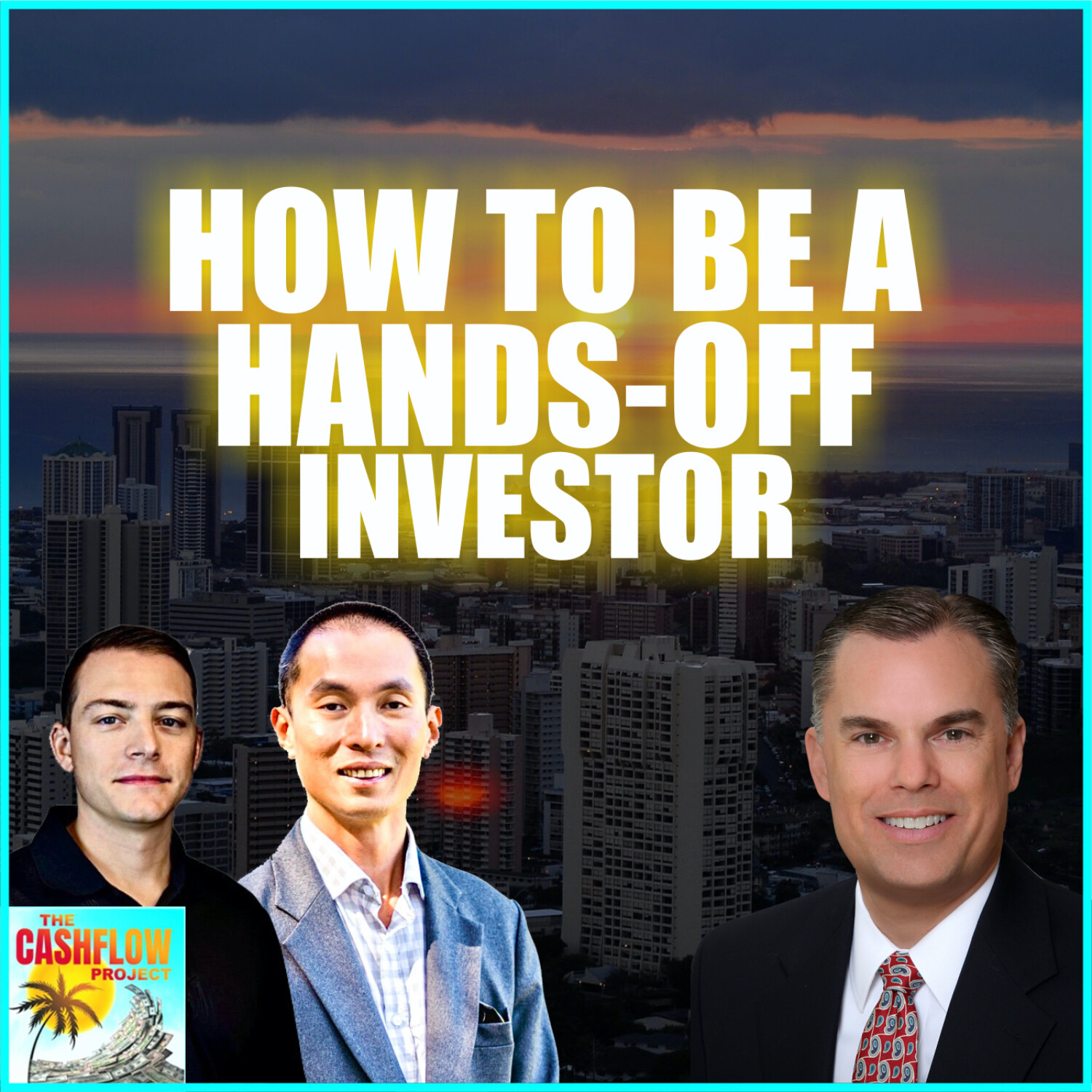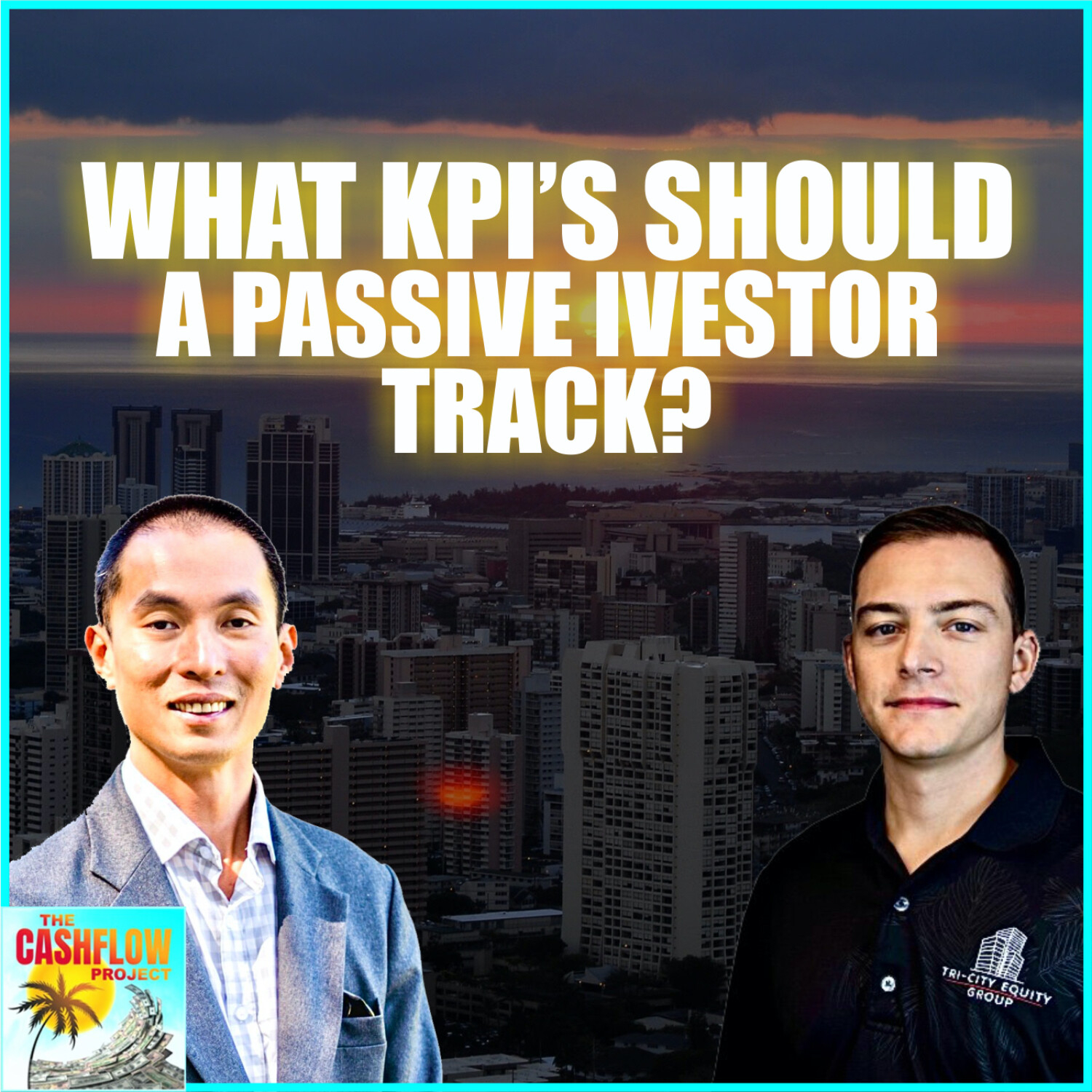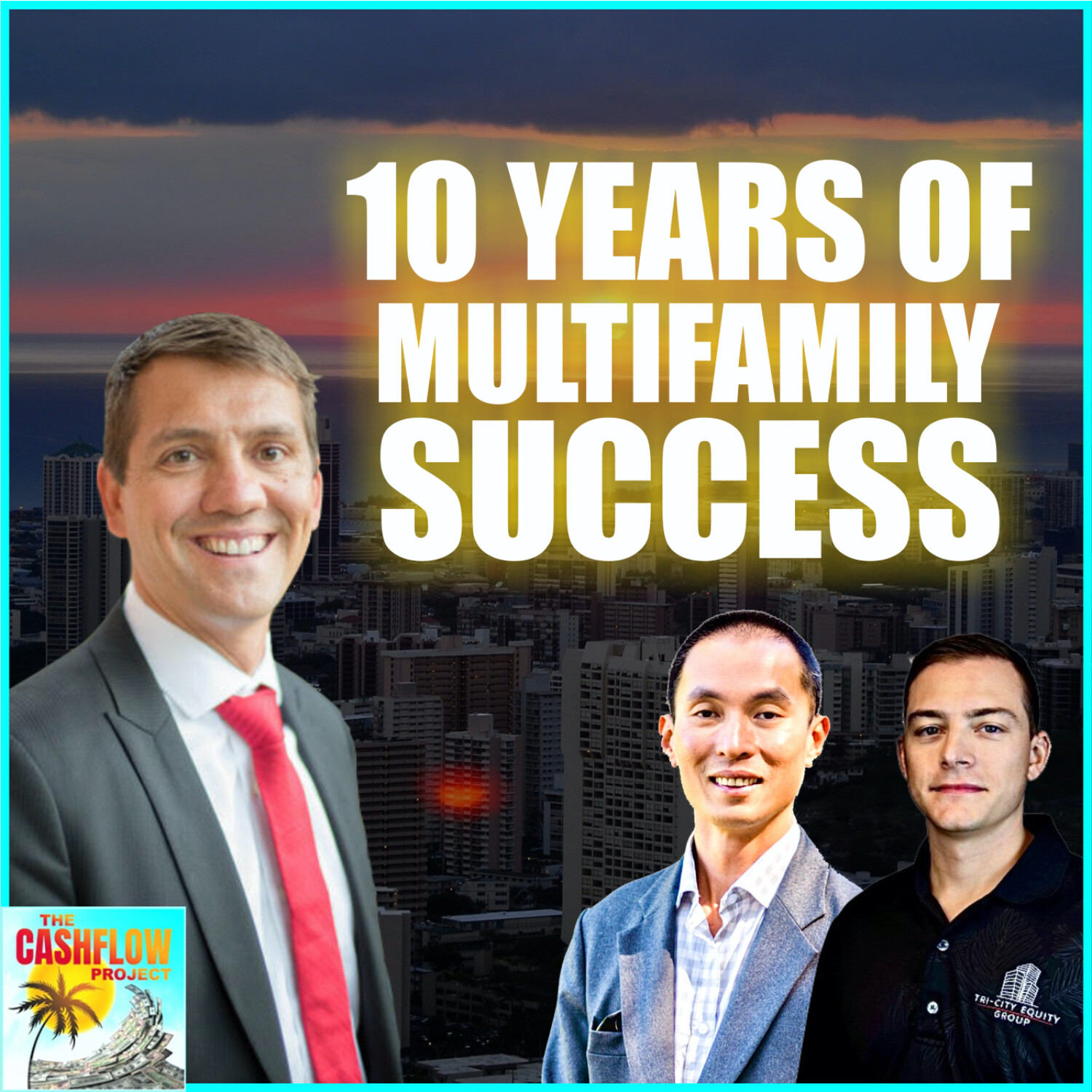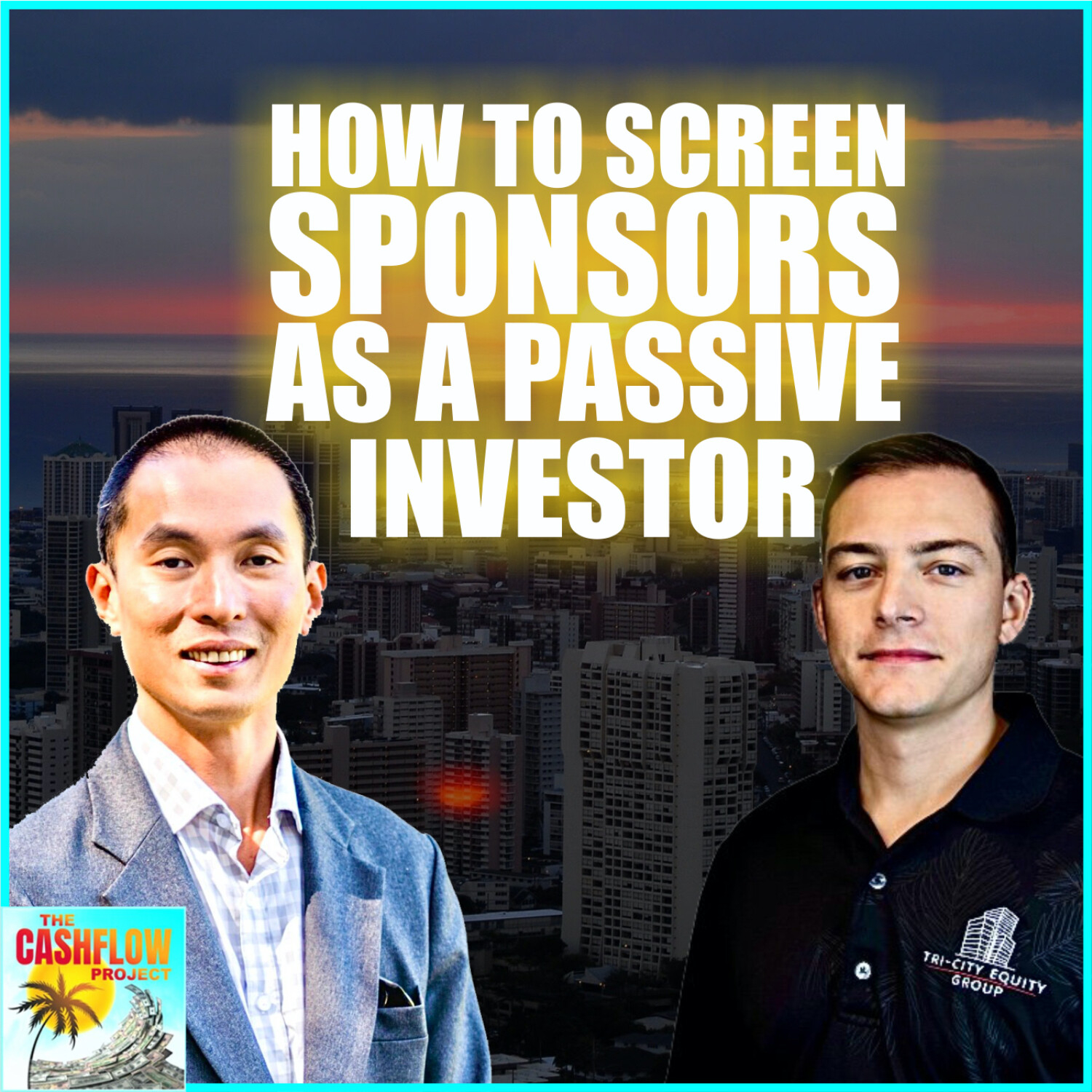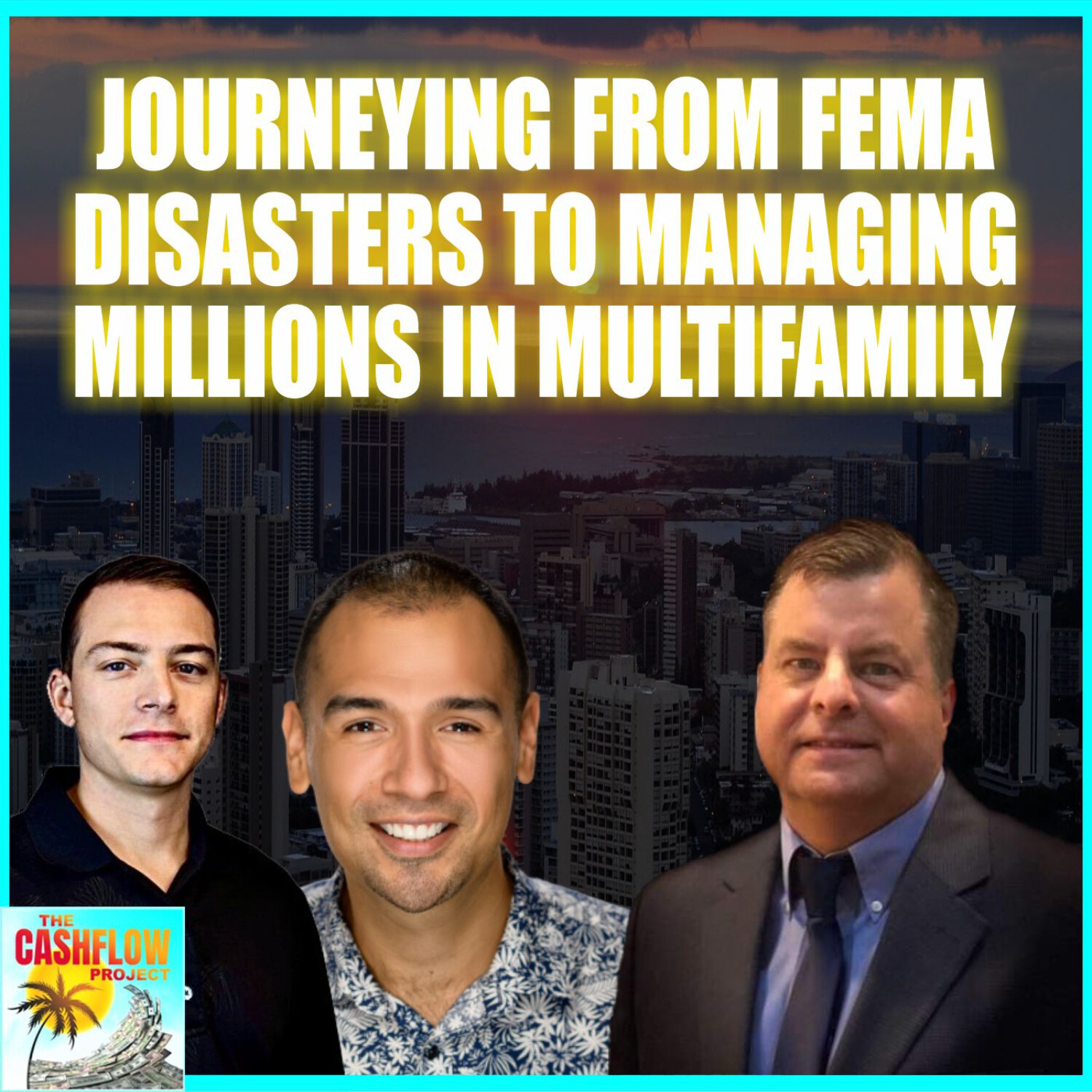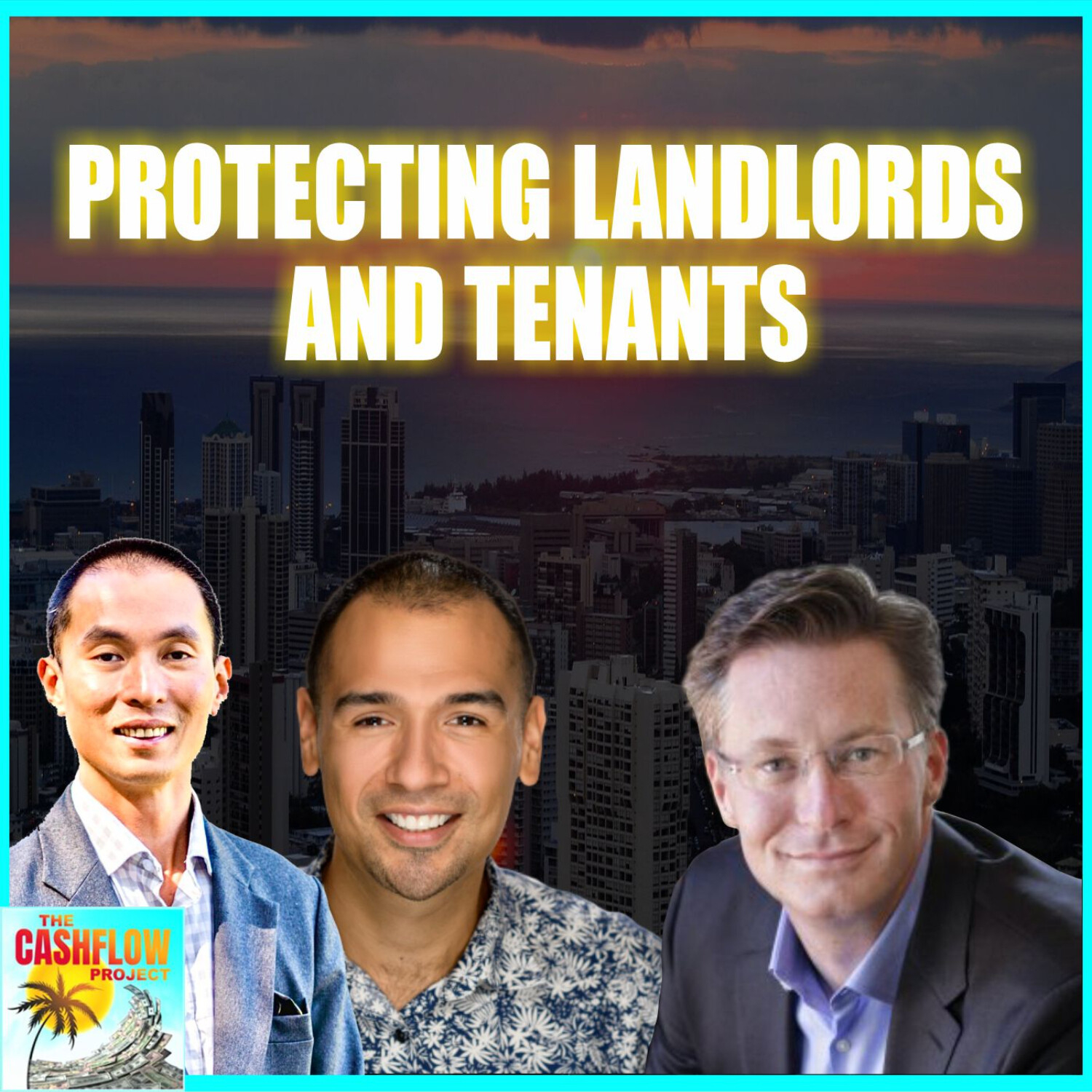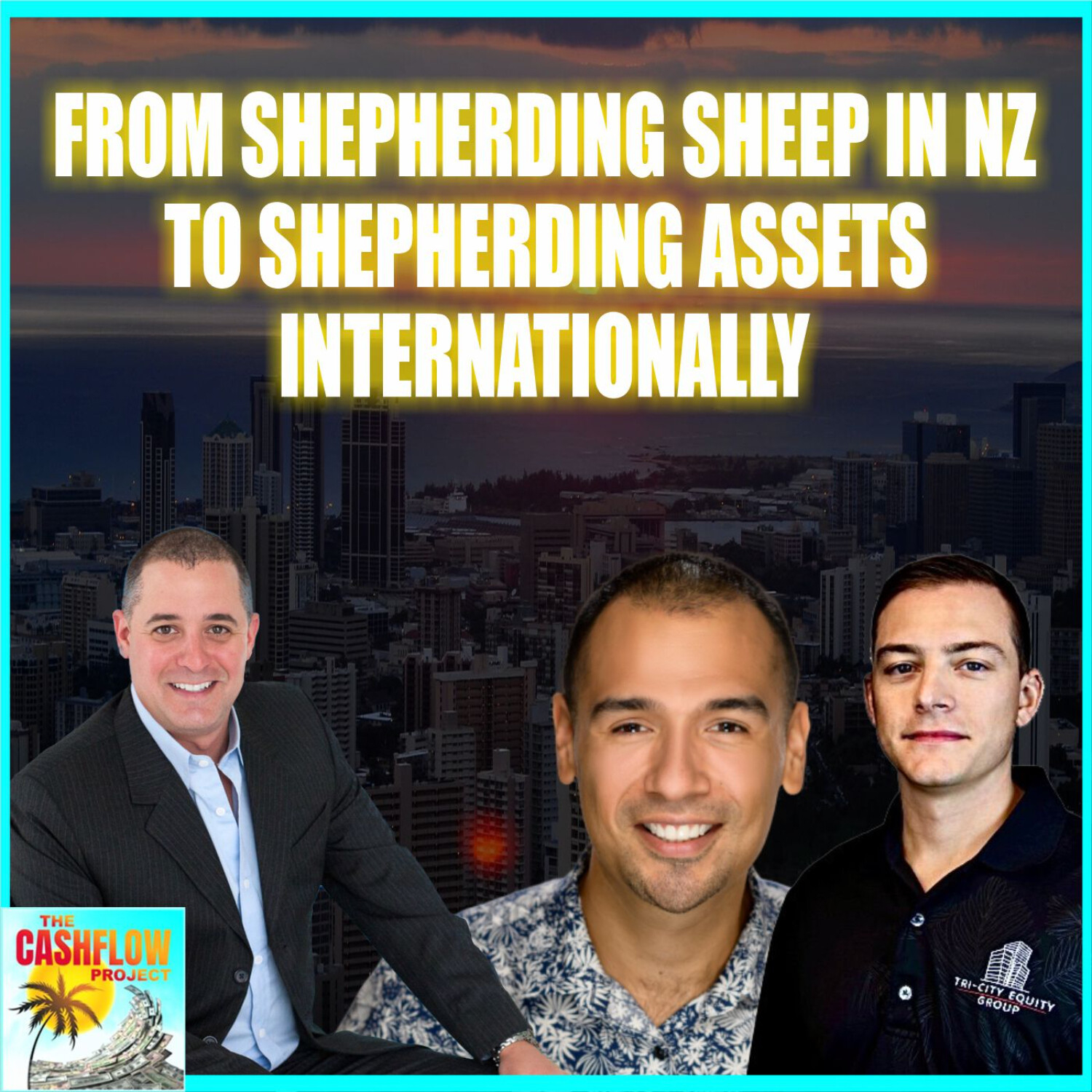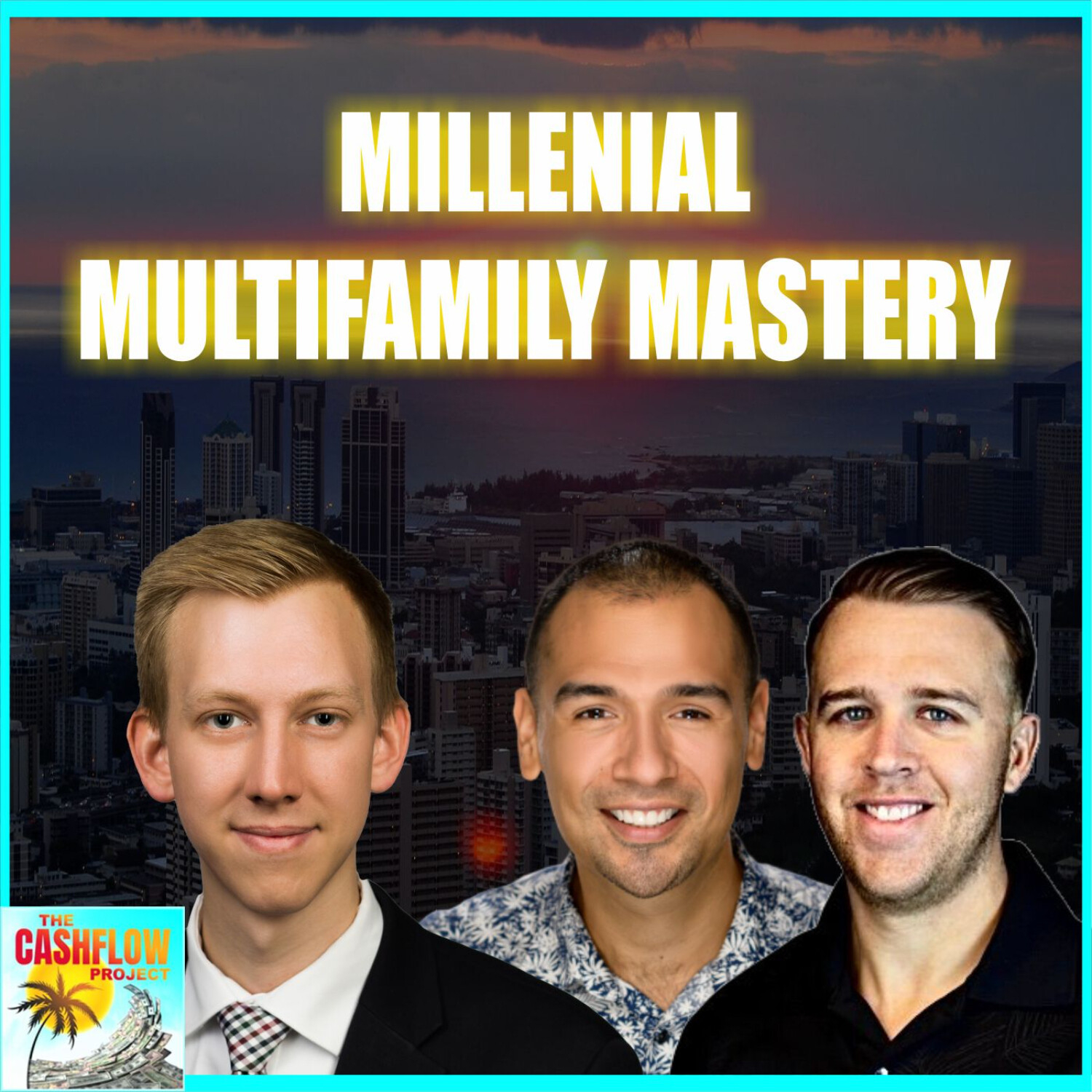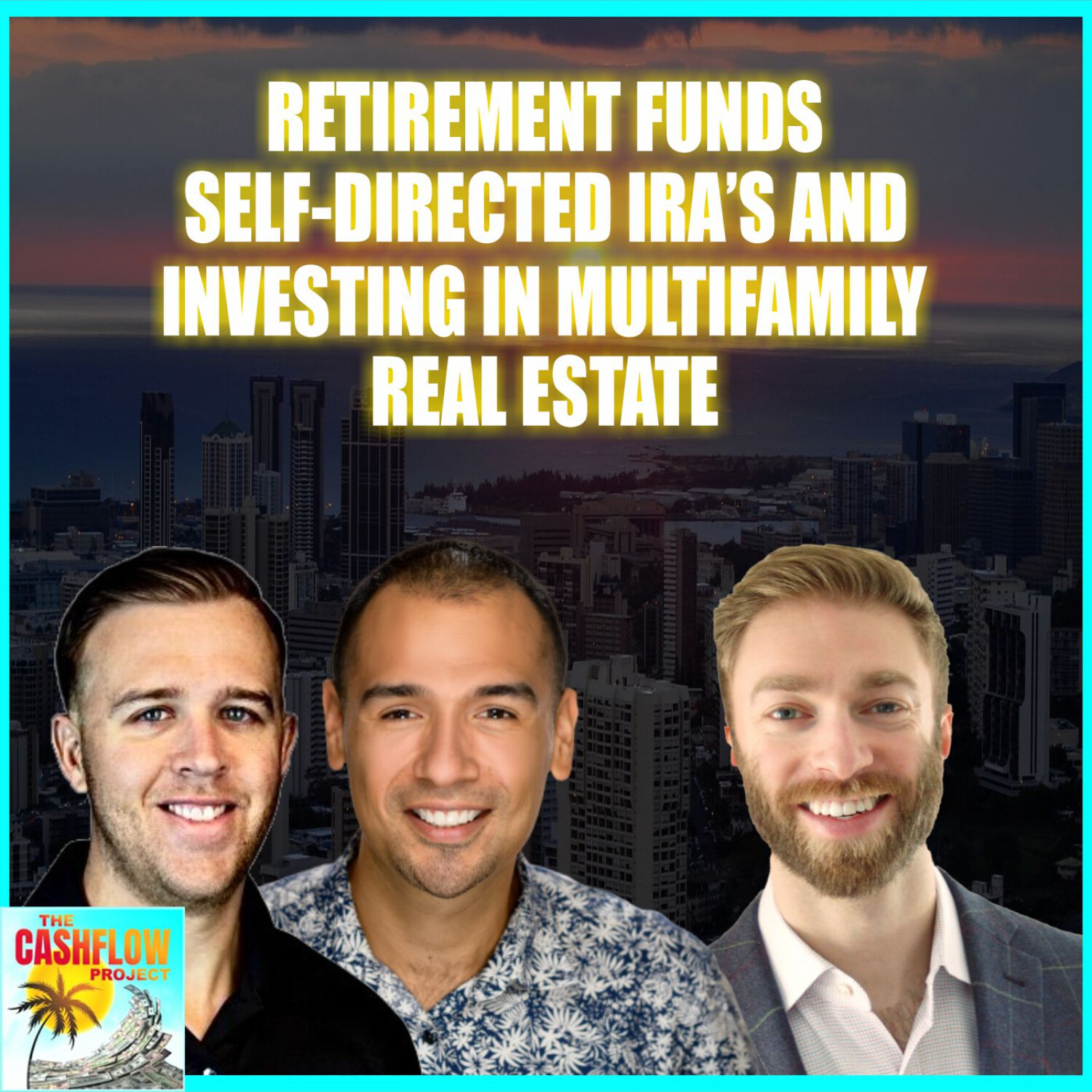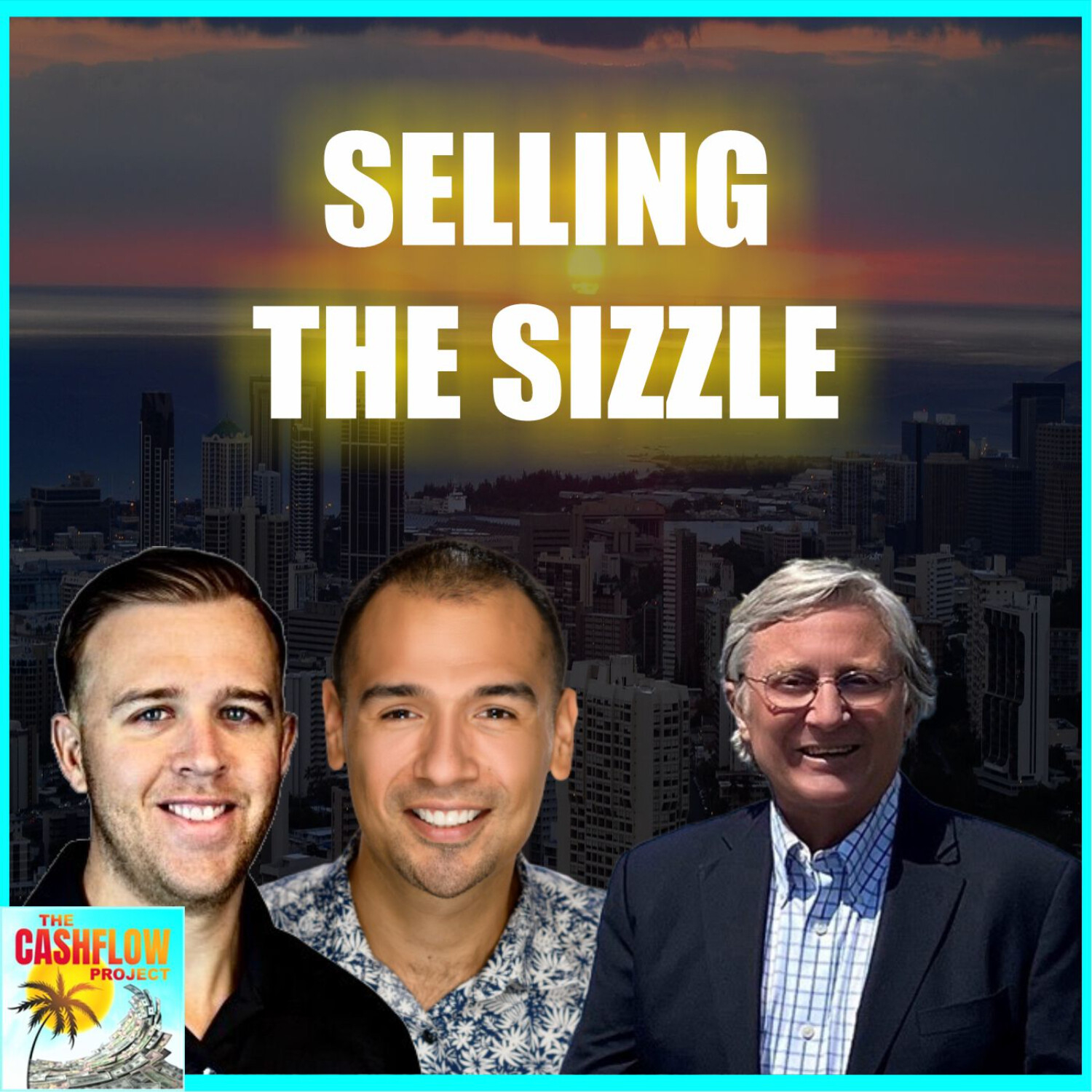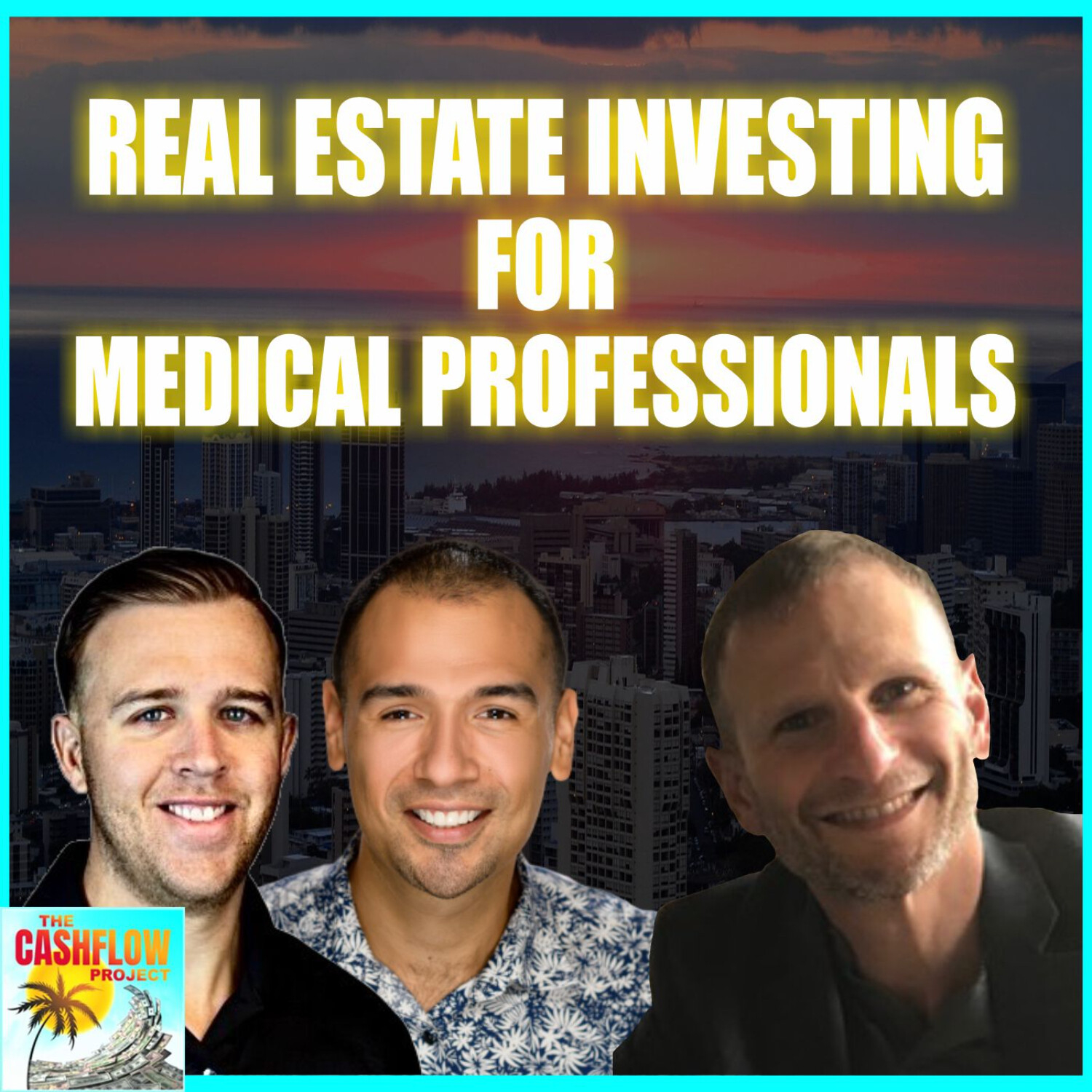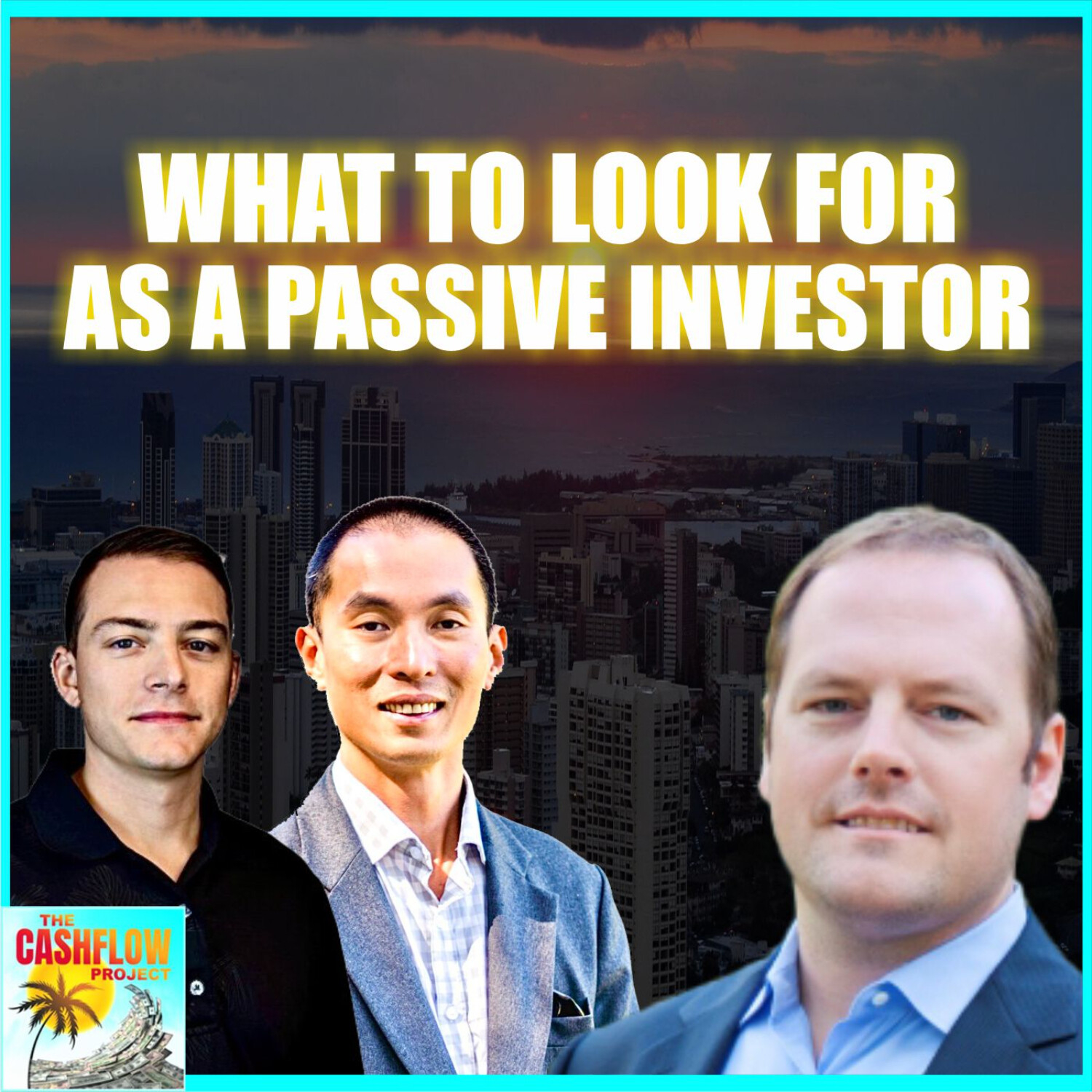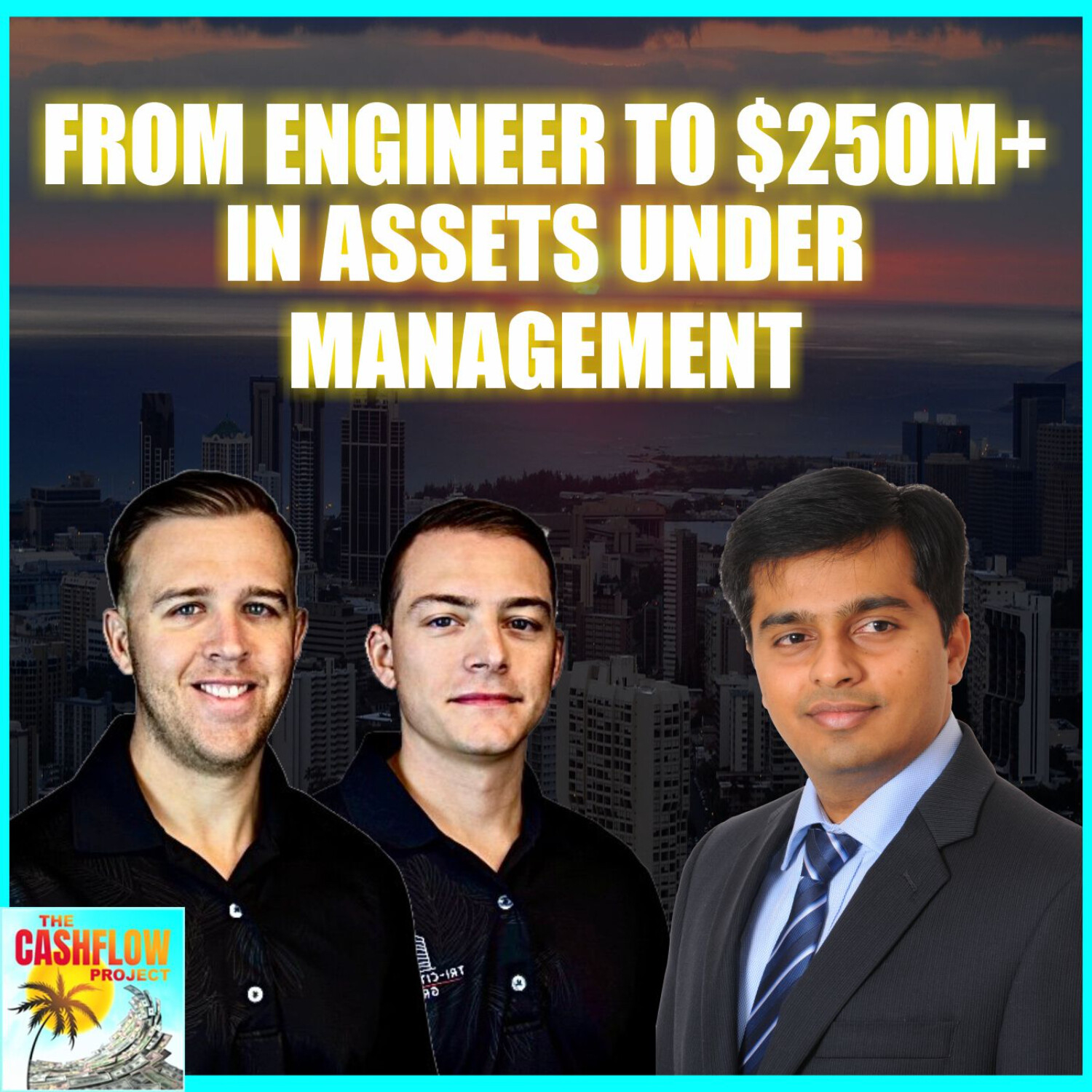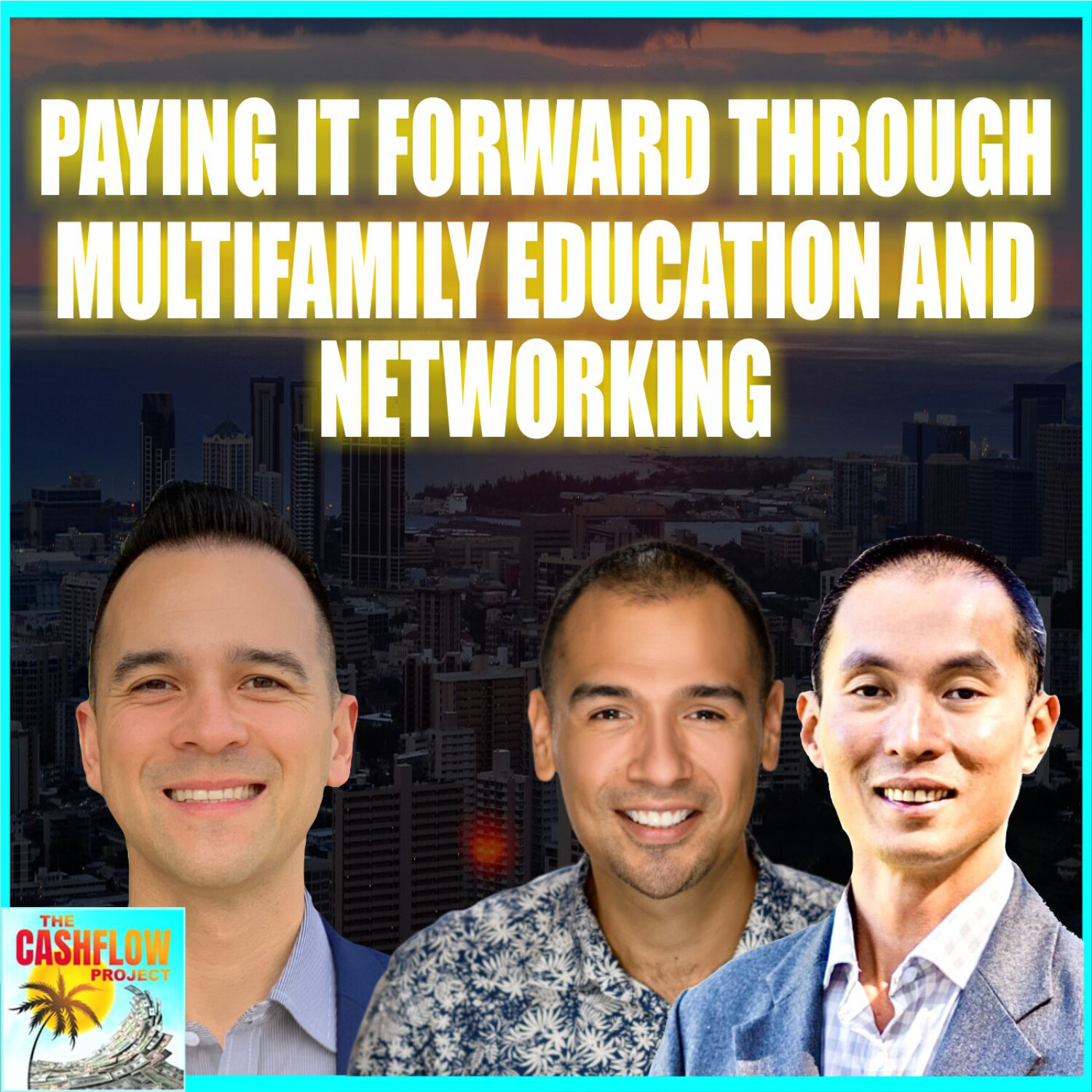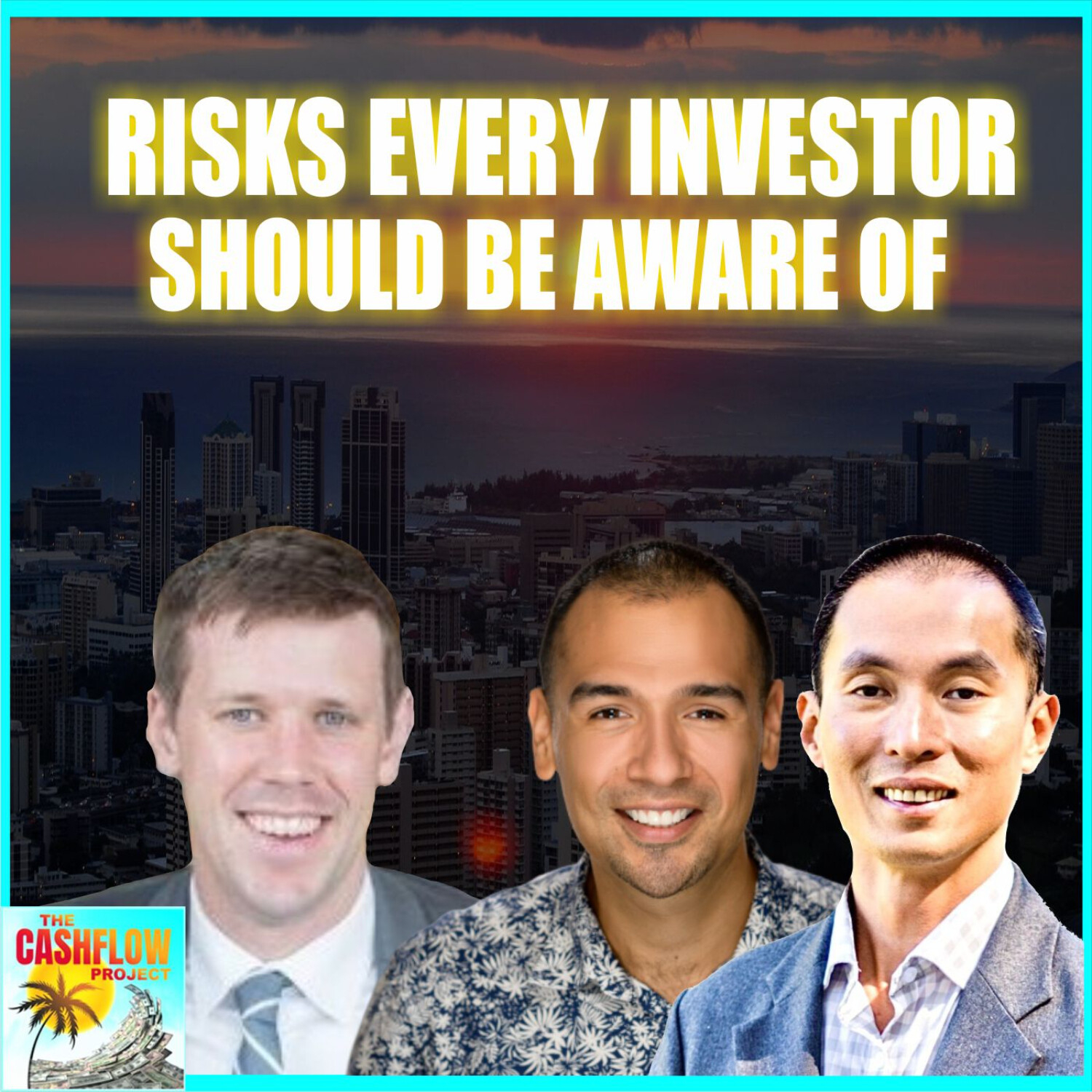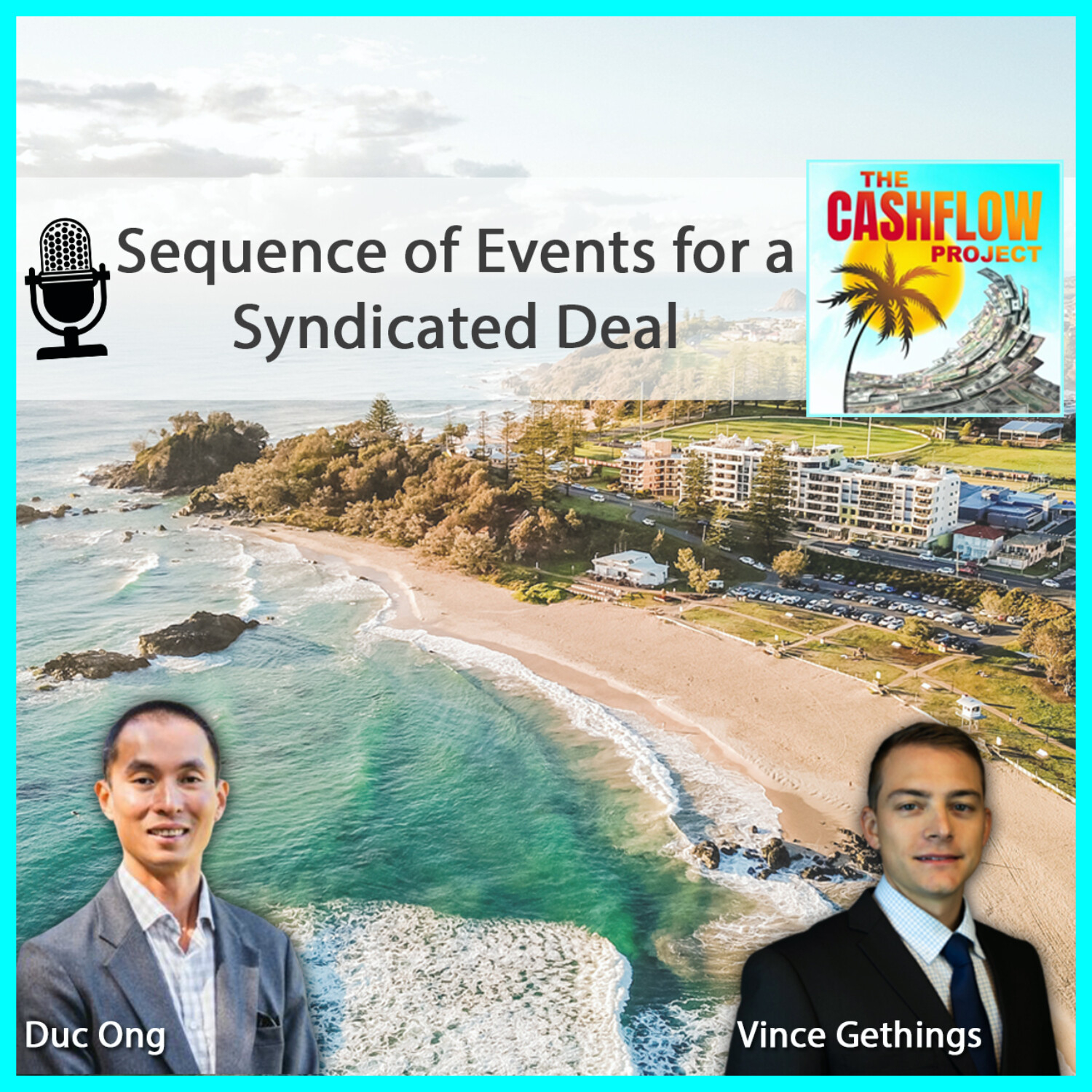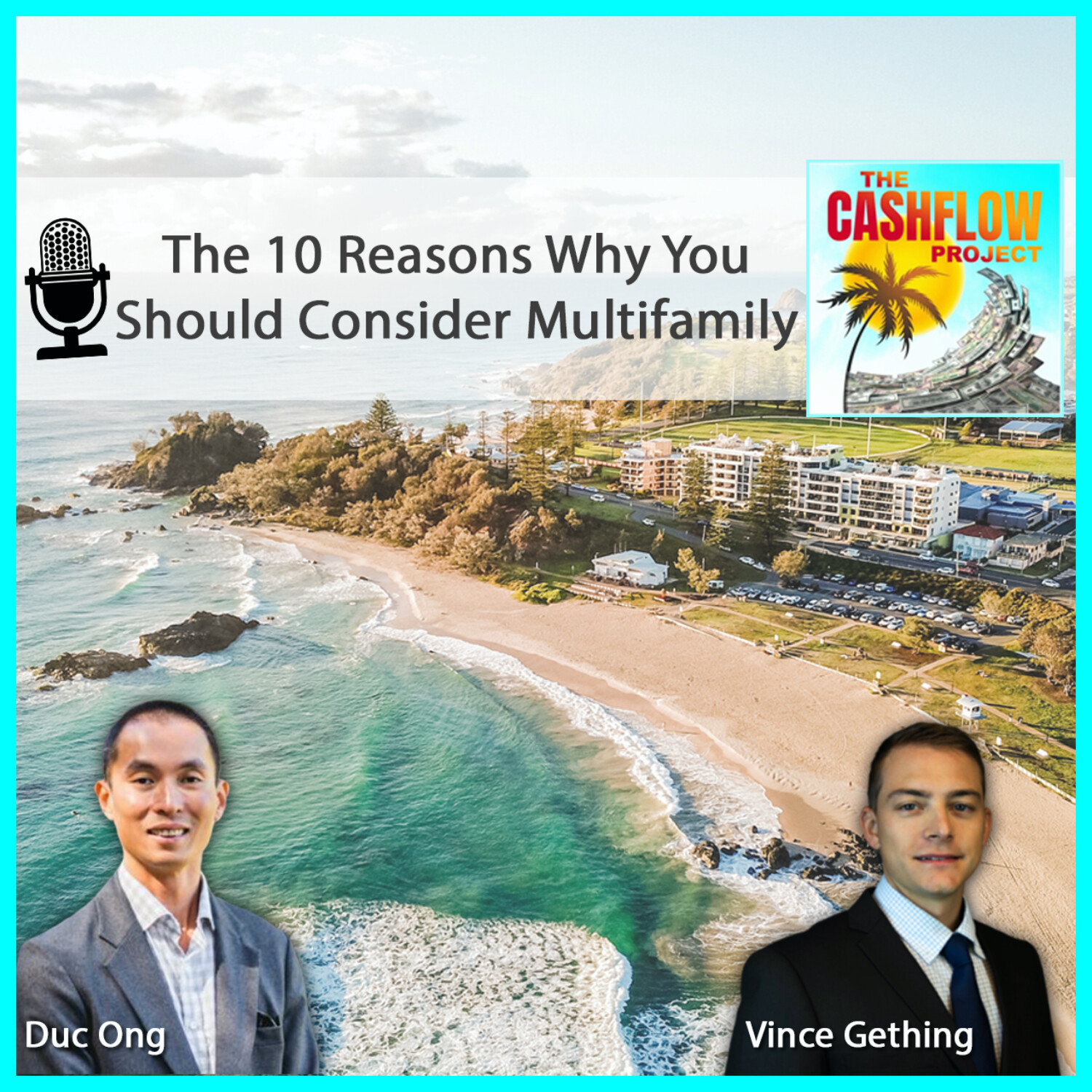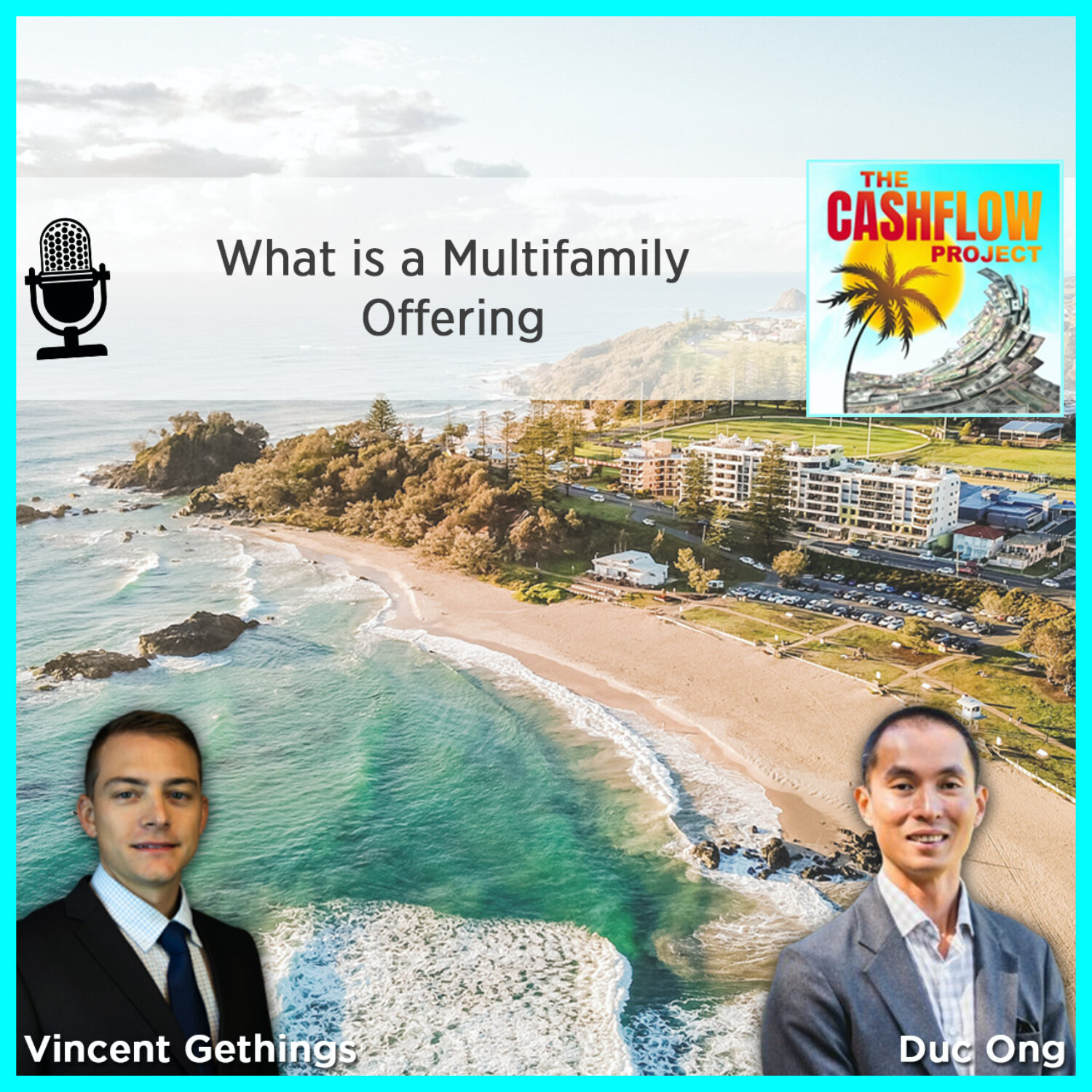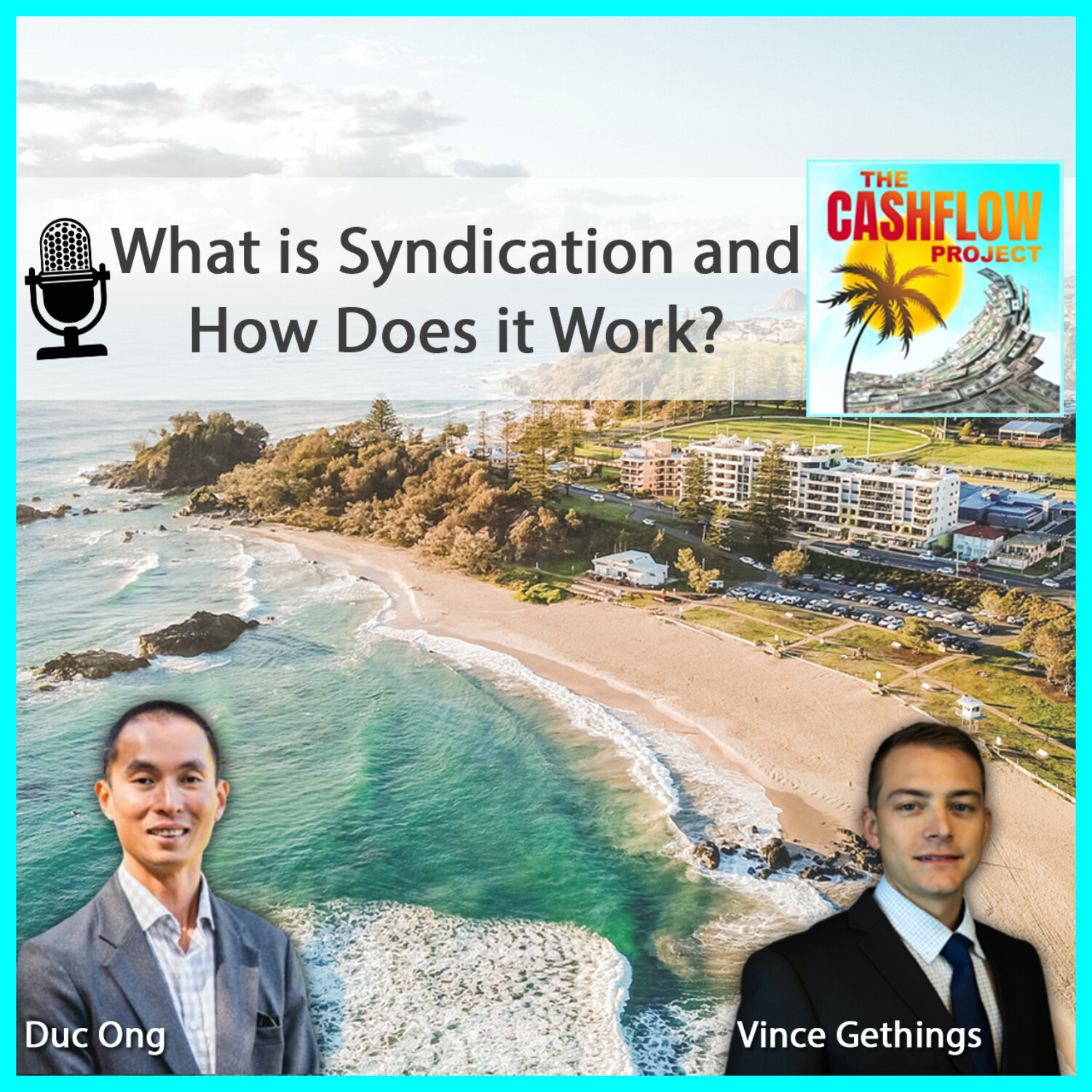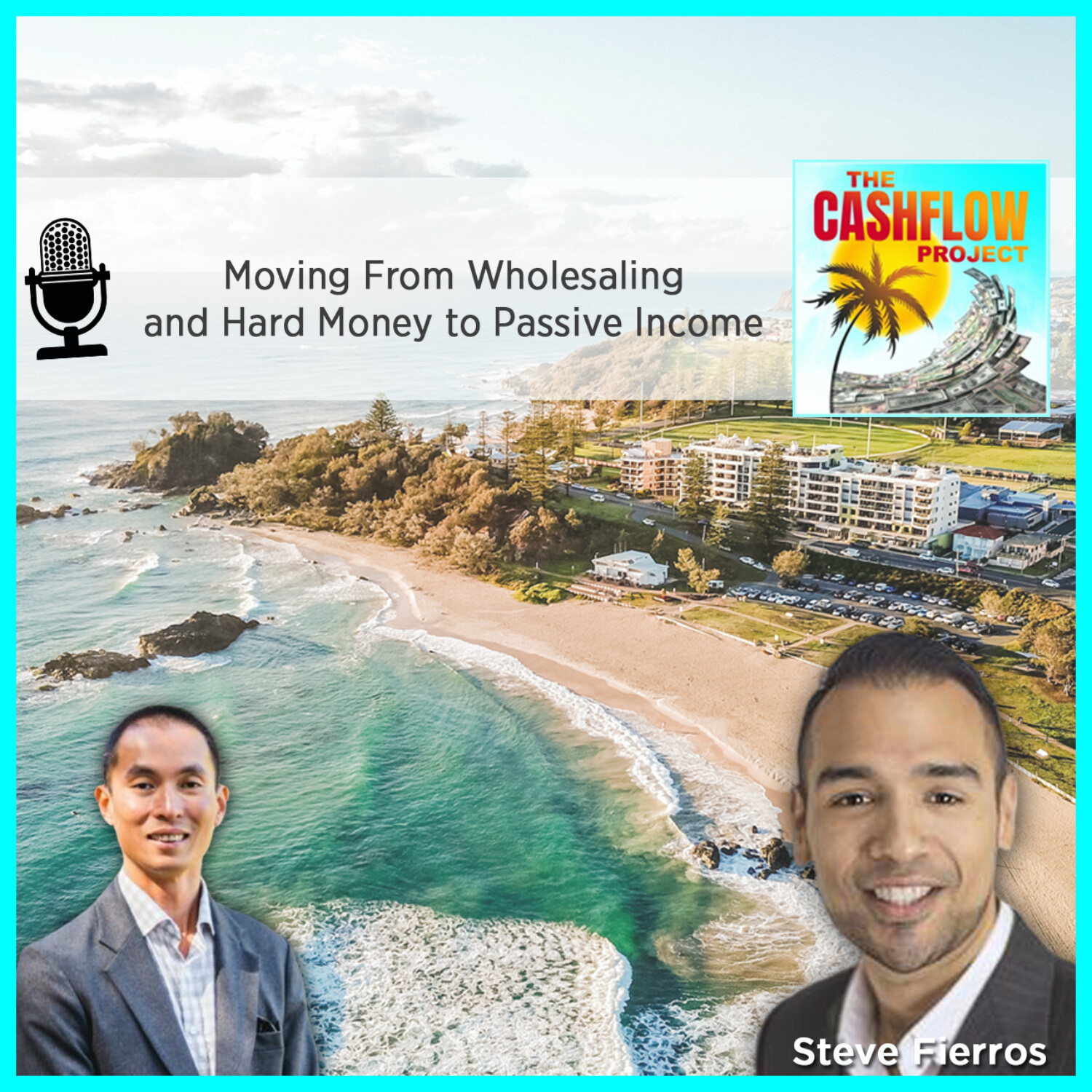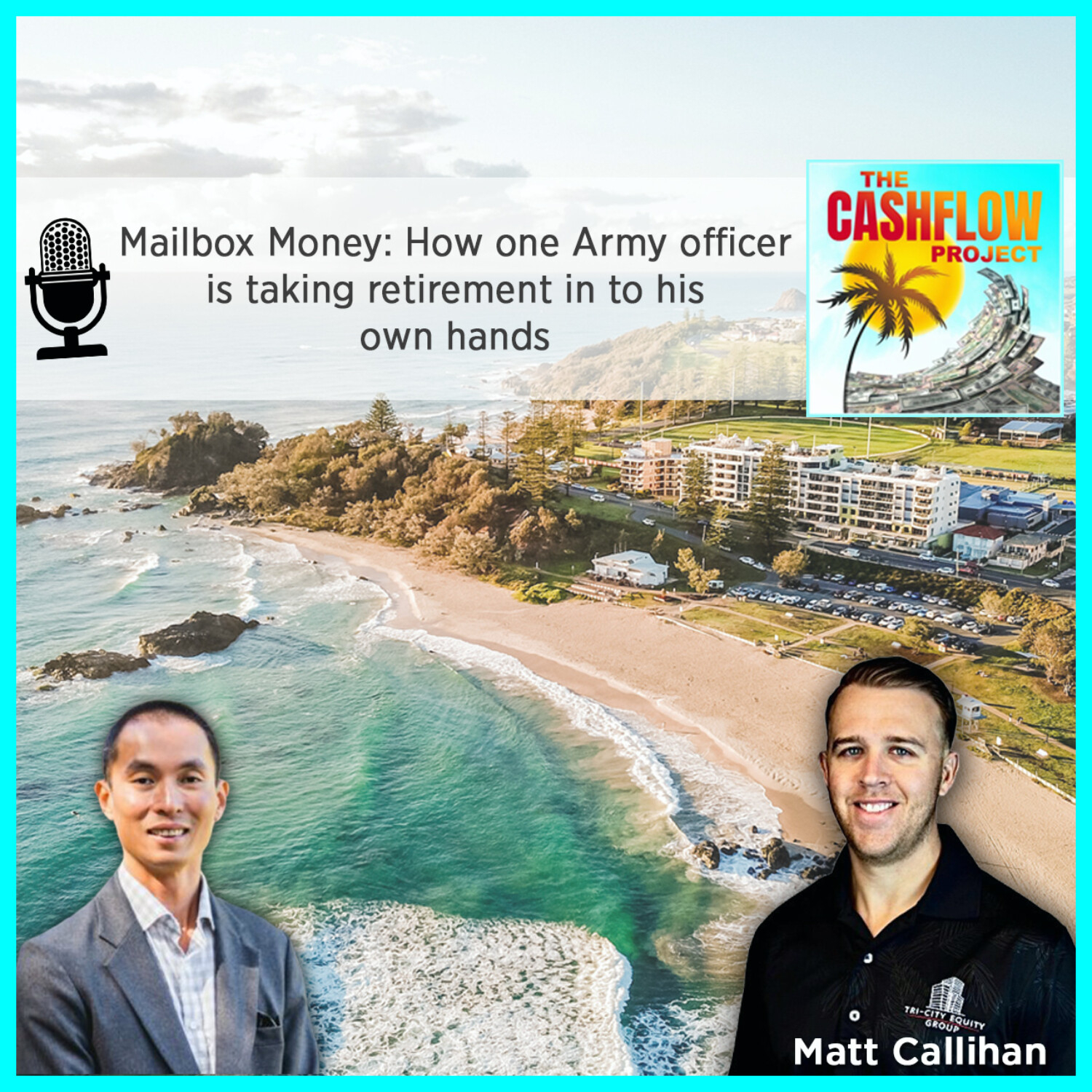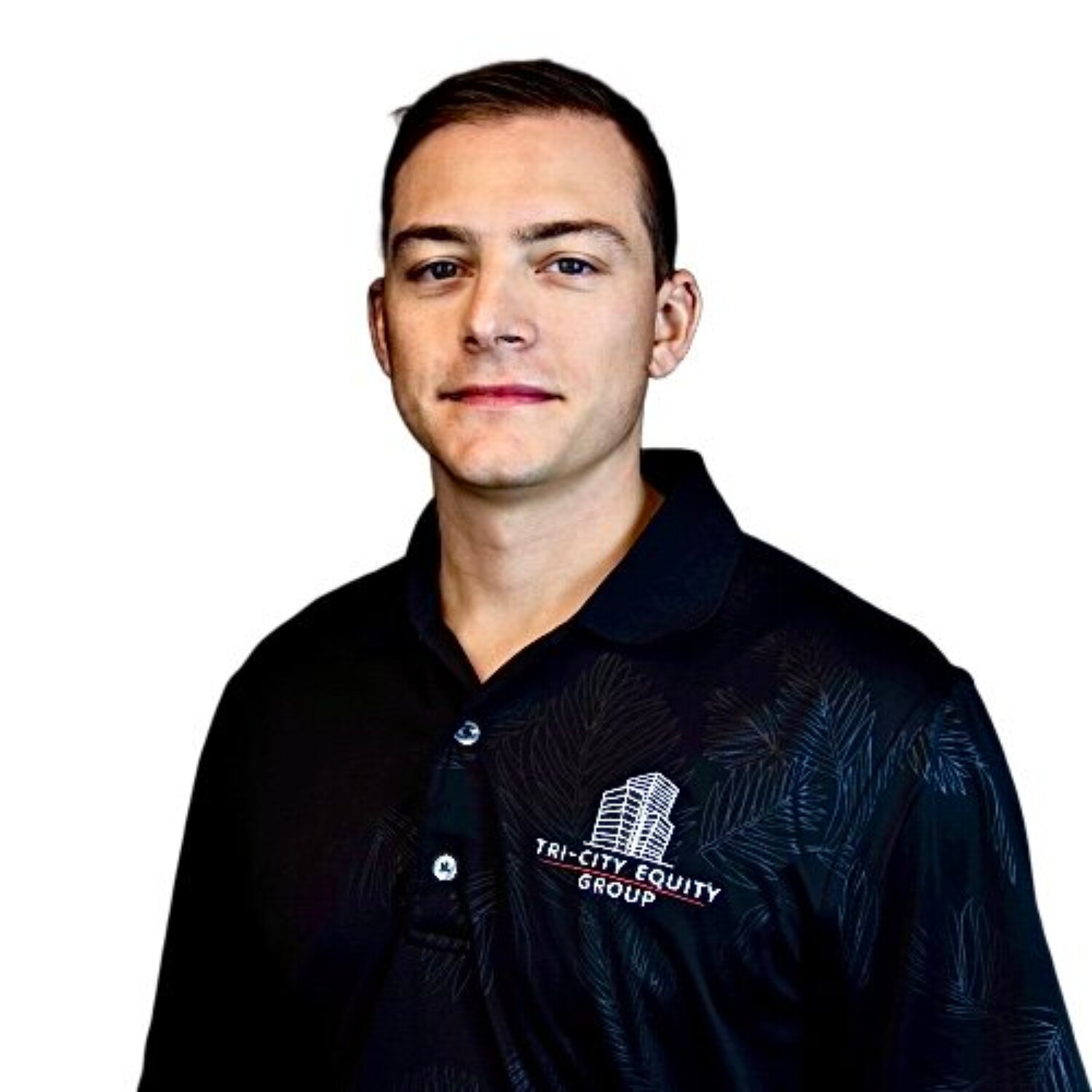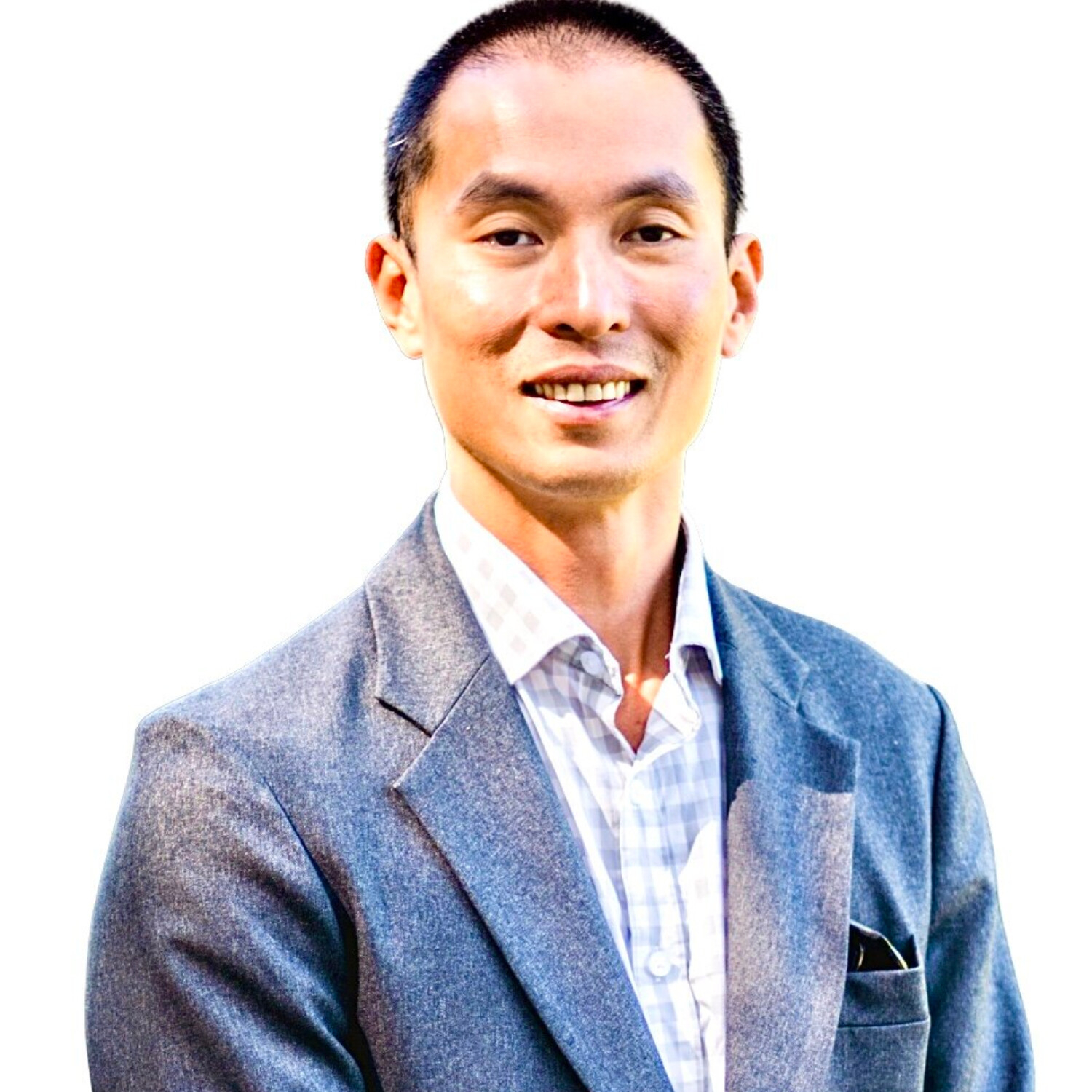The Cashflow Project
This is for busy professionals who are looking for financial freedom through passive income, with a focus on cashflow assets in Multifamily Real Estate. We will be covering a variety of topics such as buying, managing, and selling real estate assets, specifically apartments.
To learn more about us, visit tricityequity.com
Join me and my co-host, Steve, as we talk with Damion Lupo about eQRP® and why it’s the best investor tool for tax-deferred and tax-free investing. Damion has over 20 years of experience as a professional investor, having built and lost a $20 million business in single-family rentals to recreate that wealth again. He's a serial entrepreneur of over 50 companies and is most recently known for a retirement tool called the eQRP®. He’s going to share some great gems involving eQRP®, as well as his holistic approach to real estate investing. Stay tuned!
What is eQRP®?
eQRP® or Enhanced Qualified Retirement Plan is a checkbook retirement account for responsible entrepreneurial investors who would like to gain more control of their retirement money. It offers more access to assets usually not allowed in traditional IRAs such as buying real estate properties or even gold.
Almost all entrepreneurs can qualify for an eQRP®, whether it’s an online business, a consulting business, or if you’re a solopreneur or part of a partnership or corporation. Damion emphasized, though, that an eQRP® account is not for the reckless. It is ideal for people who can take total responsibility for their finances.
About Damion Lupo:
Born with an entrepreneurial spirit, Damion started his first business at age 11 (even hiring his parents for logistics support). Over the last quarter-century, he's started and owned more than 50 different companies, including an insurance agency, precious metals firms, a venture capital company, a coaching and consulting firm, and more than a dozen real estate investment and development companies. He’s also the founder of Yokido ™, his own martial art, and holds three other black belts.
He is a sought after financial consultant for high profile private clients. Using a vast depth and breadth of knowledge on financial markets, money psychology, and unconscious pattern motivation, he’s an expert at quickly assessing hidden financial cancers and holistically healing his clients and organizations through awareness, empowerment, and vision development.
Damion’s personal philosophy centers on Self Responsibility and a conviction that the only path to freedom is through candor, growth, and a big vision. That big vision ideal is what drove him to narrow the focus on the Retirement System and teach about the eQRP®, a tool to design retirement vs. get destroyed by it.
Outline of the Episode:
● [01:33] From a $20 million portfolio into a negative five $5 million net worth
● [03:31] The shift from a consumer mentality to a contributor mentality
● [05:27] What is eQRP®? Why is it considered the Ferrari of retirement accounts?
● [06:45] What's the difference between eQRP and self-directed IRAs?
● [09:23] The effect of the Cares Act to retirement accounts
● [11:14] What can or can't you invest in eQRP®?
● [12:24] Why should you use eQRP® instead of directly investing in the assets themselves?
● [14:16] Avoid self-dealing and choosing the cheapest route!
● [16:58] Being the best at one thing instead of being the best at everything
● [21:32] The 10X rule versus the 5X rule. How to push yourself without breaking?
● [23:15] Stepping away from conventional wisdom and falling in love with the work
● [26:32] How can you use eQRP® with a Roth account to not pay taxes for 50-70 years?
● [31:33] Damion's business book recommendation
● [32:48] Giving yourself the gift of stillness
● [33:36] A quick background about Yokido
Resources:
Join me and my co-host, Vince Gethings, as we chat with Alex Shandrovsky about deferring capital gains taxes with 1031 Exchanges. Alex is a Business Development Representative of the Zero Energy Solutions. Prior to that, he was the CEO and founder of Lchaim Foods, and a qualified intermediary (QI) for Madison 1031. He is very knowledgeable in a lot of different industries. In this episode, Alex generously shares his time in educating the listeners about 1031 Exchange, DST, capital gains, and more!
What is a 1031 Exchange?
The 1031 Exchange is named for Section 1031 of the U.S. International Revenue Service’s tax code. This section states that if an investor has made a profit from a real estate investment, the capital gains tax can be deferred if they purchase another property of the same kind with an equal or greater value at a limited time. The International Revenue Service limits the time to 45 days after selling the primary property. Within 45 days, you must already have a replacement property. If you fail to close on a property at the given time limit, you will have to pay capital gains tax. A qualified Intermediary plays an important part in this exchange because this person will be responsible for holding the 1031 Exchange funds. If you want to defer paying capital gains taxes and leverage your rental properties, 1031 Exchange would be a great strategy to achieve these. This may sound easy for other people, but it can cause you more money when it is not done correctly.
Delaware Statutory Trust
“As a backup, if your 1031 Exchange fails, maybe you couldn’t name a property in 45 days or what reason fails; you can put it in a DST.” - Alex Shandrovsky.
A Delaware Statutory Trust (DST) is a legal entity created under the Delaware law, mostly used in real estate investments, allowing multiple investors to work together in pooling money for investment purposes. DST is a great vehicle, which can potentially provide you a stream of income. Some investors do not want to be a part of a DST because of the restrictions and limited control they may have depending on their agreement with respect to the other trustees. This can typically be up to 499 investors, with a minimum of $25,000 investment requirement.
Outline of the episode:
• [00:34] What exactly is a 1030 exchange expert or a qualified intermediary (QI)?
• [01:29] He built a multi-million dollar business serving companies like Airbnb, Google, and Facebook.
• [02:12] Alex was the CEO and founder of Lchaim Foods, a large catering company.
• [04:45] In real estate, you're essentially creating assets for yourself where you're creating multiple streams of income.
• [06:22] Tax Code 1031, the ability to reinvest the proceeds into an exchange property and defer capital gains.
• [10:43] The challenges of bringing in a 1031 investor to multifamily syndication.
• [17:37] Syndicators need to give a structured statement to their CPA or QI. There are different levels of aggressiveness on how your strategy should be.
• [20:25] The crucial role of a Qualified Intermediary in dealing with a 1031 Exchange.
• [22:36] Is Delaware Statutory Trust (DST) a safe option or a good investment?
• [27:08] The powerful combination of using Podcasts and personal meetups as tools for digital marketing.
• [30:19] 1031 in a simple definition, what can and can it not be used for?
• [34:00] What are the questions you should ask when making a 1031 deal?
• [36:50] Let everyone know at least a year in advance if you’re planning on selling the property.
• [41:07] Using cost segregation on another building to offset a capital gains tax. Give yourself as many options as possible.
• [45:39] Make sure to pick the right partners and qualified people to work with,
• [50:33] The best books for Alex that he recommended are: Getting the Love You Want, and Never Split the Difference
• [52:28] When is Alex’s book coming out? What are his side hustle projects?
Join me and my co-host, Vince, as we chat with Kyle Jones about how he transitioned from starting out in the single-family space to multifamily real estate. Kyle is the co-founder of TruePoint Capital and the American Grid Company.
50% to 100% Occupancy Rate
Kyle had an experience with a 56 unit deal where he had to take the occupancy rate down to 50% within the first three months of owning the property. There were a lot of residents at that time that was refusing to pay. The property manager had to remove the bad tenants. With the vacant units, they were struggling to lease them back up. Then, Kyle decided to renovate when the occupancy rate was low. And by month nine, they were able to bring it back to 100% occupied. An excellent performance and achievement by Kyle because he was able to accomplish that in less than a year! This experience shows that he has great leading and management skills.
Staying Connected With Your Property Managers during COVID-19
Human connection has significantly decreased over the past few months. A lot of people are struggling because of the massive changes in how we normally do things. This has impacted almost everybody’s mental health. That is why it is necessary to keep everybody engaged in the business, especially now because of the COVID-19. Staying connected with your property managers will be one of the driving forces that will help your business survive the pandemic, through conducting weekly calls, chats, and meetings. By doing these, you’ll be able to check up and be updated with their current situations. Keeping them aligned and headed towards the same goal or direction, thus holding the property managers accountable for their roles and responsibilities. Furthermore, your small acts of checking up on how they are handling this pandemic will help alleviate their stress, even just a little.
Outline of the episode:
· [00:36] Multifamily real estate is the best asset class to start investing in.
· [04:14] Successfully building cash flows provide a financial security blanket.
· [05:40] Transitioning from investing in the single-family space to the multifamily real estate. You can make more money by aiming and going bigger.
· [07:39] The benefits of having a partner in the real estate industry. Why did Kyle Jones decide to create and build a partnership?
· [08:34] The real estate portfolio of Kyle consists of mostly an incredible 100 unit plus buildings.
· [10:23] Businesses are slowly rising from the devastating impact of the COVID-19.
· [11:56] Raising 50% occupancy rate to 100% in a short period.
· [14:44] It is very important to find the right property managers who will listen and understand your strategies
· [20:00] The struggle of looking and acquiring new deals during the COVID-19.
· [24:15] Increasing the net operating income by focusing more on collections and managing your expenses better.
· [28:46] Staying engaged with all your property managers through having weekly calls.
· [31:20] What are the key changes that Kyle has made with the underwriting in dealing with this pandemic?
· [32:39] The Multi-Family Millions by David Lindahl, a book that has helped Kyle the most in learning about the multifamily space.
· [33:26] Kyle’s superpower is his amazing capability of building rapport quickly.
Join me and my co-host, Steve Fierros, as we chat with Kevin Gardner about earning additional income through utilities and cable contracts. Kevin is the Managing Partner of Telecom Marketing Strategies and the Multifamily Utility Solutions. Multifamily Utility Solutions was established to help multifamily property owners with their utilities and overseeing access agreements. The demand for this grew, and now they provide their service throughout the US! In this episode, Kevin shares with us the amazing opportunities you can find when offering services like these.
Looking for New Business Opportunities
With a lot of different businesses in the world, innovating and looking for new business opportunities is not easy. It can be overwhelming for some people to start and provide a service that’s uncommon. Compared to franchising a known brand, the risk of failure is higher. That’s why it takes a lot of dedication and passion to start building your own business from the ground up.
Generating Additional Income through Cable Contracts
Kevin shared some interesting trivia with us. He said that even if multifamily property owners do not pay for their residents' cable, the cable company will still need their permission to be on their property.
That’s where the Multifamily Utility Solutions service comes in. They negotiate with the cable company for you, to get you compensation for giving them the right to be on your property. They help you form the agreement with the cable company. This also helps generate additional income for multifamily property owners.
There are two types of agreement: the bulk build, and the right of entry. In the bulk build agreement, the owner pays for all the residents' cable. The advantage of this is that because the multifamily property owner is purchasing in “bulk,” the consumers will have to pay less. Instead of paying for the entire cable connection, they will be charged per unit cost. The other agreement is called the right of entry. All you have to do is grant the cable company the right to be on your property. You will not be charged anything, and you will still receive compensation. It’s like hitting two birds with one stone!
If you have more questions about these agreements, tune in and enjoy the episode now!
Outline of the episode:
· [02:55] An overview of Kevin Gardner’s company.
· [05:52] The ideal unit size or property size they work with.
· [10:03] Two types of agreement: the bulk build and the right of entry.
· [13:52] Educating multifamily owners about the opportunities they can get in having cable and internet property access agreements.
· [15:34] Be creative and look for opportunities. They’re there if you look hard enough.
· [17:51] Why is being a subject matter expert in one thing better than having many?
· [19:28] 30 years of building long-term relationships, improving quality of service, and growing the company.
· [24:48] What particular asset class provides better opportunities?
· [29:51] COVID-19 didn’t have any huge negative impact on Kevin’s business. People are using water, gas, electricity, internet, and cable connections now more than ever.
· [32:44] Make Elephants Fly, and If it Ain't Broke...Break It!
· [33:54] The ability to see things, how they connect, and how pieces come together
Join me and my co-host, Vince, as we chat with Jamie Gruber and Benoit Malige about building partnerships and leveraging human capital. Jamie and Benoit are Co-founders of the Multifamily and More group, a real estate investment club, helping its members achieve their financial and lifestyle goals through real estate investment. With their fantastic partnership, they were able to take the company from just being in a local market to expanding the region.
The Advantages of Having a Co-founder
Starting a business is a big responsibility and a lot of work. You can only do so much as a single founder. It can be discouraging for people who do not want to share their control of decision-making; however, there are so many advantages when you have a Co-founder.
About Multifamily and More:
We interview guests on virtual platforms, organize meetups in multiple cities and host events and mixers all aligned with our goal. We exist because we were sick of REIAs existing just to make money without giving anything back. We’re committed to adding value and being a fresh face in the real estate meet up space.
Go to MultifamilyAndMore.com to find out more!
Outline of the episode:
· [01:01]The key takeaways of the episode.
· [01:46]How did Jamie and Benoit meet, and why did they decide to form a partnership?
· [03:09]The story of Jamie and Benoit’s journey of how they started to earn passive cash flow.
· [05:23]Three ways you can build a passive income. Work hard on building credibility.
· [07:36]Reasons why should you start building passive cash flow.
· [09:52]Most recent deal they invested in and having the ability to overcome their struggles caused by the pandemic.
· [14:39]What’s their plan on the overall exit?
· [18:14]Figure out what works best for you. Relationships in business are essential.
· [19:50]Having good tenants depends on how well you screen them. Always maintain communication.
· [24:21]What are Jamie and Benoit’s biggest mistakes in the business? It’s incredible how their opposite traits balance their strategic partnership so well.
· [29:49]How did the Multifamily and More blow up from just being a local market?
· [36:20]What makes Multifamily and More different than the other investment clubs?
· [38:52]The systems, technologies, and applications that they’re using for their business.
· [42:56]Being authentic, looking at small cuts that you can make on the expense side, and leveraging the scale where it’s possible.
· [45:57]Never Split the Difference, Interview with the Devil, Think and Grow Rich, How to Win Friends and Influence People.
· [50:29]Where are Jamie and Benoit’s favorite destinations?
Join me and my co-host, Vince, as we talk with Jake Marmulstein about multifamily investor portals and real estate software. Jake is the founder and CEO of Groundbreaker, a company offering software application that helps real estate investment firms automate workflows in fundraising, investor reporting, and investment management. He’s going to walk us through the process of growing a business from the ground up. Stay tuned!
A Problem that Turned to an Opportunity
In 2011, Jake was handling all the different things in his investment firm. From file storage, emailing back investor information, managing the data, keeping all the data accurate, doing back of the envelope calculations, and preparing presentation materials for investors. Everything was done manually! He found that it was a very repetitive and laborious process to maintain the work that they had at their company. He was looking for a more efficient way but couldn’t find any available solution offered in the market. It was then that Groundbreaker became a seed in his mind. He started his journey to building a company that helps real estate investment firms streamline capital fundraising and investment administration.
Improving Investor Relations
Building trust with your investors is integral if you want to scale your business. Jake points out the importance of being consistent when it comes to providing updates to your investors. Especially for people who are putting money into your business for the first time, these people would appreciate the level of honesty and consistency from you, as a business owner. Whether it’s about the wins or the challenges your company is facing, you’ll be surprised at how understanding investors can be if you just come to them with a degree of transparency in managing things.
About Jake Marmulstein:
Jake is an entrepreneur and business executive with a variety of experience, including ERP to SaaS, digital marketing to education technology, and hospitality to real estate. He has advised executives of early-stage companies, lead operations and finance, product, sales, and customer success efforts.
In his current operating role, Jake is the Founder, President & CEO of the Real Estate Investment Tech SaaS company Groundbreaker Technologies. He made the initial angel investment, completed key hires, established selling, financial and operational systems, lead a Series Seed-round of financing, and continues to grow the company.
Outline of the Episode:
● [01:27] From doing all the grunt work for his investment firm to offering software that helps people operate their business more efficiently.
● [05:01] How Groundbreaker started, and the challenges experienced along the way
● [08:55] Finding your core team and building out functional departments are essential to scale in your business.
● [13:04] What are the most common and trending real estate deal structures in the market?
● [14:23] Doing what you say you're going to do and keeping trust as you go along will improve investor relations. It all boils down to consistency!
● [16:58] Getting outside help from a mentor, advisor, or coach is immensely valuable.
● [20:15] How to vet and compare software for your real estate business? What are the things you should look out for?
● [23:20] Why hiring the right people, at the right time, is so important?
● [29:07] Being a good listener is a trait that is super helpful when you are running your own business!
Join me and my co-host, Vince, as we chat with Tony Angotti about house hacking, utility optimization, and choosing the right investment partners. Tony is a realtor with Deacon and Hoover Real Estate Advisors specializing in investment real estate in the Pittsburgh Area. He capitalizes in both remote and out of state investors, and he’s going to share his insight on how to develop those partnerships, and more. Stay tuned!
Getting into House Hacking
Tony came across the concept of house hacking when his wife introduced him to the BiggerPockets podcast. He realized that it’s a win-win solution to live and earn at the same time, in a property that you own.
House hacking is a good first step, either for first-time investors wanting to get into the real estate industry or someone who just wants to build passive income. Tony shares that with house hacking, he can start with a small capital and slowly leverage that into bigger investments and build cash flow that way. He considers himself someone who doesn’t want to be tied down to others’ obligations and prefers a more flexible lifestyle. The passive income he gets from house hacking perfectly fits his life preferences.
But while house hacking has its many advantages, Tony also cautions first-time investors on the possible challenges of going this route. He shares how it is crucial not to try to do everything on your own. In the beginning, Tony was his own property manager, handyman, numbers guy, basically doing everything required by his business. He realized that it was not sustainable to do that and to grow your business, you need to put a good team together to help you out. He is now in the process of hiring his first two employees, one of which is his dad, who will be working as his handyman.
From one duplex unit, Tony now owns roughly 80 units and is nowhere near stopping!
Outline of the Episode:
[02:29]- Discovering the potential in house hacking and real estate.
[05:10]- Deciding between hiring an outside property manager or bringing somebody into your own group. What are the pros and cons?
[10:23]- What are the challenges in purchasing class C or D properties?
[16:22]- Managing a real estate business in Pennsylvania amidst the COVID-19 crisis.
[20:30]- Starting in real estate as early as possible and getting people to help you with the business from the get-go. Don’t try to do everything on your own!
[23:31]- Why storefront properties are more challenging to fill than residential properties during the pandemic?
[25:26]- Separating the heating expense in targeted buildings can help increase the NOI - Utility optimization is a great strategy to explore!
[30:28]- What software to integrate into your asset management, particularly for record-keeping and accounting?
[34:54]- Finding somebody with the same character and attitude towards investing is essential!
[35:53]- How to raise capital money through private financing? Getting into the specifics of debt partnerships.
Resources:
● “The Millionaire Real Estate Agent” by Garry Keller
● “The Millionaire Real Estate Investor” by Garry Keller
Connect with The Cashflow Project!
● Website
● YouTube
Join Duc and Vince as they chat with David Pere about his journey from being in the military to successfully getting into real estate and eventually starting The Military Millionaire Podcast. David is an active-duty Marine who dived into the real estate business in 2015. From house-hacking a duplex with FHA loan, and buying a 10-unit apartment in Missouri while stationed in Hawaii, he has definitely come a long way! He made it his mission to teach personal finance and real estate investing to service members and the working class so you’re in for a treat!
From Military to Millionaire
Just like most people who have gotten into the industry, David attributes the beginning of his real estate jump to the book “Rich Dad, Poor Dad”. In less than 3 months from reading it, he decided to house-hack a duplex and figured that it works, and that he wants to keep doing it.
He realized that he prefers the buy-and-hold approach in investing because once the property is purchased, and you have a good team in place, you don't have to do very much with it, and it will grow over time. He has then had several buy-and-hold investments and has started his own company.
To him, real estate investment is not that complicated and he suggested, to anyone who wants to try it, to just go for it and make that jump. However, he pointed out the importance of learning everything you can learn about the industry and setting your goals from the very beginning.
Getting into Podcasting
David shares how his desire to document what he was doing was what got him to start on podcasting. He thought about starting a blog but couldn't think of anything else to talk about. And then, out of nowhere, The Military Millionaire Podcast was born with the goal of teaching service members and veterans how to build wealth through real estate investing, entrepreneurship and personal finance.
About David Pere:
● David is an active-duty Marine
● David is a Command Financial Specialist (military finance advisor)
● He is a buy-and-hold investor in residential, commercial, and multi-family real estate.
● He believes that our income is rarely the problem, but rather our expenses.
● David’s mission is to teach personal finance and real estate investing to service members and the working class!
Outline of the Episode:
● David shares how the "Rich Dad, Poor Dad" book inspired him to start investing in real estate.
● How’s it like buying in this new COVID reality we're in?
● When starting in real estate, you have to learn everything you can.
● Why does David prefer the buy and hold strategy?
● David recounts how he was able to acquire a 10-unit property through creative financing.
● David talks about capital financing and the property he acquired in Missouri.
● A lot of people get into real estate, but they don't set out with a goal in mind.
● David gets into the most costly mistake he made.
● Easy ways to tweak and save on expenses!
● What are the benefits of having a podcast?
● David shares how he got into podcasting.
● The difference between LP, GP and generals
Resources:
● From Military to Millionaire
○ Website
○ Podcast
○ Youtube
● "Rich Dad, Poor Dad" by Robert Kiyosaki"
● "The Multi-family Millions" by Dave Lindahl
● "How to Invest in Real Estate" by Brandon Turner & Joshua Dorkin
Connect with Duc & Vince!
● YouTube
● Website
Join Vince and Steve with Brian Eastman as they chat about what to do with your retirement accounts. Brian is a principal and senior consultant at Safeguard Advisors. He shares some options especially for accounts that are underperforming and when you’re not satisfied with the current market volatility. Stay tuned for these valuable knowledge!
Self-directed IRAs
Brian’s company specializes in self-directed retirement plans with checkbook control. He simply put it as a tax-sheltered bucket of money, like any other retirement plans out there. Aside from the investment flexibility in self-directed IRAs, it also has a higher contribution limit. This type of plan benefits people who have been working for a while, those who have accumulated some money and have changed jobs at least once.
Market Volatility and Its Impacts
Brian discusses how they saw a shock to market with people saying how their 401(k) became 201(k) in the period of 2008-2010, but it is not the case this time. A lot suffered some loss, while some just froze. Investments took a pause for two weeks and now Brian said that they’re starting to see an uptake. This crisis has made people pay attention to their retirement funds and when they do, they may want to be diversified.
Looking at Things to Invest In
People usually invest between 75,000-150,00 USD, according to Brian. This should be done within the envelope of the IRA and exclusively for the benefit of the IRA. Personal funds should be separated from the IRA. Financial advisors help you decide where to put your money. Some people are looking into family rentals, small partnerships, and larger real estate syndications. He specially mentioned they really like when they see people investing in private lending. There’s also venture capital investing, cryptocurrencies, and the stock market.
About Brian Eastman:
Brian Eastman is a principal and Sr. Consultant at Safeguard Advisors, LLC based in Boulder, Colorado.
Mr. Eastman has personally worked with thousands of independent investors over the years and has a deep understanding not only of the tax framework that governs self-directed retirement plans, but how to actually use such a plan successfully in a variety of real estate-related transaction types.
Mr. Eastman has been investing in real estate personally and with his self-directed plan for 15 years, and has participated in subdivision development, flipping properties, rentals, lease options, and trust deed financing of various types of property.
Prior to joining Safeguard Advisors, Mr. Eastman spent nearly two decades in the development and implementation of complex software systems, with a focus on client education. His ability to present complex and wide-ranging topics in a clear and understandable fashion translates well to the educational approach that is critical to helping investors discover the potential of a self-directed retirement investing strategy.
A graduate of UC Berkeley, Mr. Eastman enjoys exploring the wonders of the Rocky Mountain backcountry with his family and cheering for his son’s hockey team.
Outline of the Episode:
● Self-directed IRA and the solo 401(k) plans
● Who benefits the most in self-directed IRAs
● Tax issues in retirement vehicles
● Self-directed IRAs are meant to be investing at arms length in passive-income producing things
● Taxes on leveraged investments
● There is a cost in participating to investing
● Market volatility during Covid-19
● The minimum amount to invest
● Different kinds of arms-length investments
● Brian’s experience in investing
Resources:
● www.IRA123/tricity.com
● irainfo@ira123.com
● @SafeguardIRA
● 877-366-4074
● Safeguard Advisors
● How to win Friends & Influence People - Dale Carnegie
● The Call of the Wild (2020 Film)
Connect with The Cashflow Project!
● Tri-City Equity Group
● YouTube
Join Duc and Vince as they chat with Jake Stenziano about scaling through better systems and vertical integration. Jake is the best-selling author of ‘Wheelbarrow Profits” and “The Honey Bee” and the co-founder of Jake & Gino, the only multifamily real estate investment education company. He shares some valuable tips on how to invest in and manage a multifamily space so stay tuned and enjoy the episode!
Multifamily is a Long Game
For those who are considering to enter this industry, Jake stresses that multifamily is a long game. You have to make sure you are in it for the long haul. For him, it is important to not rush the process especially in the beginning. Jake shared show he and his partner Gino focused on two to three deals a year to make sure that those deals are going to make sense and work for their group. They focused on quality, fulfillment and service and it paid off!
About Jake Stenziano:
Jake Stenziano, MBA is the best-selling author of two books, Wheelbarrow Profits and The Honey Bee. He is also the co-founder of Jake & Gino, the only multifamily real estate investment education company that teaches investors the three pillars of sound apartment investing; Buy Right, Manage Right, and Finance Right. Jake is also the founder of Rand Property Management and co-founder of Rand Capital and Rand Partners. Rand Property Management is the first property management company with a focus on “modern affordability” and vertical integration.
Outline of the Episode:
- Jake shares an interesting phenomenon that opened his eyes to the potential in real estate.
- The beginning of his partnership with his co-founder Gino Barbaro
- The reasons behind why they decided to go the multifamily syndication route.
- Jake recounts the biggest challenge they've encountered in their business so far.
- Multifamily is a long game and you should not rush the process.
- Keeping their business going despite the COVID-19 pandemic.
- There is a multiplier effect when you bring people with complementary skill sets to work together.
- How to determine if scaling vertically is right for you? What questions should you ask yourself first?
-Jake talks about the business ecosystem they created which they call The Rand Powerwheel.
- Tips and tricks on how to increase the NOI when acquiring a property
- Jake talks about his favorite book "Atlas Shrugged" by Ayn Rand
- What does Jake consider as his superpower?
- The importance of getting clarity through all levels of your business
- To win in multifamily, you have to be in the game for the long haul!
- Jeff's gives his advice for busy working professionals who would like to achieve financial freedom.
Resources:
· "The Honey Bee" by Jake Stenziano & Gino Barbaro
· "Wheelbarrow Profits by Jake Stenziano & Gino Barbaro
· "Atlas Shrugged" by Ayn Rand
· Francisco d'Anconia's 'Money Speech' from "Atlas Shrugged"
Connect with Duc Ong!
· YouTube
· Website
Join Duc and Vince as they talk with Brian Burke about how to be a hands-off investor. Brian is the CEO of Praxis Capital and has acquired over half a billion dollars’ worth of assets over 30 years. He has never lost a nickel of investor’s money during his career!
About Brian Burke:
Brian Burke is President & CEO of Praxis Capital, Inc., a vertically integrated real estate private equity investment firm, which he founded in 2001. Brian is also a member of the Praxis Investment Committee. Praxis operates on multiple platforms, currently managing active syndications for the acquisition of single-family, multifamily and opportunistic residential assets in US growth markets.
Over the course of a real estate investment career that began in 1989, the offerings Brian manages have acquired over 750 properties, including over 3,000 multifamily units, with the assistance of proprietary software that he wrote himself. Acquired asset classes include single family homes, self-storage, mixed-use and large apartment complexes in multiple states. Brian has arranged well over $500 million in debt and equity for Praxis acquisitions. Praxis’ current portfolio exceeds $200 million of real estate assets under management.
Brian is the author of The Hands-Off Investor: An Insider’s Guide to Investing in Passive Real Estate Syndications, and a frequent public speaker at real estate conferences and events nationwide.
Outline of the Episode:
- [] More than twenty years of using investor money to acquire real estate through many market cycles.
- [] A passion for providing passive cash flow for other people.
- [] A disaster of a deal and coming to understand the enormous impact that an adverse economic climate can bring.
- [] The similarities with Hurricane Harvey and COVID. Job loss, income loss, no evictions, and inability to go anywhere.
- [] Gauging when the effects on real estate from COVID are going to normalize.
- [] Reminding the responsibility to pay rent and conveying the message that you’re on their side.
- [] The “buy and watch” strategy, not a “buy and flip” nor a “buy and hold” type of investor.
- [] Going vertically integrated, bringing everything in house, and managing properties that are in their own portfolio.
- [] Value-add opportunities and cutting expenses. They combined a 255 unit property with a 284 unit property, creating ten to fifteen million dollars’ worth of value in 18 months!
- [] Homerun hurdles and setting yourself up for grand slams.
- [] Putting more focus on driving revenue instead of cutting costs on expenses.
- [] Improving public speaking skills as a real estate sponsor.
- [] Power in economic cycles. Don’t get too happy chasing after get-rich-quick schemes!
- [] A cautious and conservative business, not allowing any losses on investors’ money for over 20 years!
- [] Learning the ropes as a passive or active investor.
Resources:
· Brian Burke on Bigger Pockets
· The Hands-Off Investor: An Insider’s Guide to Investing in Passive Real Estate Syndications
· Upside: Profiting from the Profound Demographic Shifts
· TED Talks: The Official TED Guide to Public Speaking
Connect with The Cashflow Project!
Join Duc and Vince as they talk with Adam Adams to share his experiences with real estate, hiring, and other business ventures. Adam is an investor and partner in seven multifamily syndications with roughly 1400 doors. He’s educated many investors like him through conferences, radio, podcast interviews, coaching programs, and meetups. The three go in detail with his different business ventures, hiring a team that fits your standards, and building a VA and podcast production services. They also get into Adam’s mistakes with his first deal, losing over $500K during COVID, how he got his meetup to be one of the best, and maintaining the focus of your business by having an avatar to serve.
About Adam Adams:
Also known in the real estate community as “Triple A”, has educated thousands of investors through real estate conferences, radio & podcast interviews, his coaching program, and his thriving Meetup group. Adam hosts the Creative Real Estate Podcast, a podcast listened to around the world, with hundreds of thousands of downloads. His efforts to educate and inspire other investors has earned him the prestigious title “Master Investor” by Think Realty magazine and he is also a three-time Hall of Fame winner from RE Mentor for his successes in multifamily syndications. Meetup.com recognized him as one of the top 6 MeetUp organizers in the world (2018).
Outline of the Episode:
- [] Ensuring that passive investors make money even when the going gets tough. One of the partners became the property manager when the previous one passed away!
- [] Building a team of entrepreneurs that didn’t take any salary initially and going into syndication with no experience with it.
- [] Conducting due diligence on the sponsors and your teams. Make sure you know your strengths and weaknesses to find the right people to complement you.
- [] Jumping out from boot camp and learning more lessons on the first deal. They only raised the downpayment and took eight months to close!
- [] Screwing sheetrock on top of moldy sheetrock and taking too long to fire the property management team.
- [] Steps before you purchase a property. Raise money, select a market, and select a property management company.
- [] The portfolio in the current environment. Failing to see how many oil and gas industries there are on one property and winning with the rest!
- [] Change with acquisition strategies and waiting three more months to purchase.
- [] A deal under contract during COVID. Losing over $500K by backing out!
- [] Having the constitution and intestinal fortitude to take heavy hits. Getting carpal tunnel by writing checks to save costs.
- [] Finding needs and providing value in the market. Knowing how to hire the right people.
- [] Helping people launch podcasts AND get traction. It doesn’t help to have 20 listeners, with half of them your friends only.
- [] The importance of being the visionary of your business and making things happen.
- [] Having the best meetup with ONLY five-star ratings!
- [] Building an ecosystem to please an avatar that is 42-year old male Indian engineer invested in one multifamily deal but has enough money to continue investing.
- [] The value that personal parking spaces provide. You’ll be surprised to know how willing people are to pay for that!
- [] Resources and the superpower of marketing.
- [] Making as much money now to put into compounding interests.
Resources:
· YouTube
· My VA
· Best Ever Apartment Syndication Book
Connect with The Cashflow Project!
Today on another episode from our education series, Duc and Vince talk about Key Performance Indicators (KPI’s) that a passive investor should track. A limited partner (or silent partner, as we talked about in the last part of the series), needs to be aware of some aspects of a deal when evaluating an offer. You have to make sure that you’re asking the right questions about the deal, and also ensure that the details you’re provided match the risk profile that you’re comfortable with. But unfortunately, a lot of times, people don’t know what these aspects entail, or even have no clue what they mean in the first place! With these metrics provided, we hope that you can make better decisions on what you’re willing to accept based on your risk profile
Cash-on-Cash Return on Investment
It’s the rate of return that calculates the cash income earned on the cash invested. The formula would be cash invested divided by the cash flow before taxes. It’s very simple, but it’s one of the foundational metrics that many seem to ignore because what people look for are complex ones that we’ll be getting into a little later. But essentially, the higher cash-on-cash ROI early on in a project means a safer investment. The faster your capital is returned to me, the safer the investment is going to be. As far as the equity is concerned, you’re generally looking at an eight percent cash ROI at acquisition.
Average Annualized Return (AAR)
This is a percentage used when reporting the historical return on investment. That means the entire project, including the sales and the exit. It will average all of those years across each other. With that said, AAR’s can hide some of the poor performance early on in a project. For example, on projects that you do value adds, the first year or two will be really low (or even negative), but you might have a big sale at the end. Because the AAR is an average, it hides some of that part of the process, which might make you reconsider an offer.
Internal Rate of Return (IRR)
The IRR is the rate of return needed to convert the sum of all future cash flows to equal the initial equity investment. It’s taking out all future cash flows and discounting them back to zero. The IRR’s difference with AAR’s is that the IRR takes time into account, while the AAR does not. While some people think it’s the pinnacle of investing metrics, we don’t. One of its limitations is that it doesn’t tell you the timing of the cash flows related to the project’s risk profile. It doesn’t answer how fast you’ll get your money back. For example, we can think of two projects that have the same IRR. One is more of a flip that gets you your sale at the end of five years, but nothing in the first four years and the other is a project where you get decent cash-on-cash ROI on the first four years and a modest appreciation at the end.
Head on over to the Cashflow Project to hear the rest of the metrics you’ve been missing! The more you know, the better.
If you enjoyed the episode, make sure to share the podcast here! [Link to be embedded once available]
Outline of the Episode:
- What are cash-on-cash returns on investment?
- What is an average annualized return (AAR)?
- How about internal rate of returns (IRR)? Why do people love them so much?
- What is an equity multiple?
- Capitalization rates (cap rates), prevailing cap rates, cap rates at acquisition, terminal cap rates, and reversion cap rates.
Connect with The Cashflow Project!
Tri-City Equity GroupFacebook | Instagram | YouTube | LinkedIn
Join Duc and Vince with Gino Barbaro from Jake and Gino as they talk about creating multiple income streams. From his humble beginnings in a pizza restaurant, Gino is now handling over 1600 units in multifamily. He shares multiple ways to take control of a growing business (or businesses!) and have clarity on the things that matter. From a small Airbnb, you can go to duplexes, triplexes, and venture out to property management or even education! Creating these layers of revenue allows you to be free and provide value to others as well.
About Jake and Gino:
What started out as a conversation between friends has exploded into a thriving real estate investment business that continues to grow in size and profitability.
Jake and Gino are both experts in multifamily real estate investing and have achieved, in just a few years, the sort of financial freedom they always wanted but weren’t sure was possible.
And while a certain amount of timing, coincidence, and luck brought them together, this website will be your partner, bringing that same luck, and years of experience, right to you every step of the way.
Well… if a pizza guy and drug rep can do it, we know you can too! Unlike many Investing Consultants and so-called Business Coaches, Jake and Gino have done the work with the assets to back their success strategies while consistently reaching their goals. They are passionate about sharing their journey with you.
Outline of the Episode:
- [] Starting in the restaurant business and getting into multiple income streams.
- [] The history behind the brand name. The more money you make, the more value you provide.
- [] Enjoy doing the thing you’re getting paid for!
- [] Why multifamily real estate? Cashflow, appreciation, tax benefits, and cycle resiliency.
- [] Building multiple streams of income SLOWLY.
- [] A nice and clean deal for a long-term hold.
- [] Looking at the vintage because all the other older assets are too overpriced!
- [] The value of getting a life coach to avoid getting stuck in the rat race mentality.
- [] Getting mentors and coaches are an expense, but you’re investing in yourself! Even Lebron James and Tiger woods have coaches.
- [] Being obsessed with working. With that said, does balance even exist?
- [] Finding the right kind of employees because of establishing core values. They let go of an employee who didn’t want to mop the floor!
- [] The Honey Bee: how should business owners be looking at their own tasks? You shouldn’t be fixing toilets when you have 100 to 150 units!
- [] The power of visualizing on giving focus and clarity.
- [] Figuring out that you have to be responsible for your own life. If you don’t have what you want, it’s because of you!
- [] Providing value to the community and growing it.
- [] Surrounding yourself with likeminded people.
Resources:
· Jim Rome
Connect with The Cashflow Project!
Join Duc and Vince with Kenny Wolfe from Wolfe Investments as they talk about how he found success in syndication. Kenny was one of those who didn’t fit in the “cookie-cutter” future that everyone seemed to advertise. He didn’t want to get a degree, work for a company for 40 years, then sack away money into stocks. Reading a lot of books led him to an interest in real estate, which led to buying more books about real estate, which eventually led to his wife saying, “you gotta stop buying books and do something.” Now, he’s at the top of his game!
In the episode, you’ll learn how Kenny got started in real estate through a 76-unit deal, the importance of logistics in finding deals, his preference over “real” teams versus virtual assistants, and the importance of staying calm when others are not. Kenny also shares his expertise with third party management, the importance of getting the right reports regularly, doing surprise visits, and knowing your property managers. Stay tuned, and enjoy the podcast!
If this episode gave you a ton of value, make sure to share the podcast here!
About Kenny Wolfe:
Kenny is a principal in 2,659 units (4,004 units all-time) in the Dallas/Fort Worth, TX area, El Paso, TX, Waco, TX, Oklahoma City, OK, Columbus, OH, and Cleveland, OH. He has been involved in over $250MM+ worth of commercial real estate acquisitions since 2010.
Prior to founding Wolfe RE Mgmt, Kenny served as CFO for Twin Cities Development based in the heart of the Haynesville Shale in Shreveport, LA. He was responsible for all areas of accounting and financial reporting, as well as the human resources role for 140 employees and independent contractors.
Kenny has a BBA from Baylor University and an MBA from University of Texas at Arlington.
Outline of the Episode:
- [01:54] The “aha” moment to getting to earn passive income.
- [02:48] Getting into real estate and jumping right into a 76-unit deal.
- [08:17] The different reasons he had for going into real estate. These things change over time!
- [08:59] Dealing with bears and cougars in different properties!
- [10:57] Logistics is key to your deals. Kenny had to wait extensively to get the residential building vacant before being able to do any renovations!
- [13:19] Feeling the pulse on your properties by doing surprise visits. The secret of the “Trash Test”: knowing if your property managers care.
- [16:42] The value of dog parks and upgrading units to adding your NOI.
- [19:16] Virtual assistants versus real assistants. Why does Kenny prefer the latter?
- [20:44] Not buying anything over 100 units and keeping every property under third party management.
- [23:36] Hiring the right people is key to being the best-in-class operator!
- [27:11] Communicating to residents and providing rental assistance/payment plans during the pandemic.
- [29:43] Picking up strategies from books. Which one should you read?
- [31:46] Remaining calm when others are not. Deals are almost never a straight line but instead go in a zigzag direction!
- [32:45] Outdoor activities with the family and favorite travel destination.
Resources:
· YouTube
· Email: info@wolfe-re.com
· Titan: The Life of John D. Rockefeller, Sr.
· The Snowball: Warren Buffett and the Business of Life
Connect with The Cashflow Project!
Today on the educational series of the podcast, join Duc and Vince as they give the steps to screen sponsors for your next deal! This is a big undertaking, especially for new investors. Your vetting skills for a deal sponsor determine the result of the time, money, and effort that you will be investing in the deal for the next five to ten years. We will get into some of the jargon that you might be confused with, the things you should look for in a sponsor, the questions you should ask, and expectations to set up.
GP’s and LP’s, Sponsors and Equity Partners
To clarify things, when somebody says GP, that’s a general partnership, a sponsorship team. Other people also call them operators because they operate the property. These people are the managing entity that basically does all the work. If you hear things such as LP, equity partner, and silent partner, those all mean the same thing. They are the people who just put up their money for the deal. While they don’t have any say with what happens to the deal or the property, they also don’t have day-to-day responsibilities (as opposed to the operators or the GP).
Don’t Get Distracted by the Flashy Design, Look at the Important Things!
Vetting for a general partnership is a long process that has crucial elements to keep in mind. The first ones are the track record and experience. It’s essential to know what the sponsorship team has worked on in the past, as this may be an indication of future performance (though not always guaranteed). Another aspect to look into would be the different people that comprise the team (including third party members). By looking at the team’s components, you would see characteristics that might not show up through your questions. Speaking of which, you also have to read between the lines. Make sure that the way they answer your questions establishes transparency and clarity. Never think that there are “stupid” questions, ask it even if you’re 99% sure but need to clarify if you’re on the same page.
Want more tips? What about the numbers and documents? Listen to the full episode on The Cashflow Project!
If this episode gave you a ton of value, make sure to share the podcast here!
Outline of the Episode:
- [00:29] Jargons: GP, sponsors, and operator versus LP, equity partner, and silent partner
- [01:49] What is a deal sponsor? Track record is important, but remember that past performance doesn’t always guarantee future success!
- [02:36] The details to look for in a sponsorship team. Experience, advisors, and intuition.
- [03:42] The different people that work in a GP – deal finders, operations, and investor relations.
- [05:35] What about third-party team members? Property managers, contractors, attorney, and the lender.
- [08:18] The importance of referrals for limited partners and when looking for sponsorship teams. Look for somebody that has been a past investor with you.
- [09:22] Acceptable expectations for sponsorship teams. Read between the lines and see how they answer your questions. What communication will you be getting?
- [10:49] What questions should an investor ask a sponsorship team? Watch out for cash calls! Remember that this is going to be your partner for the next five to ten years.
- [13:36] Vetting the sponsoring of the deal as an LP. Keep that in mind, because there’s not much else to do!
Connect with The Cashflow Project!
Join Duc and Vince with Bruce “The Apartment Guy℠” Petersen as they talk about the secrets to real estate and syndication. Bruce was a college dropout, found himself in retail, and worked there until he retired at the age of 43, with no wife and kids. Seeing that all his friends are still going to work and providing for their families, he made a move to figure it all out. Bruce went on Google to find a mentor, and eventually made his way to become a syndicator for multi-family properties across Central Texas. He shares his take on the current market condition, an impressive trick to cost segregation, the value of mentorship, and many more!
If this episode gave you a ton of value, make sure to share the podcast here! [Link to be embedded once available]
About Bruce Petersen:
The Apartment Guy℠, Bruce Petersen, is a syndicator of large multi-family properties throughout Central Texas ranging in size from 48-292 units. He was awarded the Austin Apartment Association’s Independent Rental Owner of the Year for 2016 and the National Apartment Association’s Independent Rental Owner of the Year for 2017 as well as Think Realty's Multifamily Investor of the Year 2019.
Bruce targets stabilized properties where he can buy a cash-flowing asset and drive value
through building "community" and improved operations. He is able to do this by implementing
his proven systems and deploying his experienced staff to replicate his business model across
the new acquisitions.
Outline of the Episode:
- [02:13] A 43-year-old retiree turned real estate investor!
- [03:32] Learning finances as a stockbroker. It’s not as glamorous as you think!
- [05:33] A passion project of building a special needs apartment complex. They need a place where they can be independent.
- [07:29] Buying a two-property portfolio of 484 units and needing to raise $12 million.
- [12:48] Why you should be conducting due diligence – leaky pipes and plastic bathtubs.
- [16:13] The faster velocity of scaling in syndication versus flipping in multi-family. There is a huge value to at least doing something rather than not doing anything.
- [21:53] The uncertainty of gauging the value of anything at the moment because of the variety of unknown variables in the market.
- [25:04] Don’t assume anything in real estate!
- [27:50] You need to get out of your comfort zone and build your network. Be self-aware and know your strengths and weaknesses.
- [32:33] Tax protests and cost segregation. How did Bruce get three tax refund checks all over $30,000?
- [39:39] Don’t put yourself in a position where you are prone to making irrational decisions. The importance of having someone looking out for you from the outside!
- [43:19] Making money off of your residents’ opinions. It’s essential to build a community!
- [49:11] What if you taught your residents financial literacy, so they learn how to save and be able to pay rent even during times like these?
- [51:50] Understanding how money flows in the economy through resources outside of school.
- [53:11] Tough love and being truthfully supportive.
Resources:
· Website
Connect with The Cashflow Project!
Join Duc and Vince with “Mr. Smiles” Vinney Chopra as they talk about growing in multifamily. Since coming to the U.S. more than 40 years ago with only $7 in his pocket, he’s now amassed success in multiple arenas. He’s an expert marketer, a motivational speaker, a real estate investor, and many more. Vinney has always believed in individuals’ ability to shape the world through positive thought and selfless action. Today on the podcast, he gives tips to increase your NOI, what mistakes you should avoid in syndication, and many more. Stay tuned, and enjoy the podcast!
Learn Vinney Chopra’s secrets to success! – Listen to the podcast now on The Cashflow Project!
There’s a reason Vinney’s nickname is “Mr. Smiles,” which is evident even through just hearing the demeanor in his voice! He has always believed in individuals’ ability to shape the world around them through positive thought and selfless actions, and he has been a passionate motivational speaker and teacher for over three decades. After getting a taste of sales and marketing while pursuing his MBA, Vinney decided to leave engineering altogether and become a motivational speaker and fundraiser. He worked tirelessly to build clientele that would work with him annually to raise the funds to meet their goals and dreams.
Outline of the Episode:
- [02:57] How did Vinney handle the housing bubble burst? He quickly lost $1.5 million on a Monday morning!
- [04:59] Closing his first 14-unit deal and his most recent 109-unit deal. It's a big change over the years!
- [07:35] The direction of multifamily in the short term and long term with the current situation.
- [10:49] Getting an offer of 19 million just before the Coronavirus hit!
- [12:55] The mistakes that Vinney made in real estate. Vinney's take on building teams, getting the right partner, localizing, due diligence, and transparency.
- [16:50] Have the fundamentals changed because of the pandemic? How office spaces will be cut down due to people working from home.
- [20:05] How do you identify emerging markets? Do your research and look at the data!
- [22:40] The benefits of being conservative. People will talk about you if you lose your investors' money!
- [23:54] Why is it essential to use a reversion cap rate to exit? When everything else is trending up, why should you choose to go down?
- [28:00] Tricks for increasing your NOI – make sure to have your notebooks ready!
- [32:10] Cutting expenses from vendors: Vinney cut down the price of putting asphalt on a parking lot from $450K to $123K! Watch out for those huge overhead costs!
- [36:14] Juggling different plates in real estate. Which ones are the big plates, and which ones are smaller plates?
- [37:29] Vinney's focus on multifamily, senior living, and hospitality. Where are the opportunities in real estate going?
- [39:30] Vinney's superpower of compartmentalizing and putting ideas together quickly!
- [42:34] Episode Recap
Resources:
· Top 5 Mistakes in Multi-Family
· Apartment Syndication Made Easy
· Nest
· Dropbox
· Email: vinney@vinneychopra.com
Connect with The Cashflow Project!
Join Steve Fierros and his co-host, Vince Gethings, as they talk with Robert Benenate about finding real estate success in house flipping even amidst unfortunate circumstances. Robert has over 30 years of construction and renovation experience, influencing significant projects, including a $1.7 million condo conversion project. He has such a deep passion for real estate that he even learned the business from the ground up, from house renovating to property investing. In this episode, Robert shares his real estate journey with us, from being a house flipper to becoming a senior property manager. Learn more about finding opportunities and taking action with Robert Benenate on The Cashflow Project Podcast!
Finding Opportunities and Taking Action
Money often proved to be essential to any real estate investor. But despite the odds, Robert kept finding ways to be successful in his career without breaking the bank—and you can too! Lack of money is not as big of a hindrance as you might think. Loans are not something people should be ashamed of but rather something people should understand. As long as you are smart with your money, you are sure to get it back double or even triple its initial amount.
About Robert Benenate:
Robert Benenate is a New Orleans native who is passionate about construction, renovation, and Real Estate. He started doing business from the ground up and now has over 30 years of renovation and construction experience. Robert has worked on many projects, including his newest major conversion project worth 1.7 Million.
In 2008, Robert made his first investment. It was a renovation project to an otherwise unlivable house. He did it without taking any money from his pocket but with capital money that he has loaned from the bank. His strong mindset of looking for opportunities at best and even worst of times and taking immediate action drove him to be who he is now.
Outline of the episode:
● [01:07] Robert’s journey with real estate and house flipping.
● [03:04] His mindset about taking opportunities.
● [07:41] Recent builds Robert has invested in.
● [09:42] How to look for opportunities even at unlikely events.
● [11:09] Robert’s start with multi-family ownership.
● [14:30] Strategies on looking for multi-family deals.
● [15:58] Increasing income and decreasing expenses.
● [18:39] Secret shopping property and scoping the competitor.
● [20:18] Robert’s advantage thanks to his experience with construction.
● [22:07] Red flags to look out for when doing due diligence.
● [27:09] Bringing the family together for the business.
● [30:14] How does one learn Real Estate Investing.
● [32:02] Getting to know Robert more in the Fire Round.
● [39:39] Advice towards people who want financial freedom.
Resources:
● Linkedin: https://www.linkedin.com/in/robert-benenate-7a6003b0
● Company Website: https://strategicpropconsult.com
● Facebook: https://www.facebook.com/people/Robert-Benenate/100007821259201
Connect with Cashflow Project!
● Website
● Youtube
Join Duc Ong and his co-host, Steve Fierros, as they chat with Jonas Bordo about protecting landlords and tenants from frauds and adapting to the rental market’s challenges caused by the pandemic. Jonas is a landlord to more than 100,000 people and CEO and co-founder of Dwellsy, a free rental listing site where owners and property managers can get high-quality leads for free and where renters can find a rental and make it home. He created Dwellsy after seeing how difficult it was for renters to find rentals as scams exploded in number on Craigslist. He also saw how rapidly rental inventories shrunk, and marketing costs grew for multifamily and single-family owners and operators because of pay-to-play ILS platforms significantly raising their prices. All the while, lead quality on rental listings sites plummeted. In this episode, also learn more from Jonas about the demand for reputation management in the rental market!
The Demand Reputation Management in the Rental Market
Apartment communities often struggle with reputation management, specifically in terms of the traditional rating approach. In contrast to restaurants and stores with multiple opportunities to get a good rating, apartments and other residential home rentals only have opportunities to do the same. Even worse, there would always be a bad day for the few tenants who do rate these places, where they would have maintenance issues, and the landlord would not be around to fix it, and the like. In turn, Jonas would often find that apartments’ reputation scores only map out how hard the rental listing platform or the landlord is working on reputation management, instead of how good that landlord or that community is as a place to live. Right now, there is a demand for reputation management, and rental listing platforms like Dwellsy need to thread an approach for it. They need to provide an accurate picture of what it is like to live in an apartment community and what its landlord is genuinely like, but that would require nuance and critical thinking.
About Jonas Bordo:
Jonas Brodo is the CEO and co-founder of Dwellsy, a site where renters can find rentals all in one place, and landlords can list and lease their vacant units for free. The company believes in the radical concept that accurate, organic search in a free eco-system creates more value than the pay-to-play model embraced by all current rental listing services.
Outline of the episode:
● [01:26] What prompted the creation of Dwellsy.
● [02:28] Monetization on a free platform like Dwellsy.
● [06:21] Protecting renters and landlords against scams that are common online.
● [09:31] The effects of Covid on renters, landlords, and the market as a whole.
● [14:09] How Dwellsy adapts to the challenges caused by the pandemic.
● [18:28] The importance of reputation management in the rental market.
● [21:53] The best business book, recommended by Jonas Bordo.
● [22:33] Jonas’ superpower of being critical.
● [22:58] The most significant lesson Jonas learned over his career.
● [23:31] Jonas’ advice on how to work towards financial freedom.
Resources:
● Jonas’ Linkedin: https://www.linkedin.com/in/jonas-bordo
● Company Website: https://dwellsy.com
● Facebook Page: https://www.facebook.com/DwellsyRents
● Twitter: https://twitter.com/dwellsyrents
Connect with Cashflow Project!
● Website
● Youtube
Join Steve Fierros and his co-host, Matt Callihan, as they chat with Hadar Orkibi about his transition from investing in real estate in New Zealand to the United States. Hadar is the Principal at Multi-Family Investment Holding and Make It Happen Mastermind. He shares a lot of golden nuggets in this episode; they also tackle the importance of lender relationships, stress testing, five elements of a successful business, and other great topics to learn to improve as an investor!
Stress Testing in Real Estate
As a new wave of coronavirus hits the United States, it is difficult to predict what will happen to the state of the market and economy in the next months. There are a lot of things that are out of our control, particularly during this pandemic. In these times of crisis, stress testing is vital to prepare for any possible downturns in the economy. Failing to predict potential problems will have a huge impact on your business that could have been easily avoided if planned ahead. Stress testing gives you the ability to assess and prevent future concerns. This gives you the opportunity to avoid or lessen the damage of a certain problem and look for better choices. Don’t take it for granted and skip this process, especially to your asset management.
To keep moving forward and adapting to these situations, developing better strategies, systems, and doing your due diligence is essential. If you also want to make sure that your underwriting and stress testing is done efficiently, ask for help from another person who will look at the possible holes in the evaluation. Communicating with your team about the outcome of your stress testing is a big part of it.
About Hadar Orkibi:
Principal at Multi-Family Investment Holding and Make It Happen Mastermind Group
A US Citizen, full-time Property Investor, and Trader. He has invested in Real Estate for over a decade with a focus on Multi-Family Apartment Buildings that have value-add upside potential.
Hadar Invests in Multi-Family Residential and Commercial Real Estate and is a regular contributor to the NZ Property Investor Magazine. Hadar participated as a guest in NZ and US Real Estate Investing podcasts.
Specialities: Asset management. Investment underwriting. Project Management – PRINCE2 ® Certified.
Resources:
· Phone: 501-251-8201
· Hadar’s Linkedin: https://www.linkedin.com/in/hadar-orkibi-a9a1a841/
· Company Website: https://mfiholding.com/
· Youtube: https://www.youtube.com/c/MultifamilyRealEstateInvesting
· Instagram: https://www.instagram.com/mih_mastermind/
Connect with Cashflow Project!
· Website
· Youtube
Join Steve Fierros and his co-host, Matt Callihan, as they chat with David Toupin about his experiences as a top millennial real estate investor. David is the co-founder of Obsidian Capital and the CEO of Real Estate Lab, who started investing in real estate during his college years at the young age of 20. He also shares with us strategies and factors you need to consider as an early investor, misconceptions about real estate, and the importance of nurturing your relationships in the industry. If you’re someone who’s afraid to get started investing in real estate, this episode is for you!
Let Go of Your Limiting Beliefs
Many people are hesitant to invest in real estate because they doubt if they’re capable enough or do not have enough money to start. David’s inspiring journey proves that you can start investing in properties as early as 20 and still a college student. You don’t need to have a lot of money; you can apply for loans or get into syndications. Stop overanalyzing about the things that could go wrong; instead, just dive into it and pursue your goals. Your limiting beliefs will only become true if you do not take action. A lot of people waste their years doubting themselves and the opportunities they have. David had many failed businesses and mistakes in his early years in real estate, but he didn’t stop and let those overwhelm him. He dedicated himself to learning and gaining experiences. Today, he has developed 1,000 apartments worth more than $100M and a real estate company with over $50M real estate holdings!
Start overcoming your limiting beliefs because you’re only sabotaging the successful future you could have. If you start accepting these as truths, they will become your reality. Although it is not easy, it is better than having regrets in the future about the things you wished you did. Moreover, become comfortable with failing. When you combine failures with hard work, you’ll eventually achieve success. Prove yourself wrong, disregard those doubts, and get started on working hard to achieve your dreams.
About David Toupin:
David Toupin is a Top Millennial real estate investor, speaker, and entrepreneur. David is the co-founder of Obsidian Capital, an Austin Texas-based real estate investment firm. David started investing at the age of 20 in Michigan, where he bought his first property in college, a 12 unit apartment complex. Prior to graduating with a Finance degree, David had already acquired $7M in multifamily real estate holdings. By the age of 24 years old, David has built a real estate company as a key principal with over $50M in real estate holdings and has raised north of $10M in capital. He is also the creator of the best-selling multifamily deal analyzer which is now being converted into a web-based software platform called Real Estate Lab.
Resources:
· Email: david@obsidiancapitalco.com
· Facebook: https://www.facebook.com/thedavidtoupin
· David’s Linkedin: https://www.linkedin.com/in/toupindavid/
· Company Website: https://www.obsidiancapitalco.com/
· Instagram: https://www.instagram.com/realestatejedi/
· Youtube: https://www.youtube.com/c/DavidToupin
· Multifamily Deal Analyzer: https://www.obsidiancapitalco.com/dealanalyzer
Connect with Cashflow Project!
· Website
· Youtube
Join Steve Fierros and his co-host, Matt Callihan, as they chat with Josh Plave about using a self-directed IRA in investing in multifamily real estate. Josh is the founder of Wall to Main, a full-time multifamily investor, and a retirement investing educator. He started his journey at the young age of 16 with his first Roth IRA and now has built a portfolio of over 700 units across three markets! Josh shares with us his experience investing first in multifamily properties, where you can invest your retirement accounts and what specific types of investments are good to invest in. In this episode, also learn more about how Josh used multiple IRAs to his advantage to achieve success!
The Benefits of Using Self-Directed IRAs For Real Estate
Having a Self-Directed Individual Retirement Account is a great way to save for your retirement that you can actually use to invest in real estate. There are a lot of investment and diversification benefits you can choose from. It is no wonder why self-directed IRAs are becoming more popular. In comparison with other IRAs, you will not be limited to stocks and mutual funds.
Some of the reasons why a lot of people prefer to use this when investing in real estate is because of the tax-deferred income, lower fees you need to pay, limited liability, and the control you will have over your investments. This is also more convenient because usually the process is quick when you want to get money in your account to make an investment. Self-directed IRAs also provide certain investment protections in case of bankruptcy; you will be exempted for up to $1 million of your funds! This gives you more asset protection, especially when investing in multifamily properties. With the help of self-directed IRAs, you can have multiple exit strategies. If you want to have more protection and control over your investments, this is definitely a great choice!
About Josh Plave:
Josh's experience in retirement accounts began at 16 when he opened his first Roth IRA and began trading equities. Since then, after the unfortunate passing of his grandfather and mother, he was left with multiple Inherited IRAs. Through careful research and structuring, Josh has been able to further the legacy of prior generations and accelerate the growth of his family's capital.
This experience led to the creation of Wall to Main, where the lessons learned and opportunities found are meant to be shared, free of cost, for those who seek to preserve and grow their wealth for a prosperous future.
Resources:
· Josh’s Linkedin: https://www.linkedin.com/in/joshplave/
· Company Website: https://www.walltomain.com/
· Facebook Page: https://www.facebook.com/walltomain/
· Instagram: https://www.instagram.com/walltomain/
· Youtube: https://www.youtube.com/channel/UCOaC1lS
Connect with Cashflow Project!
· Website
· Youtube
Join Steve Fierros and his co-host, Matt Callihan, as they chat with Gene Trowbridge about the questions first-time syndicators should ask and consider. Gene is a real estate syndicator and a co-founding partner at the Trowbridge Law Group. He has decades of experience and knowledge of being part of syndications! In this episode, Gene also shares with us the importance of building relationships and the upcoming changes to the definition of an accredited investor.
Syndication is not about Real Estate
We all know that in syndications, you have to form a lot of partnerships with multiple investors to start pooling capital for a certain deal. Before these partnerships are formed, you have to build relationships with the investors to find out if they’re the right people that will match well with your personality and values. If you’re aiming to have a wide network and long-term connections, developing your relationships with these people is important. You will want to earn their trust and confidence in your capabilities.
Gene said that syndications are not about real estate, but rather the relationships you build with people.
Outline of the episode:
· [01:56] The start of his real estate syndication journey.
· [05:03] At the age of 45 he decided to get into law school.
· [07:28] Gene’s why for helping people in their syndication journey.
· [09:42] The common mistakes early syndicators make.
· [12:00] Do you need a key man insurance?
· [14:46] Questions first-time syndicators should be asked.
· [18:08] Investing in deals and their TBD podcast series.
· [19:32] You need to decide what you really want to do before asking for help.
· [23:26] The importance of having policies in your business.
· [24:25] Great kinds of properties to invest in real estate today.
· [27:00] Different kinds of companies shutting down because of the pandemic.
· [28:27] Long-distance is a good long-term solution for office problems.
· [31:27] A proposal to modify the accredited investor definition.
· [35:28] Working with syndicators that are not from your local area.
· [38:50] Gene’s two extremely valuable presentations.
Resources:
· Office: (949) 570-1507
· Direct: (949) 855-8399
· Email: gene@trowbridgelawgroup.com
· Company Website: https://trowbridgelawgroup.com/
· Personal Linkedin: https://www.linkedin.com/in/genetrowbridge/
· Company Linkedin: https://www.linkedin.com/company/trowbridge-law-group-llp/
· Instagram: https://www.instagram.com/trowbridgelawgroup/
· Youtube: https://www.youtube.com/channel/UClKK5l9ng1bkW-ihHufDgGA
Connect with Cashflow Project!
· Website
· Youtube
Join Steve Fierros and his co-host, Matt Callihan, as they chat with Shayne Whittington about his experience of being a professional NBA player to becoming a commercial real estate syndicator. Shayne is the owner of AKW Investments, a commercial multifamily syndication company where they provide opportunities for working professionals to passively invest in multifamily properties. He is a dedicated person who is extremely passionate about sports and real estate. One of his goals is to share and educate athletes about real estate to achieve financial freedom through multifamily syndications!
Educating People about the Benefits of Real Estate
Getting into the real estate industry and investing passively offers so many great benefits. Becoming a real estate investor can change your life and provide you the time to pursue the things you really want. If you’re thinking about quitting your full-time job that requires you to work 40 hours a week, real estate is definitely the right path for you!
There are a lot of people who are hesitant to start investing in real estate because it seems too good to be true. Sometimes it just appears to be that way because some successful people tend to highlight their success and do not share their struggles and failures. Although real estate can bring you the success you want, there are still many challenges you’re going to encounter.
Don’t get me wrong, real estate is worth it and can be done smoothly when you have the right people on your team. The benefits of investing in real estate provide investors with the opportunity to achieve financial freedom, creating their own legacy, the right to be their own boss, more time to spend with their family, and so much more!
They say that there are certainly enough deals for everyone in the real estate world. Shayne loves to help and educate people about real estate, sharing his passion with individuals who have the interest and potential. Moreover, no one should ever be forced to invest in real estate, make your choice and decide on your own.
Learn the Process before Starting
Education and learning through experience is essential in every industry you get into. If you want people to trust and take you seriously, you have to know what you’re doing. Learn the process, the ins and outs of what you’re trying to pursue. It doesn’t necessarily mean you have to know everything because that is impossible. However, if you want to take on leadership roles or starting your own company, you have to be a person who is knowledgeable about the system. Investing in your education and trying to find ways to gain experiences is crucial to your journey to success!
About Shayne Whittington:
Shayne Whittington started investing in real estate in 2017 by starting Mitten Development Group LLC with two partners. A company focused on building high-end custom homes in Kalamazoo, Michigan. Wanting more of a passive income stream, in 2018, he started investing in single-family rentals in Michigan and Indiana. Now, he has passively invested in more than 534 units of multifamily syndications and is currently part of his first GP on a 165 unit deal in the Indianapolis MSA.
Resources:
· Phone: +1(269)998-9319
· Company Website: https://www.akwinvestments.com/
· Shayne Whittington’s Linkedin: https://www.linkedin.com/in/shayne
Connect with Cashflow Project!
· Website
· Youtube
Join me and my co-host, Vince Gethings, as we chat with Rob Beardsley about how to underwrite a multifamily real estate deal. Rob is an incredible author, speaker, and the founder and principal of Lone Star Capital, a real estate investment firm. In this episode, he shares with us great insights about preferred equity, the structure of underwriting during the pandemic, doing your due diligence, and much more!
Being Busy Doesn’t Mean You’re More Successful
Most people think that when you’re busy and have a lot of responsibilities, you’re more successful. Then they overload themselves with work and try to do everything on their own. However, the truth is the more you’re busy, the less you’re actually living and doing less for yourself. Many of us make this mistake of not trusting others because we believe that we can do better than them. This kind of wrong belief will only make your life more difficult.
In the real estate industry, trust and great communication are very important factors that you should have in every work and business relationship you get into. Delegating and leveraging the company work through your team is essential for your business growth. By doing this, you’re making yourself more available to opportunities for success and important matters that will help you scale faster.
Always Do Your Due Diligence
The due diligence you do and the value you bring to every relationship is important. Rob says that due diligence is something you cannot really do enough of and can be learned the easy way. Your tasks and responsibilities are some things that you should be accountable for in doing. Nonetheless, it doesn’t mean you have to do them alone. Finding great partners and team members that will complement your strengths and weaknesses can greatly help you achieve your goals! You’ll become reminded and more motivated to do your work if you have the right people around you.
About Rob Beardsley:
Rob Beardsley oversees acquisitions and capital markets for Lone Star Capital and has acquired over $100M of multifamily real estate. He has evaluated thousands of opportunities using proprietary underwriting models and published the number one book on multifamily underwriting, The Definitive Guide to Underwriting Multifamily Acquisitions. He has written over 50 articles about underwriting, deal structures, and capital markets and hosts the Capital Spotlight podcast, which is focused on interviewing institutional investors.
Resources:
· Rob Beardsley’s Linkedin: https://www.linkedin.com/in/rob-beardsley/
· Personal Website: https://robbeardsley.me/
· Company Website: https://lonestarcapgroup.com/
· Youtube: https://www.youtube.com/channel/
· Email: rob@lonestarcapgroup.com
· Phone: (650) 380 - 2609
· Instagram: https://www.instagram.com/rob_beardsley/
· Facebook: https://www.facebook.com/RobBeardsleyLSC/
Connect with Cashflow Project!
· Website
· Youtube
Join me and my co-host, Vince Gethings, as we chat with Mike Loomis about how he has successfully scaled and built MDL Companies. Mike is the founder and CEO of MDL Companies, a vertically integrated real estate firm with five divisions including construction, investments, property management, realty, and restoration! MDL Companies is a family-owned and operated company, and he has not only his sons working in the firm but also some of his nephews! Their strategies and how they manage MDL Companies is amazing! Learn from Mike himself who grew this company from the bottom to the top!
Working in a Family-Owned Business
Working and firing your family member is definitely harder than doing that to an employee you have no blood relations with. It can be difficult to manage if you don’t have mutual respect and understanding with one another. This can even damage the whole company if not handled properly. However, when you do invest in building good professional relationships with them, there are also a lot of great advantages! Good benefits such as, you can definitely trust them more with your confidential business plans and that they won't run away with your money.
In this episode, Mike also shares his pieces of advice on how they’re able to make it work so well even when he has his sons and nephews in the company!
Fresh Ideas from the Youth
Times are changing, and everything is becoming more advanced in terms of the technology that we use. It is important to always have your ears and mind open to new ideas, especially from the youth or younger generations. They can provide fresh ideas to your company about the new applications, technologies, and innovative strategies in-line with the current trends to scale faster! Don’t underestimate younger people than you, they can provide great opportunities for growth for your business!
About Mike Loomis:
Mike Loomis is the founder and CEO of MDL Companies. With 33 years as a professional contractor, real estate broker, and industry innovator, Mike has grown MDL as the premier realty, construction, restoration, and property management company in the Tri-City area. Mike is currently fulfilling his dream career by empowering his employees on a daily basis and providing opportunities to those in need in the local community. Outside of work, Mike is an avid golfer and MSU fan highly focused on his faith and his family. His favorite hero is Superman because he wishes he had the superpower of flight.
Resources:
· Website
· Phone: (989) 895 - 1590
· Fax: (989) 895 - 1592
Connect with Cashflow Project!
· Website
· Youtube
Join Steve Fierros and his co-host, Matt Callihan, as they chat with Cory Nemoto about building cash flow, helping other people, finding fulfillment, swapping stress for gratitude, and so on! Cory is the co-owner and founder of KÉCŌ CAPITAL, a hard money lending company that will not only provide the primary financing on their client’s deals but provide guidance and support as well! In the episode, Cory also talks about dealing with the COVID-19 environment and making tough decisions in this crisis!
Outline of the episode:
· [00:02:10] A background of what Cory does and his current projects.
· [00:04:01] A big part of Cory’s why is his love for helping people and wanting to leave a legacy behind.
· [00:09:25] The four phases of an entrepreneur’s career.
· [00:12:58] Start being proactive rather than reactive. We have to prepare for the worst with the COVID-19.
· [00:18:26] Communication is always key; don’t hesitate to talk about uncomfortable topics.
· [00:20:48] This whole COVID-19 situation has forced a lot of big companies to close.
· [00:25:42] Everyone is facing more battles now; we need to strive to come out of this situation better than ever.
· [00:30:31] How many deals and products do they currently have available?
· [00:37:14] There are still a lot of opportunities out there; you just have to look for them.
· [00:39:26] Building good relationships is the key to this real estate business.
· [00:47:22] Entrepreneurship is about syndication; they bring people together.
· [00:52:57] How the Go-Giver and Rich Dad Poor Dad book changed his life.
· [00:57:21] Cory’s superpower is building relationships and genuinely connecting with people.
· [00:58:49] There is such a thing as growing too fast; it is okay to grow at your own pace.
· [01:00:58] Before you take a leap and burn your ships, make sure that this is the path you want to take.
Resources:
· Website
· Phone: (425) 526 - 3007
Connect with Cashflow Project!
· Website
· Youtube
Join me and my co-host, Steve Fierros, as we chat with Pili Yarusi about her values, visions, versatility, and how she and her husband have such a great partnership! Pili is the co-founder and operator of Yarusi Holdings LLC with her husband Jason. Yarusi Holdings is a large multifamily investment firm that repositions underperforming properties through operational efficiencies, rebranding, and value-add properties. Aloha, and enjoy the episode now!
Treat Everyone with Aloha!
Aloha is more than just a word that you say when you greet someone or bid farewell. It also means love, respect, kindness, compassion, affection, and so on! With all our problems today, treating everyone with Aloha makes everything better. Regardless if it is in the business industry or not, you need to have more Aloha in your world! Especially since the COVID-19, there have been more sufferings and negativity. Let everything revolve around Aloha and continue building your mindset to have a better approach in life!
It’s all about Communication and Understanding
Communicating is not always easy, but you have to remember that when you avoid matters that need to be addressed, it only makes things worse! Pili and Jason’s partnership is one the greatest examples of why communication is important. They talk about the good, bad, uncomfortable topics, and in short, everything! In order to make any relationships work and last long-term, you need to have that transparency and understanding. Every kind of relationship is built on communication, and most partnerships don’t work because they lack in this aspect. Learn to become comfortable talking about issues and start trusting your partners.
About Pili Yarusi:
Pilialoha Yarusi is an awesome mommy who also happens to know a little about real estate and personal development. She has partnered with her equally awesome husband, Jason, and created Yarusi Holdings LLC, a large multifamily investment firm. Currently, they are general partners in about 800 units with 250 under direct asset management. Her FOCUS is on large multifamily syndication and asset management.
She runs the Investor and Client Relations branches of both Yarusi Holdings and Multifamily Formula. Multifamily Formula is Pili and Jason’s interactive education platform for investors to build a strong FOUNDATION with buying large multifamily.
Pili is also the co-host of the Jason and Pili Project. Her goal is to help one person a day take one step closer to a Fit Rich Life.
She loves to play with her kiddos and husband, run, do yoga, and crossfit. She is currently raving about #75hard, and her ultimate goal is to host a Mastermind in Maui…
She and Jason have three awesome children. Luke, Lily, and Leo, and two English Bulldogs, Jack and Jill.
Pili has her NJ Real Estate License and is a Realtor with EXP Realty.
Resources:
· Website
· Youtube
Connect with Cashflow Project!
· Website
· Youtube
Join Steve Fierros and his co-host, Matt Callihan, as we chat with David Iglewicz about why you should invest in real estate now! David is the President of Prostoig Capital, helping and educating Dental and Medical Professionals on multifamily real estate. He has also been a practicing pediatric dentist since 2003 and is a passive investor since 2004. Learn from David who has survived and successfully gone through two major downturns in the market! He has a lot to share in this episode, stay tuned!
Get Excited and Inspired!
When you feel excited and nervous about pursuing something, this gives you more reason to dive into it! When you have that mission, goal, or your why that will serve as your motivation and inspiration, going through tough times will be easier. Start finding yours and take action! There are a lot of people that give up because their purpose is not strong enough to keep them resilient during their struggles. That is why it is also essential that we never stop trying to learn and building a better mindset. Regardless if you have become extremely successful, never forget those people who have helped you. Life is a continuous journey of learning and growing.
And for people who want to get into the real estate industry, David advises that the best time is to start now! Multifamily real estate can change your life for the better and help you achieve that freedom many people want to have. It can really provide you that peace and opportunity of having more time to spend with your loved ones! Trust your guts, listen to your emotions, find people who are trustworthy, and get into business with those you trust! Start overcoming your fears, get excited, and become inspired!
About David Iglewicz:
Father of two inspiring children and excited to be married to college sweetheart for 20 years.
Board-certified Pediatric Dentist since 2003 and Multifamily real estate investor
Dentist and shareholder | Children’s Dental Health | 10/2016-current
Currently, a practitioner 2-3 days a week and assist with onboarding of new doctors and train new assistants. Help to continue the active growth of CDH as it now spans into New Jersey, Delaware, and acquired a Residency program and will be forming a new Surgery Center. Assist current doctors in issues that may arise.
2018-Current
Started Investing in Multifamily. Learned as much as I could from the Agents and Brokers. Signed up for a wonderful coaching program for Real Estate with Rod Khleif and High Performance coaching with Faisal Ensuan. This inspired me to partner up with some of the best and brightest. Invested across the country in Multifamily as a Limited Partner to learn even more. Now as an active investor looking to close several deals in the next quarter.
2019
Invested in over 865 doors in Dallas, Shreveport, Lexington, and Sarasota
Coached by the great Rod Khleif
2020
Joined the Multifamily Masters Meetup and hosting meetups monthly
Had three deals under contract Pre Covid#19
Part of JV team closing on deal in June 2020
Resources:
· Email: dsi@Prostoig.com
· Contact: (610) 609-1396
· Website: www.prostoig.com
· LinkedIn: https://www.linkedin.com/
Connect with Cashflow Project!
· Website
· Youtube
Join me and my co-host, Vince Gethings, as we chat with Neal Bawa about his experiences and the Grocapitus Investments data analytics system. Neal is known and acknowledged as The Mad Scientist of Multifamily, and you’ll surely know why in the episode! He also shares his data-driven strategies and tips in real estate that has helped many people achieve success in the industry!
About Neal Bawa:
Neal Bawa is a technologist who is universally known in the real estate circles as the Mad Scientist of Multifamily. Besides being one of the most in-demand speakers in commercial real estate, Neal is a data guru, a process freak, and an outsourcing expert. Neal treats his $250+ million-dollar multifamily portfolio as an ongoing experiment in efficiency and optimization. The Mad Scientist lives by two mantras. His first mantra is that We can only manage what we can measure. His second mantra is that Data beats gut feel by a million miles. These mantras and a dozen other disruptive beliefs drive profit for his 300+ investors.
Neal serves as the CEO / Founder at Grocapitus, an iconic, data-driven commercial real estate investment company. Grocapitus’ 28 person team acquires and builds multifamily & commercial properties across the U.S. With more than 300 active investors and over 2,000 reviewing our projects, and the Grocapitus portfolio currently spans across 7 states with 12 projects and 2,000+ units/beds. The powerful Grocapitus brand has a cult-like following of data-driven demand presenter at conferences and events across the country. Over 5,000 students attend his multifamily seminar series each year and hundreds attend his Magic of Multifamily Boot Camps. Tens of thousands listen to his podcast appearances and he has been featured in over 50 top-rated podcasts and radio shows. Neal’s asset management and revenue optimization techniques for multifamily are considered unique in the industry.
The Mad Scientist engages very frequently and deeply with his vast investor and RE Pro community, with tens of thousands of active connections and conversations across Facebook, LinkedIn, Meetup.com, Youtube, and other channels. Neal is a backyard tomato farmer and a protein diet health nut. He believes in positivity and Karma. He is passionate about the sport of Cricket and about the enormous potential of self-driving electric vehicles to solve the global climate crisis.
Resources:
· (408) 290-4136 / (415) 326-8878
Connect with Cashflow Project!
· Website
· Youtube
Join me and my co-host, Vince Gethings, as we chat with Dan Handford about what to look for as a passive investor. Dan is a Managing Partner with
PassiveInvesting.com, founder of the Multifamily Investor Nation, co-host of Tough Decisions for Entrepreneurs, and a Founding Board Member of the Fortify Foundation! He is a very successful individual that has started multiple seven-figure businesses from scratch. Listen to the episode now and learn more from Dan!
Stay Focused with a Mentor
It can be very difficult to concentrate on what you want to do with your company and goals in life while you are running a business. When there are many matters that require your attention and time, as well as several other innovations
influencing the industry, it is easy to get distracted. And sometimes, setting clear goals for yourself is not enough to get you where you want to go. However, with the help of a coach or mentor, they’ll be able to help guide you back to your mission. Especially now, with everything happening today, our level of concentration is not that focused compared to life without the pandemic.
About Dan Handford:
Dan and his wife, Dennae, along with their 4 children (3 girls and a boy), reside and work in Columbia, SC.
Dan has an extensive successful background in starting multiple seven-figure businesses from scratch including a large group of non-surgical orthopedic medical clinics located in South Carolina. His family of companies have annual budgets in excess of $10MM.
He is the founder of the Multifamily Investor Nation where he educates a nationwide group (9,000+ members) of multifamily investors on how to properly invest in multifamily assets.
He is the co-host, along with his wife, Dennae, of the Tough Decisions for Entrepreneurs podcast which can be found on iTunes and Google Podcasts.
Outline of the episode:
· [00:46] The story of how he got into the multifamily real estate space.
· [02:56] Dan is a passive investor in 25 different deals with 9 different operators.
· [04:00] Five things that Dan looks for as a passive investor when trying to place capital.
· [08:55] The kinds of criteria Dan looks for when getting deals as an LP.
· [10:55] The origin story of Dan’s partnership with Danny and Brandon.
· [13:25] Advantages and disadvantages of investing in Class A multifamily properties.
· [15:34] How they use digital marketing to grow a syndication business.
· [19:17] The effective way they use newsletter marketing strategy.
· [22:07] High barriers to entry markets have a lot of advantages.
· [28:35] A quick understanding of what the capital stack means.
· [33:04] Start asking the right questions to your potential LPs.
· [35:46] Best Ever Apartment Syndication Book by Joe Fairless and Theo Hicks!
· [36:31] Dan’s superpower is that he enjoys marketing and finding different ways to drive revenue.
· [36:58] One of the biggest reasons and strategies they do has greatly contributed to their success.
· [37:39] Having mentors and coaches will help you stay focused.
Join Matt Callihan and his co-host, Vince Gethings, as we chat with Venkat Avasarala about how he went from being an engineer to having a $300 MM under asset management and a portfolio of 3000 Units in DFW, Phoenix, Denver. Venkat is the principal and co-founder of Raven Multifamily, and they specialize in B & C class apartments and value-add investing.
Never Stop Adapting and Improving Yourself
Your business must learn how to adapt its products and services strategically in regard to the demand of the current market. If you want to scale faster or continue to thrive, it is important that you are attentive to the needs of your customers or clients. You will easily set yourself apart and it will increase your chances of success! Never stop improving yourself and your products. There is a lot to improve in every market. Focus on the weakness and what is lacking, then find a way to provide better quality!
Build Your Wealth: Create a Passive Income
Venkat shared in the episode that you should believe in yourself. It is okay if you have another job and you are happy in your company, but that shouldn’t stop you from investing! You can really achieve financial independence in multifamily real estate. Just go for it and believe in yourself! It won’t hurt to invest once in a while. It can help you a LOT! Sudden problems arising from getting laid off from a job can be avoided if people chose to invest properly!
About Venkat Avasarala:
Venkat is the co-founder and principal of Raven Multifamily, which is a powerhouse with a current portfolio of 2,918 units valued at just shy of a quarter-billion dollars. Venkat has several years of experience in strategic acquisitions and overseeing Operations of large multifamily assets. Venkat has a Masters in Electrical Engineering from UAH, Alabama, and worked for 14 years in IT Domain at several Fortune 500 companies such as PepsiCo, Halliburton, Bank of America. Venkat’s last corporate job was as an SVP in Global Transformation on Operations LOB with Bank of America. Since 2006, Venkat lives in Plano, Texas, with his family.
Outline of the episode:
· [02:48] The situation that made him realize he needed to have a passive source of income.
· [07:30] Having a great partner who can complement your skills will really help you out.
· [11:20] Venkat and his partner bought their own property in 2016 and left their job in 2018.
· [13:40] It is all about leveraging other people’s time to accomplish your plans.
· [14:39] Building your network with the right people can greatly impact your mindset.
· [17:10] Going from a B or A class asset to doing ground-up construction.
· [20:37] The reasons why they decided to get into the development side of properties.
· [29:54] The beauty and importance of proper development.
· [32:41] Venkat’s KPIs suggestions and market he is currently looking at.
· [38:11] The adjustments Venkat made to his underwriting during this pandemic.
· [44:27] Continuously looking for things to improve to keep up with the changes.
· [53:18] The ONE Thing was written by Gary Keller, the importance of not multitasking!
· [53:54] Venkat’s superpower is finding people who are best in what they do and getting things done with them!
· [54:51] Be happy in whatever you do and don’t let anyone tell you differently.
Join me and my co-host, Vince Gethings, as we chat with Jason Yarusi about achieving success and financial freedom through real estate. Jason is a podcaster, real estate investor, a multifamily syndicator, and the founder of Yarusi Holdings. In this episode, he shares his tips on how to scale your business quicker, the importance of doing your due diligence, tools you should consider using, and the value of having persistence.
What Does Financial Freedom Mean to You?
A lot of people tell us that we can achieve financial freedom in the real estate industry and all the amazing benefits we can get. We mostly hear about their success stories and wins, but less about how to actually get there and the sacrifices you have to make. You have to first figure out what financial freedom really means to you and the amount of effort you are willing to put into it. Achieving financial freedom is a dream for many people; however, you won’t achieve that if it only remains a dream without action. It will only become a desire if you do not set goals and plans. Financial freedom may mean having more time to spend with your family, getting to retire at a young age, being debt-free, and many other reasons. Whatever it is, make sure that your purpose and drive is strong enough to push you into not giving up.
Why Being Persistent is Important
Face it, most of the time things do not go according to plan. There are so many situations that are out of our control and failures we will make. And when some people fail, they’ll almost immediately think about giving up because they feel like everything is against what they want. The reality is life will always push you around, and it is not easy. Failing is not a failure; it is an opportunity in disguise. However, when you decide to quit, that is when you fail. That is why being persistent is so crucial to achieving your goals. Before successful people achieved real success, they had to experience a lot of hardships and situations that made them want to quit. Yet, they stayed dedicated, persistent, and worked hard. Most importantly, persistence doesn’t mean staying when you know you deserve something better. Never be afraid to divert your time and attention to other matters that you think will provide you a better life and experience.
About Jason Yarusi:
Jason is an active Real Estate Syndicator. In 2016 he founded Yarusi Holdings along with his wife Pili, a multifamily investment firm. They are General Partners on over 800 units with 450 units under management. The firm repositions properties through operational efficiencies, moderate to extensive renovations, and complete rebranding. They are hosts of The Jason and Pili Project. A project to serve those looking to lead a Fit, Rich Life.
Jason and Pili are founders of the New Jersey Multifamily Foundation Club with over 2,200 members that focuses on Real Estate Syndication and Multifamily Investing.
Jason has started and exited multiple businesses in the past 15 years, and the family construction business has a niche industry position in raising and moving structures. The company has elevated over 2,000 homes in the last seven years alone.
Join me and my co-host, Steve Fierros, as we chat with Will Coleman about commercial real estate financing 101. Will is the Director of Finance at Rand Commercial Real Estate, helping investors find the best financing option for their commercial real estate deals. In this episode, he shares his pieces of advice on how to build a relationship with lenders, the advantages and disadvantages of hiring a mortgage broker, and more!
Real Estate is a Relationship Business
In real estate, your relationship with your team and clients is the foundation of your business. Every business opportunity and deal will revolve around people. And how well you get along with everyone is the key to the success of your business. Therefore, it is so essential that you not only invest in yourself but also in your network. This will open more doors of opportunities for you and can help your business survive a bad situation in the market. Make sure you value those relationships and do your best to nurture them. Every person will want to do business with someone they like, and if you handle these with care, you will have clients for life.
Failure is an Opportunity to Improve
Fail, reflect, and improve.
Successful people have a tremendous amount of failures hiding behind their success stories. Failures should not make you cower in fear, but on the contrary, make you feel more excited and become braver! How you reflect on your mistakes is important because this will affect how you think and handle situations. If you continuously see failing as an opportunity to grow, you will never really fail again. Even the wealthiest people in the world commit mistakes and have bad days; these experiences are vital to your success. If you deal with these circumstances wisely, it will set you apart from a lot of people who let it affect them negatively.
About Will Coleman:
Will Coleman graduated from Liberty University with a Bachelor of Science in Business Administration: Economics. In 2016 he began his real estate career by investing in and self-managing single-family properties in the DFW market while working in property management for Greystar Real Estate Partners. In 2018 Will began working in commercial lending at City Bank as a Credit Analyst being responsible for accurately underwriting the credit quality of borrowers, properties, and markets in Texas. In 2017 and 2018, Will also worked as an independent contractor for Lifestyles Unlimited as a Multi-Family underwriter.
Join me and my co-host, Vince Gethings, as we chat with Juan Vargas about scaling from 32 to over 700 units, focusing on your goals and teamwork. Juan is the founder of GenWealth Capital Group, where he oversees over 700 units and is an equity partner in over 1500 units. He is actively engaged in all aspects of real estate sales, investment, management, financing, and construction, with more than 10 years of experience. In this episode, he also talks about the importance of taking risks and moving forward.
Focus On Your Goals
It can be more challenging to pursue a dream when you’re easily distracted by other things or what people will say. It takes a lot of time and dedication to discipline yourself. Nonetheless, you have to start somewhere! Surround yourself with people that will understand your plans and support you along the way. Stop worrying about anybody else, start investing in yourself, your goals, dreams, and don’t let it go. Write them down, monitor your thoughts, train your mind, avoid distractions, keep motivating yourself to move forward, and live your life on a purpose.
You Will Never Feel 100% Ready
No matter what opportunities arrive in your life, you will never be 100% ready. There will always be doubts and things you cannot control. You do not need to have everything at 100% to start doing what you love because that is impossible. And if you truly want something strong enough, you will take risks even if you are afraid. Not taking action should never be an option for you. Be willing to burn the ship, sacrifice, struggle, fail, and make mistakes to reach success. Stop holding yourself back from the better life you could have! Don’t look back and start making changes.
Resources:
· Podcast
Connect with Cashflow Project!
· Website
· Youtube
Join me and my co-host, Steve Fierros, as we chat with Kevin Dugan about giving back, educating, networking, and the importance of finding the right team. Kevin is the CEO of Altus Investment Group, where he has built a vertically integrated investment firm, including investment, property management, and general contracting. In this episode, he shares his strategies, beliefs, experiences, and pieces of advice.
Networking and Building Great Relationships
Business is all about the people and relationships you build. Your network can be one of the main reasons for your success. Networking is so essential because meeting other people will open more doors and opportunities for your company. And through these people, you will be able to learn, grow, and scale faster! That is why it is also important to bear in mind that although they can bring a tremendous amount of value to you, dealing with the wrong people might harm your company’s image. Be cautious, take time in building important relationships, and look for people who are headed in the same direction as you.
The Importance of Giving Back
The beauty and power of giving back should never be underestimated. While doing this can also be good for your emotional health, the impact you could have on other people’s lives can be greater! No one has ever reached success without receiving help from other people. And yet, some of these people do not like to give back and want everything to be about them, unlike Kevin Dugan and his team, who are big believers in giving back. It doesn’t always have to be about money. Volunteering, helping, educating, and providing value are great ways to give back! You do not have to be rich or the smartest person in the room to start doing this. Just imagine that other people would be able to reach bigger and life-changing opportunities because of the help they received from you. However, this shouldn’t make you feel arrogant but more humble. Why? Because you must realize that in a certain period of your life someone has done this for you as well.
About Kevin Dugan:
Kevin Dugan is a serial entrepreneur with a diverse background in building remote teams, acquiring underperforming assets, construction management, asset management, and dynamic experience in industrial b2b robotics sales for the medical | aerospace | government |semiconductor | gas & oil sectors. He takes the complex and makes it simple.
He is currently the Managing Partner of Altus Investment Group, a fast-growing private equity firm with 35AUM that specializes in acquiring, repositioning, operating, and selling residential and commercial properties that are underperforming. His team implements systemized improvements and proven processes to maximize the net income of the assets. These investments did not achieve their potential due to poor management, operational inefficiencies, or outdated materials causing rents to drop below market values. Altus is vertically integrated with in-house property management, full-time general contractors, and an acquisition group.
He is big on education and teaches co-founded one of the fastest-growing multifamily meetup (MultiFamilyMasters.com) communities in Los Angeles that has grown rapidly to 7600 members in a little over a two.
He believes that holistic investing is an integral part of life. You should always be investing in yourself and your education, in your relationships and network, and your capital into secured investment vehicles. His passion is to create massive value and educate others to achieve financial freedom through active and passive real estate acquisitions.
A Los Angeles native, Mr. Dugan holds a degree from UC Berkeley with a concentration in Biology. He found his calling as an entrepreneur late in college after reading Rich Dad Poor Dad and is now on a mission to continuously create massive value for others.
Join me and my co-host, Steve Fierros, as we chat with Jerome Myers about joint ventures versus syndications; which one is better? Jerome is the founder of Dream Catchers and the Myers Development Group. Over the past few years of continuously achieving success, he has built a multi-million dollar portfolio. His real estate education company, Myers Methods, helps investors learn how to own and operate apartments. He also hosts two podcasts, the Dream Catchers and Multifamily Missteps.
Make Your Dream a Reality
As children get older and become adults, they forget about their dreams. Most of them will settle for a job, working 40 hours a week, because it is a source of income even though they are unhappy. They become afraid to take risks because of other people’s opinions and the risk of failure. This is one of the reasons why a lot of adults are not satisfied with their lives. When you’re not living your life on a purpose, you’ll experience and will feel burnouts more often. Sadly, it is not uncommon that some of these jobs requiring 40 hours a week have low paying salaries.
It is not too late to make your dream a reality. The best time to make it happen is now. It is okay to make mistakes and fail because, through those experiences, you’ll become more skilled and capable. When someone really wants something bad enough, that person will do everything it takes to achieve his goal.
Stop Pretending and Start Caring
Many people in our society have become so insensitive and callous. Others like to pretend to be someone they’re not and that everything is going well. They feel embarrassed to admit that something is not going right. Jerome said that if you ask for help and let people know that you’re struggling, they will care. It is unavoidable that others will not; however, you just have to find the right people that will. By doing this, you’re going to lift a huge burden on yourself and will make things easier or you.
People need to stop pretending, start helping, and focus more on caring. Kindness and empathy go a long way. These days, we need these now more than ever.
About Jerome Myers:
????'???? ???? ???????????????????????????????????? ???????????????????????????? ???????????????????????????? ???????????? ???????????????????? ???????????????????????? ???????????????? ???????????? ????????????????????????.
From the outside looking in, everything in my world was going to plan. My career was attached to a rocket. I was already making over 100 k, and I just finished my MBA at night. I'd married my college sweetheart a few years earlier, and our first daughter was happy and healthy. I had money in the bank, a huge house, my dream car, and the ability to travel out of the country regularly, but I was empty on the inside. I think most of us are like that.
We are silently asking ourselves, is this all there is to life?
Finally, I started asking my friends this same question and realized they were asking it too.
I decided we have to fix this.
After building a 20 MM division at a construction company and having to lay off my teammates two years in a row, I'd had enough and decided to become a full-time real estate entrepreneur.
My approach to (YOU):
In my approach to coaching, we use trust, openness, compassion, and direct communication to guide our clients on a range of professional and personal issues. By harnessing the power of counseling, consulting, and mentoring, we help them find their inspiration and use it as fuel to build the life they desire.
Our process is simple; we gain clarity around the current situation, perform a gap assessment to see what resources are missing, then create a customized strategy that delivers RESULTS.
Join me and my co-host, Steve Fierros, as we chat with Matt Christensen about the risks every investor should be aware of. Matt is a Commercial Risk Advisor at the WA Group, coaching business leaders on how to structure a risk management program. In this episode, he also tackles on a lot of different kinds of insurance, and policies.
Why Do We Need to Take our Insurance Seriously?
Having insurance allows you to have a safety net for future possible property damages and losses. There are a lot of different kinds of insurance that are offered out there. It is important to know these and take them seriously because your insurance will save you from potential risks. Thus, if you are not aware of what kind of insurance can help you avoid paying a large amount of money and do not have anyone to advise you, that is a huge loss. You will have to pay for something you could have avoided.
In the real estate industry, having insurance is essential, especially for small business owners. This helps and provides you protection, financial security, peace of mind, and business stability. I cannot stress enough the importance of having insurance. However, Matt shares a ton of advice and information about this in the episode that you will surely not want to miss.
Learn by Being Part of the Process
If you want to achieve financial freedom, you must first learn and hone your skills. One of the most helpful ways to do this is by learning from other people and their experiences. Matt said, asking other people you trust to be part of their deals or processes with just the purpose of gaining knowledge is a great strategy that will help you grow. Most people want to help others learn and sometimes show off what they are capable of doing. If they do not want to help you, there are always other opportunities out there and people who might. Never hesitate to ask for help and advice. Find people who are going to challenge, guide, and support your growth.
About Matt Christensen:
Matt is working as a Commercial Risk Advisor with the WA Group based out of Minnesota.
He is a licensed property & casualty insurance agent with a specialty focus in all things commercial property, including multi-family. Matt is a reading enthusiast, open-minded, and is a basketball nut.
Join me and my co-host, Matt, as we chat with Yonah Weiss about why depreciation isn't necessarily a bad word and how you can use cost segregation to increase your tax write-offs and your cash flow.
Yonah is a powerhouse with property owners' tax savings. As Business Director at Madison SPECS, a national Cost Segregation leader, he has helped clients save tens of millions of dollars on taxes through cost segregation. He has a background in teaching and a passion for real estate and helping others. He’s a real estate investor and host of the new podcast Weiss Advice. He’s going to discuss how cost segregation works and who should use it. Stay tuned, and enjoy the episode!
Depreciation and Cost Segregation
Cost segregation is a way for you to save on income tax from your real estate investment and increase your cashflow by accelerating depreciation deductions.
Looking at depreciation from this viewpoint, it wasn't such a bad thing after all. By speeding up your assets’ depreciation, you can offset any income that you generate from your real estate investments and drive your bottom line.
Cost segregation is a simple yet powerful tool that you can use as a real estate investor to increase property value and increase cash flow. And if you haven't done a cost segregation study for your investment properties yet, now may be the right time to explore this option.
About Yonah Weiss:
Ever since I was young, I have been a teacher; my grandmother used to call it “the family business.” The principle “If you know ABCs--teach ABCs” has always resonated with me. It’s what drove me to teach professionally for over a decade, and it’s what continues to drive me to help people save tons of money on income tax or invest in real estate.
Outline of the Episode:
● [01:44] - Defining and understanding what depreciation is
● [05:39] - Cost segregation is just an advanced form of depreciation.
● [6:39] - Who should use a cost segregation study?
● [8:40] - Why would someone perform cost segregation when the depreciation is recaptured at exit?
● [10:44] - Recapture tax is something very serious that you need to consider when buying a property.
● [12:45] - The price point of a cost segregation study based on the scope of work of the project
● [14:48] - Madison SPECS' free feasibility analysis estimate
● [16:52] - How will a cost segregation study increase your cash flow as a property owner?
● [21:19] - You do not have to do cost segregation in the first year of ownership. You can get it retroactively.
● [24:00] - When is the right time to do a cost segregation study?
Resources:
● Podcast
● "Tax-Free Wealth" by Tom Wheelwright
Connect with The Cashflow Project!
● Website
● YouTube
For this educational series, we’re going to outline the general timeline and sequence of events that occur from start to finish of a multifamily acquisition from the eyes of a passive investor.
HIGHLIGHTS OF THE EPISODE
01:02 Behind the Scene of what the sponsorship team is doing
06:44 Subscription period
07:46 After the subscription period
10:57 What happens at the end of the year
CONNECTING WITH THE HOSTS
Website: www.Tricityequity.com
Facebook | Instagram | YouTube | LinkedIn
In this educational series, we will be going over on “Why Multifamily”. And we’ll be covering the top 10 reasons of multifamily versus other asset classes that you might be interested in. Don’t forget to Subscribe. More videos will be uploaded soon. Don’t miss it!
TOP 10 REASONS WHY MULTIFAMILY VS. OTHER ASSET CLASS
00:57 1. The resilience and tough times
02:11 2. Hedge against inflation and stock market volatility
04:46 3. Superior tax benefits of multifamily
05:40 4. Under supply of housing
09:11 5. Flight to safety
09:57 6. Control
12:59 7. Leverage
13:53 8. Scalability as an LP (Limited Partner)
16:37 9. The Principal paydown
19:19 10. Appreciation
CONNECTING WITH THE HOSTS
Website: www.Tricityequity.com
Facebook | Instagram | YouTube | LinkedIn
#Whymultifamily #MultifamilyInvesting #MultifamilyRealEstate
HIGHLIGHTS OF THE EPISODE
[00:54] Talks about the real estate slogan. Location and Terms
[03:29] Talks about growth in terms of looking at market
[05:24] Assumption in the proforma
[09:58] Talks about Net Absorption
[12:45] Talks about Market Cycle
[14:37] Talks about Geoarbitrage
CONNECTING WITH THE HOSTS
Website: www.Tricityequity.com
In this Education Series we will be talking about Syndication Offering as it relates to Multifamily. We’re gonna go through the main key points about fee structures and company structures and some of the documents that you're gonna see.
[01:18] Different fees involved in the Syndication
[03:13] Normally involved profits
[05:40] Understanding risk profile
[08:14] Time Frame that an Investor can expect
[10:20] Types of Business Plans in Multifamily Space
[11:27] Questions to ask for Investors to a property manager
[12:18] Types of Exit Strategies
[14:54] Key Performance Indicator should Investors look for in a deal
[18:10] What are the legal documents involved?
[21:07] Considering opportunities for Investors
CONNECTING WITH THE HOSTS
Website: www.Tricityequity.com
Basics of Syndication
01:24 What is a Syndication?
02:04 What are the roles in Syndication?
03:09 What does the “Limited” in limited partner mean?
03:58 Why do people do Syndications?
04:34 What’s the difference between Syndication and other forms of ownership?
05:06 What is an accredited investor?
06:52 Differences between JV partnerships and Syndications
09:01 Who are Syndications for?
CONNECTING WITH THE HOSTS
Website: tricityequity.com
Facebook | Instagram | YouTube | LinkedIn
If you found value in this podcast, please subscribe so you can get the latest episodes.
We would love it if you give us a rating and review.
If you know anyone who might resonate with today's podcast, please share the episode with them.
To connect with like minded investors, join our FB Group Honolulu Multifamily and More.
If you are interested in connecting with us, go to tricityequity.com to learn more.
GUEST BIO
Steve is a real estate professional with 8 years of industry experience in two states. He has served in various roles in real estate, including serving as a licensed loan officer specializing in short term funding, as wholesaler identifying, acquiring and marketing distressed property, as a licensed Realtor for residential property and actively as an InterNACHI certified home inspector having inspected over $150M worth of residential and commercial real estate. He currently owns long and short-term multifamily rentals in 4 states including 52 units in a JV with Tri-City Equity Group in Michigan and 48 units as a GP in Texas.
HIGHLIGHTS OF THE EPISODE
[01:33] How did Steve started his journey earning passive cash flow
[03:19] Deciding the path for passive income
[05:51] Why building passive cash flow
[08:32] Actions to take initially
[11:07] Cash flow goal
[13:19] Duplex as the learning experience
[16:25] Overcoming challenges
[18:46] Advice to give to your 20 year old self
[21:08] Overcoming Fear
[23:28] Best book to recommend
[30:33] Where to Invest Next
[30:47] Greatest failure
[32:22] Advice to give to listeners
[34:48] Separates successful investors to those who failed
33:35 Reaching out to the guest
BOOKS MENTIONED IN THIS SHOW
The Bible
Rich Dad Poor Dad by Robert Kiyosaki
The Strangest Secret by Earl Nightingale
NOTABLE QUOTES (KEY LESSONS):
“Anytime you’re providing value, that’s the only time you are able to earn. To provide value for somebody else”
“You don’t need to have cash, you don’t need to have a couple of thousand dollars sitting on your bank account for you to get started in Real Estate. But you do need to take action, you do need to move beyond the fear of having no money. You do need to move beyond that limitation”
If you found value in this podcast, please subscribe so you can get the latest episodes.
We would love it if you give us a rating and review.
If you know anyone who might resonate with today's podcast, please share the episode with them.
To connect with like minded investors, join our FB Group Honolulu Multifamily and More.
If you are interested in connecting with us, go to tricityequity.com to learn more.
CONNECTING WITH THE GUEST
Website: tricityequity.com
Email: connect@tricityequity.com
Matthew Callihan has been investing in real estate since 2010 and has experience with Multifamily, short sales, fix-n-flips, single family rentals, wholesaling, and private money lending. He holds a Bachelors degree from Park University. While attending college Matthew worked as a Financial Representative with Northwestern Mutual and enjoys educating young people on finance and the many different investment strategies available. Matthew is always looking to add to his skill sets and has participated in training with ‘Clever Investor’ (real estate investing) and ‘Build Your Empire’ (a prominent entrepreneur incubator). In addition to real estate investing, Matthew has almost 12 years of military experience and currently holds a commission as an Army logistician. Most recently he served as the executive officer of a distribution company.
HIGHLIGHTS OF THE EPISODE
[01:21] How Matt started his journey earning passive cash flow
[05:32] Reason for choosing to real estate
[06:15] Why building passive cash flow
[06:48] Cash flow goal
[08:47] Best investment made
[09:39] More about Tricity Equity Group
[13:06] Systems and Processes
[16:40] Advice to give to your 20 year old self
[17:28] What is House hacking?
[20:18] Bridgeport deal
[22:32] Challenges that came across from Bridgeport deal
[24:00] Common myths in Real Estate
[26:47] Advice for the listeners
[29:08] Best book to recommend
[31:41] Request for the audience
[33:35] Reaching out to Matt
BOOKS MENTIONED IN THIS SHOW
Multi-Family Millions by David Lindahl
NOTABLE QUOTES (KEY LESSONS):
“More millionaires are created every year from real estate than every other industry”
“Not every millionaire became a millionaire investing in real estate but every millionaire invest in real estate”
“Real Estate isn’t a get rich quick scheme but it’s a get rich for sure scheme”
If you found value in this podcast, please subscribe so you can get the latest episodes.
We would love it if you give us a rating and review.
If you know anyone who might resonate with today's podcast, please share the episode with them.
To connect with like minded investors, join our FB Group Honolulu Multifamily and More.
If you are interested in connecting with us, go to tricityequity.com to learn more.
CONNECTING WITH THE GUEST
Website: tricityequity.com
Email: connect@tricityequity.com
GUEST BIO
Vincent - Vincent has over 7 years of multifamily investing experience; he currently owns and operates 20 units in his personal portfolio, an additional 52 units in JV, and 48 units as a GP. He specializes in market research, due-diligence, strategic planning, project oversight and execution. He recently held the position of Resource Advisor for the U.S Air Force where he drafted and managed the operational funds and projects for a $1.4B enterprise. He also holds a green belt LEAN Six Sigma Process Improvement. Lastly, Vince lives out my passion for education as a real estate investment coach at the Wheelbarrow Profits Academy founded by Jake Stenziano and Gino Barbaro who have over 1,500 units.
HIGHLIGHTS OF THE EPISODE
[00:50] How Vince started his journey on earning passive cash flow
[03:57] Deciding real estate versus Stocks
[07:27] What is your “why” for building passive cash flow?
[10:00] Charities that Vince supports
[10:52] The most recent deal?
[13:18] How’s that deal doing currently?
[14:54] His role on the deal.
[15:26] The one obstacle that he faced and what he did to overcome that?
[19:21] Common myths in real estate
[21:48] The advice he would give to his 20 year old self
[23:47] Advice to people struggling to get started on real estate
[29:40] What is his super power?
[32:02] Requests for the audience
[38:01] How you can reach Vince
BOOKS MENTIONED IN THIS SHOW
Rich Dad, Poor Dad by Robert Kiosaki
The 10X rule by Grant Cardone
The One thing by Gary Keller
7 Habits of Highly Effective People by Stephen R. Covey
How to win Friends & Influence People by Dale Carnegie
Think and Grow Rich by Napoleon Hill
The 4 hour Work Week by Timothy Ferriss
The Honey Bee by Jake & Gino
If you found value in this podcast, please subscribe so you can get the latest episodes.
We would love it if you give us a rating and review.
If you know anyone who might resonate with today's podcast, please share the episode with them.
To connect with like minded investors, join our FB Group Honolulu Multifamily and More.
If you are interested in connecting with us, go to tricityequity.com to learn more.
Call to Action
If you found value in this podcast, please subscribe so you can get the latest episodes.
We would love it if you give us a rating and review.
If you know anyone who might resonate with today's podcast, please share the episode with them.
To connect with like minded investors, join our FB Group Honolulu Multifamily and More.
If you are interested in connecting with us, go to tricityequity.com to learn more.
As a real estate investor, Duc is a partner in 732 units across 6 states. He is a limited partner in a 114 unit apartment complex in Atlanta, GA, a 310 unit community in El Paso, TX, and a 192-unit in Longview, TX. As an active investor, he owns a single-family rental property in Anaheim, CA, 15 units in one JV in Pittsburgh, PA, 52 units with Tri-City Equity Group in Saginaw, MI, and 48 units as a GP in El Paso. He owns a personal residence condominium in Honolulu and is under contract on a new construction condo unit in Kaka’ako. His broad experience as a real estate investor and real estate agent on Oahu allows him to assist the team in various aspects of operations, marketing, and finance. Duc is also a licensed realtor on Oahu, with over $17M in career sales volume. He specializes in working with investors.
[01:45] How Duc got started on his journey to earn passive income with Real Estate
[03:14] How Duc decided what route to take
[04:10] Pricing: Multi family property VS Single Family property
[05:22] Why are you trying to build passive income?
[07:38] How did you know what actions to take when you made the jump from Single Family to Multi Family?
[08:59] What are your cashflow goals?
[11:00] Where are you at currently in achieving those goals?
[08:59] What are your cashflow goals?
[12:38] What is the best/most worthwhile investment you’ve made?
[16:18] What is the worst advice you see in the Real Estate Investing World?
[17:40] Partnering: How important is it?
[20:00] Any obstacles that you faced in your journey as an investor?
[22:20] What advice would you give to your 20 year old self as far as Real Estate Investing?
[24:00] Any major failures that set you up for success later?
[26:52] What advice would you have for someone struggling to get started but wants to?
[28:00] What separates successful investors with those that fail?
[29:07] Are there any books you can recommend for those people that are just starting?
[31:20] Do you have any requests for our audience?
If you found value in this podcast, please subscribe so you can get the latest episodes.
We would love it if you give us a rating and review.
If you know anyone who might resonate with today's podcast, please share the episode with them.
To connect with like minded investors, join our FB Group Honolulu Multifamily and More.
If you are interested in connecting with us, go to tricityequity.com to learn more.
This is an introduction to “The Cash Flow Project” podcast. Here you can learn who we are and what you can expect from our new journey which covers real estate, syndication, multifamily investing and more. Make sure to subscribe, follow and share with your friends. We’re looking forward to providing value to whoever listens to our podcast.
OUR HUMBLE BEGINNING
[00:37] Who are we and who are we making this podcast for?
[02:44] Purpose of the Podcast
[03:11] Who would benefit the most from listening to us and our guest?
If you found value in this podcast, please subscribe so you can get the latest episodes.
We would love it if you give us a rating and review.
If you know anyone who might resonate with today's podcast, please share the episode with them.
To connect with like minded investors, join our FB Group Honolulu Multifamily and More.
If you are interested in connecting with us, go to tricityequity.com to learn more.

